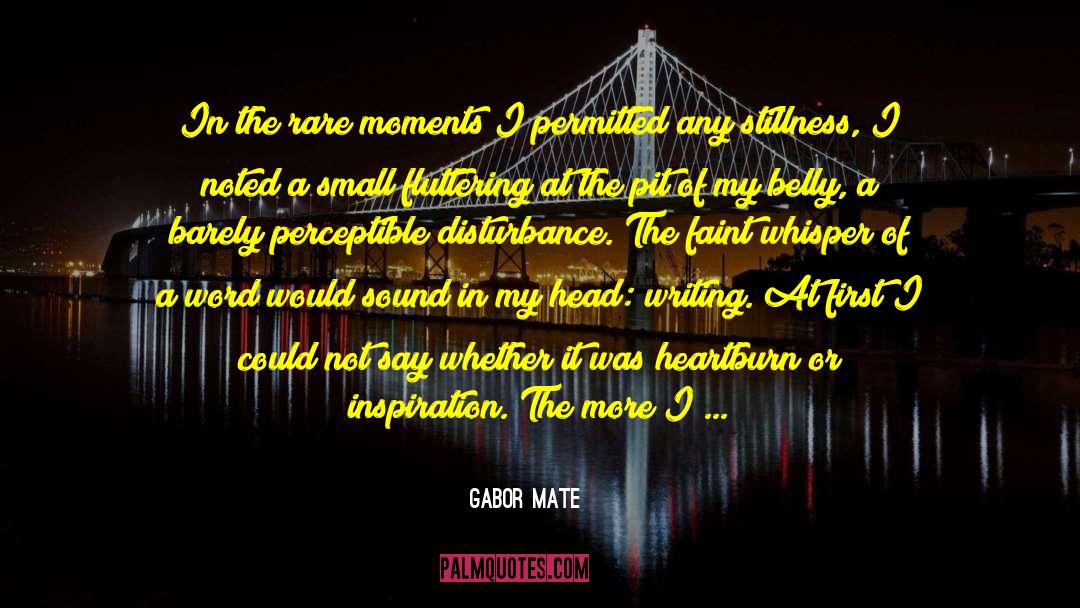Gabor Mate Famous Quotes
Reading Gabor Mate quotes, download and share images of famous quotes by Gabor Mate. Righ click to see or save pictures of Gabor Mate quotes that you can use as your wallpaper for free.
While all of us dread being blamed, we all would wish to be more responsible - that is, to have the ability to respond with awareness to the circumstances of our lives rather than just reacting. We want to be the authoritative person in our own lives: in charge, able to make the authentic decisions that affect us. There is no true responsibility without awareness. One of the weaknesses of the Western medical approach is that we have made the physician the only authority, with the patient too often a mere recipient of the treatment or cure. People are deprived of the opportunity to become truly responsible. None of us are to be blamed if we succumb to illness and death. Any one of us might succumb at any time, but the more we can learn about ourselves, the less prone we are to become passive victims. Mind and body links have to be seen not only for our understanding of illness but also for our understanding of health.
Dr. Robert Maunder, on the psychiatric faculty of the University of Toronto, has written about the mindbody interface in disease. "Trying to identify and to answer the question of stress," he said to me in an interview, "is more likely to lead to health than ignoring the question." In healing, every bit of information, every piece of the truth, may be crucial. If a link exists between emotions and physiology, not to inform people of it will deprive them of a powerful tool. And here we confront the inadequacy of language. Even to speak about links betw
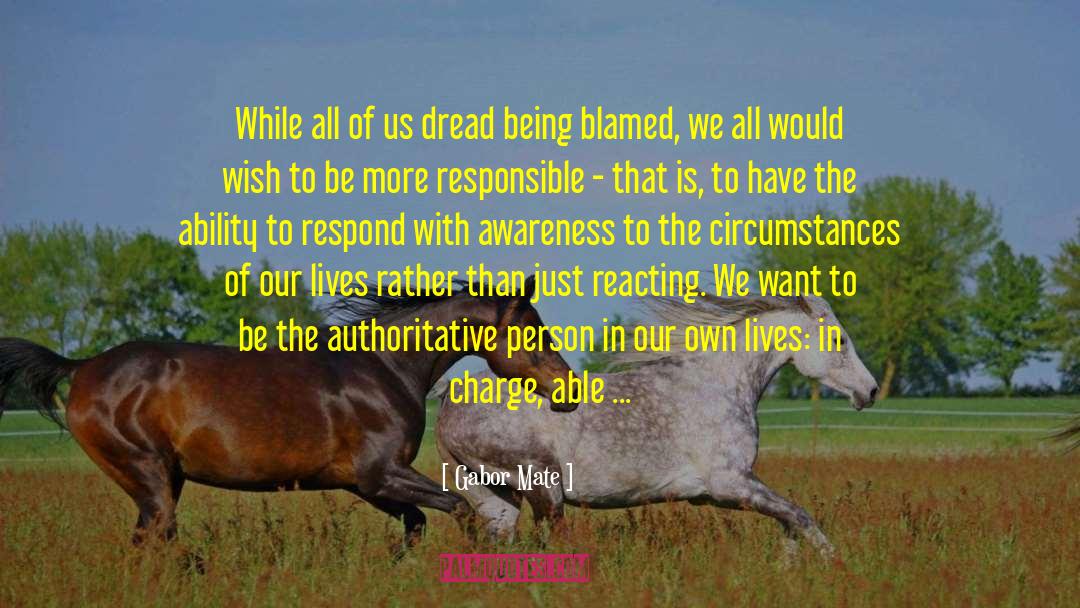
The United States contains less than 5 percent of the world's population but houses nearly a quarter of the world's prisoners.
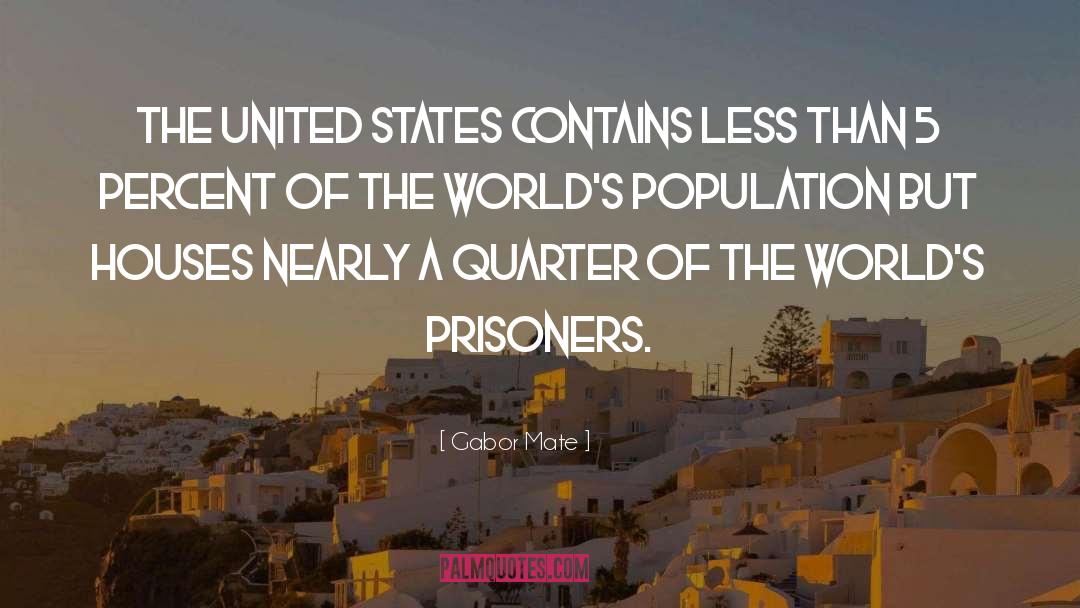
Any passion can become an addiction; but then how to distinguish between the two? The central question is: who's in charge, the individual or their behaviour? It's possible to rule a passion, but an obsessive passion that a person is unable to rule is an addiction. And the addiction is the repeated behaviour that a person keeps engaging in, even though he knows it harms himself or others. How it looks externally is irrelevant. The key issue is a person's internal relationship to the passion and its related behaviours.
If in doubt, ask yourself one simple question: given the harm you're doing to yourself and others, are you willing to stop? If not, you're addicted. And if you're unable to renounce the behaviour or to keep your pledge when you do, you're addicted. There is, of course, a deeper, more ossified layer beneath any kind of addiction: the denial state in which, contrary to all reason and evidence, you refuse to acknowledge that you're hurting yourself or anyone else. In the denial state you're completely resistant to asking yourself any questions at all. But if you want to know, look around you. Are you closer to the people you love after your passion has been fulfilled or more isolated? Have you come more truly into who you really are or are you left
feeling hollow?
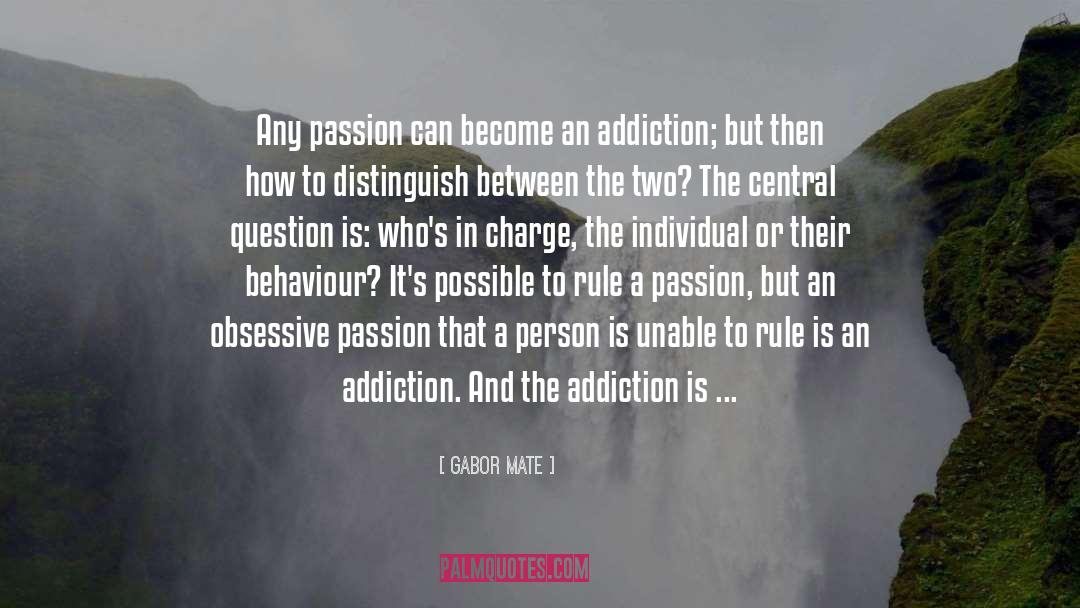
We have noted that gut feelings are an important part of the body's sensory apparatus, helping us to evaluate the environment and assess whether a situation is safe. Gut feelings magnify perceptions that the emotional centres of the brain find important and relay through the hypothalamus. Pain in the gut is one signal the body uses to send messages that are difficult for us to ignore. Thus, pain is also a mode of perception. Physiologically, the pain pathways channel information that we have blocked from reaching us by more direct routes. Pain is a powerful secondary mode of perception to alert us when our primary modes have shut down. It provides us with data that we ignore at our peril.
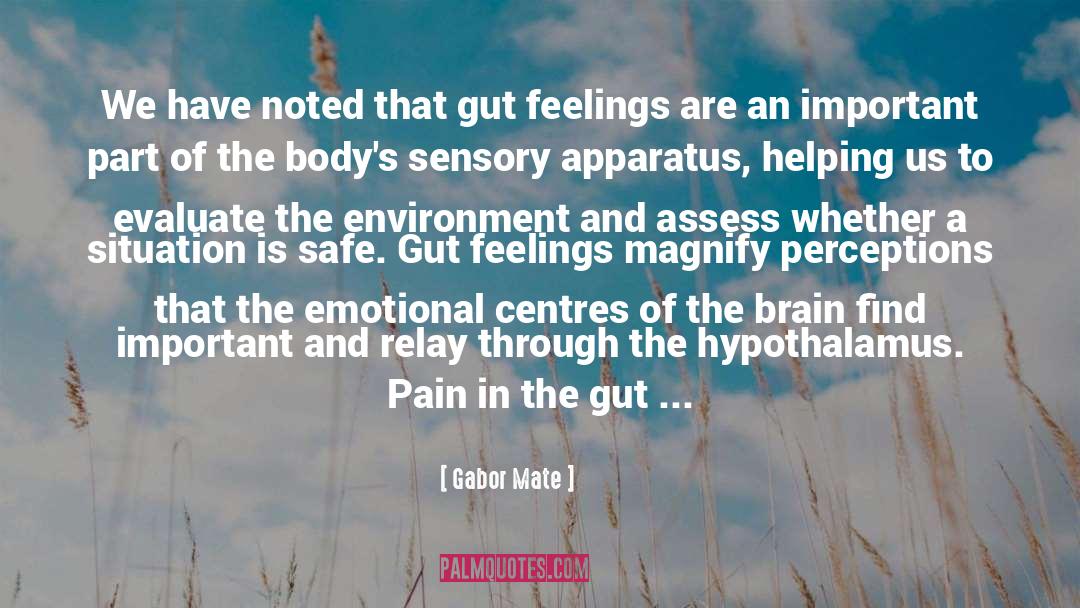
Reactions can be gratifyingly mature at one time but distressingly immature at another. If some deeply unconscious anxiety is triggered, a person may respond with the lack of emotional self-regulation characteristic of an infant. A fully grown adult exhibiting the rage of an infant is terrifying and potentially dangerous.
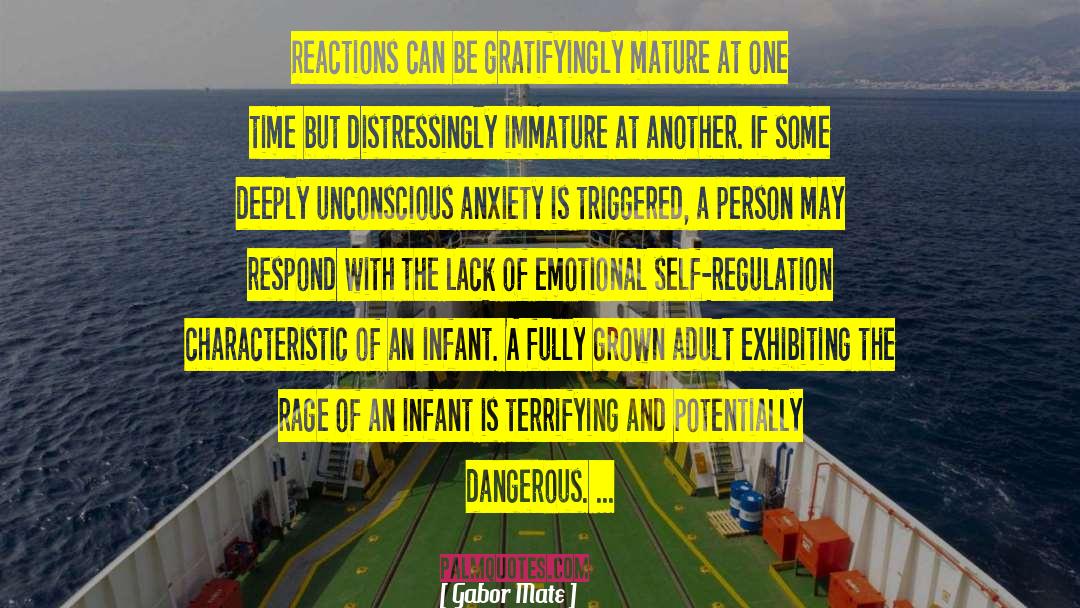
Collect them before you direct them.

The sparser the innate joy that springs from being alive, the more fervently we seek joy's pale substitute, pleasure; the less our inner strength, the greater our craving for power; the feebler our awareness of truth, the more desperate our search for certainty outside of ourselves. The greater the dread, the more vigorous the gravitational pull of the addiction process.
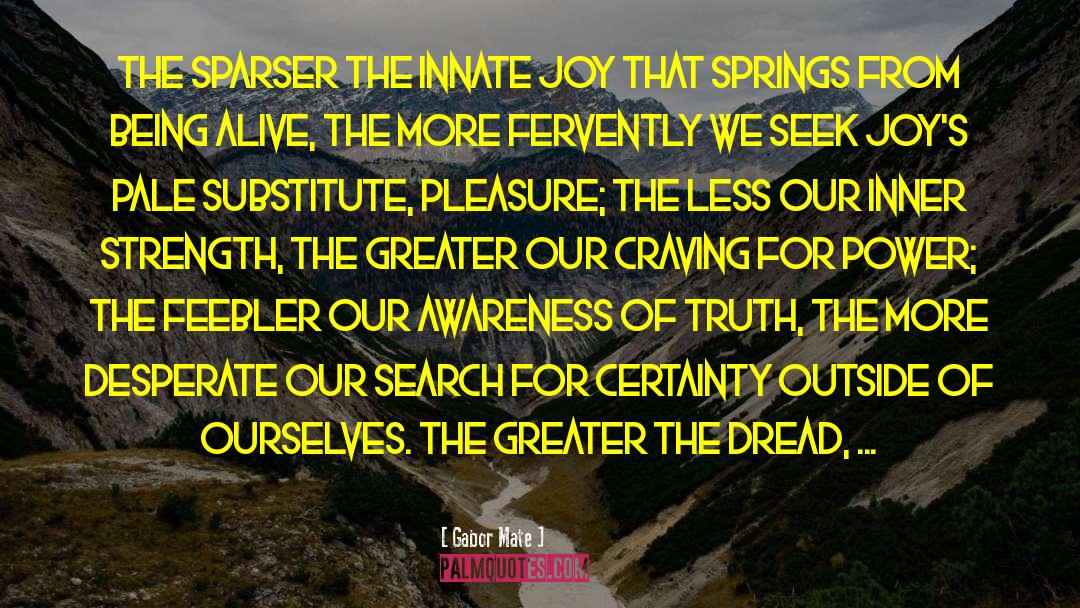
Not why the addiction but why the pain.
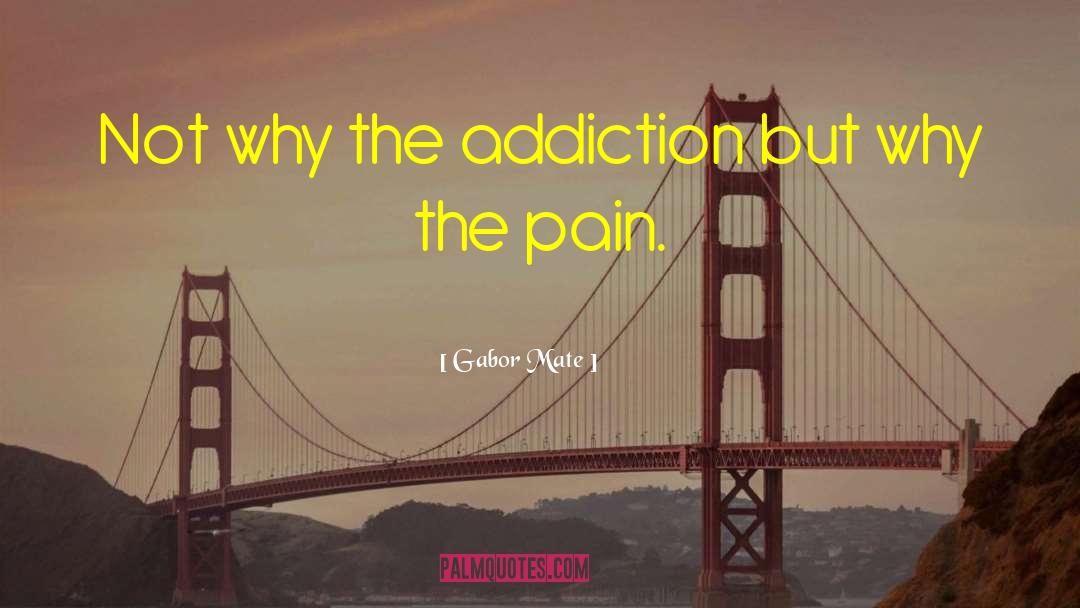
All of the diagnoses that you deal with - depression, anxiety, ADHD, bipolar illness, post traumatic stress disorder, even psychosis, are significantly rooted in trauma. They are manifestations of trauma. Therefore the diagnoses don't explain anything. The problem in the medical world is that we diagnose somebody and we think that is the explanation. He's behaving that way because he is psychotic. She's behaving that way because she has ADHD. Nobody has ADHD, nobody has psychosis - these are processes within the individual. It's not a thing that you have. This is a process that expresses your life experience. It has meaning in every single case.
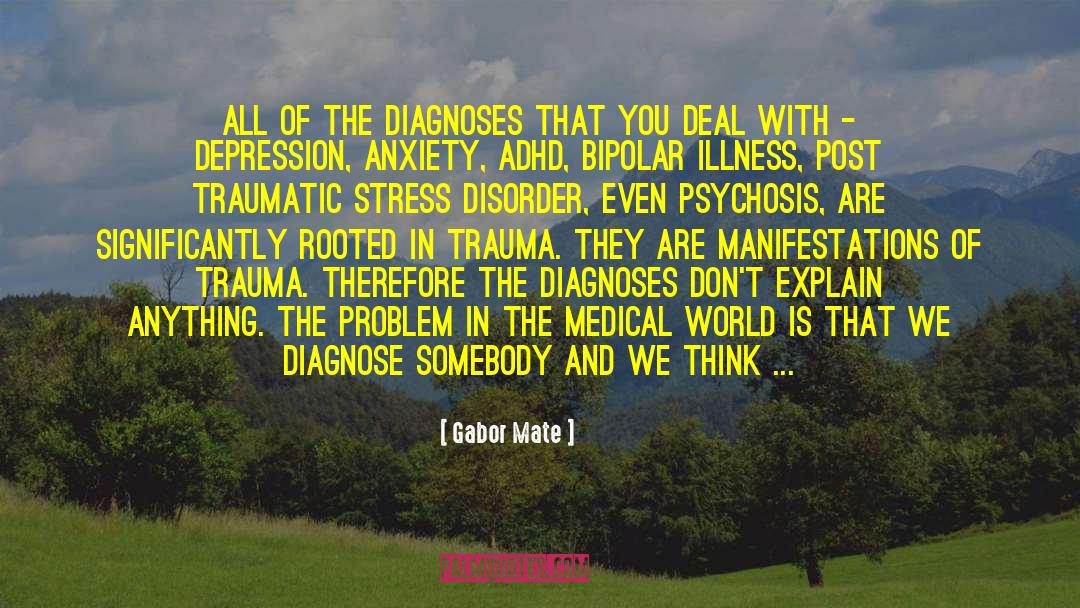
As parents, we may as well accept that we will "lose it" at times. Perfect equanimity is beyond us. Temporary breaks in the relationship with the child are inevitable and are not in themselves harmful, unless they are frequent and catastrophic. The real harm is inflicted when the parent makes the child work at reestablishing contact, as in forcing a child to apologize before granting "forgiveness." There
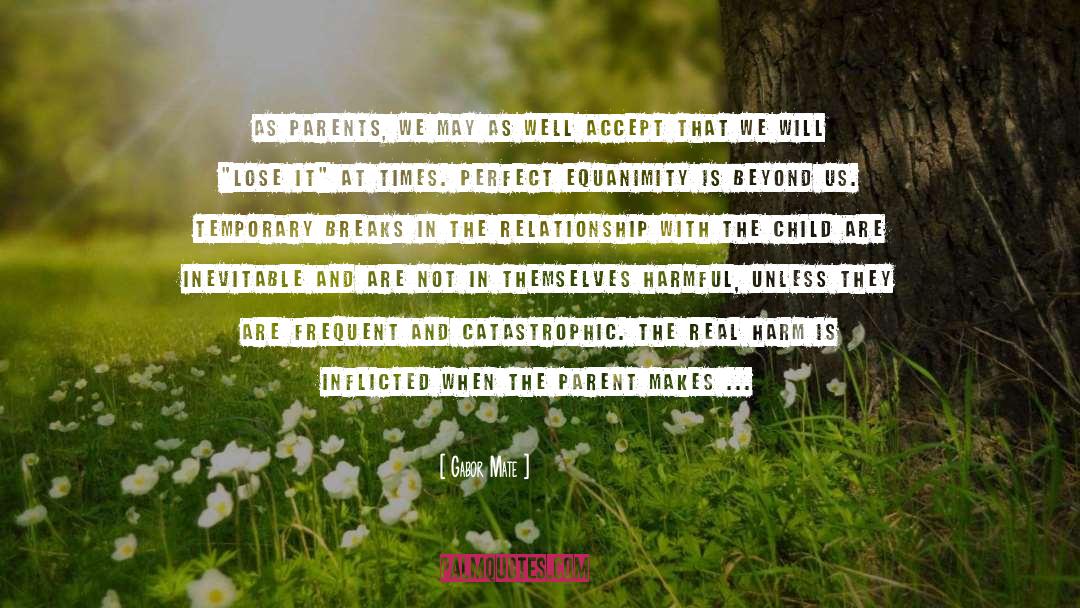
The War on Drugs, from the Hastings-facing window of the Portland
Hotel, is manifested in the pregnant Celia kneeling on the sidewalk,
handcuffed wrists behind her back, eyes cast on the ground. There
was no Detective-Sergeant Gillespie to protect her when, as a little
girl, she was raped by her stepfather and subjected to the nocturnal
spitting ritual, so in the War on Drugs she has become one of the
enemy.

Drugs, in short, do not make anyone into an addict, any more than food makes a person into a compulsive eater. There has to be a preexisting vulnerability. There also has to be significant stress [...] - but, like drugs, external stressors by themselves, no matter how severe, are not enough. [...]
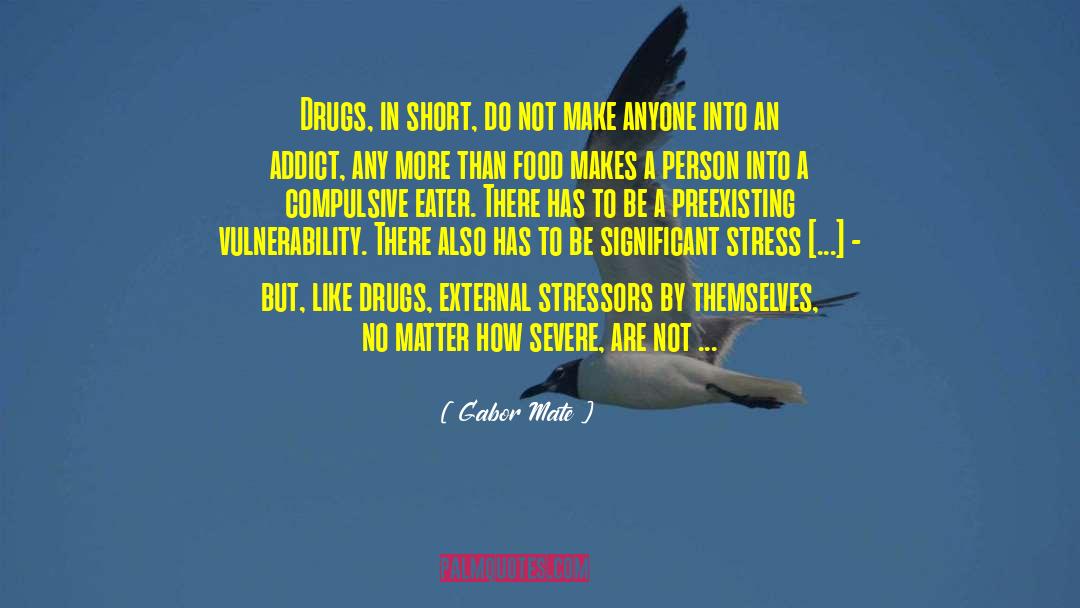
Attachment is our connection with the world. In the earliest attachment relationships, we gain or lose the ability to stay open, self-nurturing and healthy. In those early attachment bonds, we learned to experience anger or to fear it and repress it. There we developed our sense of autonomy or suffered its
atrophy. Connection is also vital to healing. Study after study concludes that people without social contact - the lonely ones - are at greatest risk for illness. People who enjoy genuine emotional support face a better prognosis, no matter what the disease.
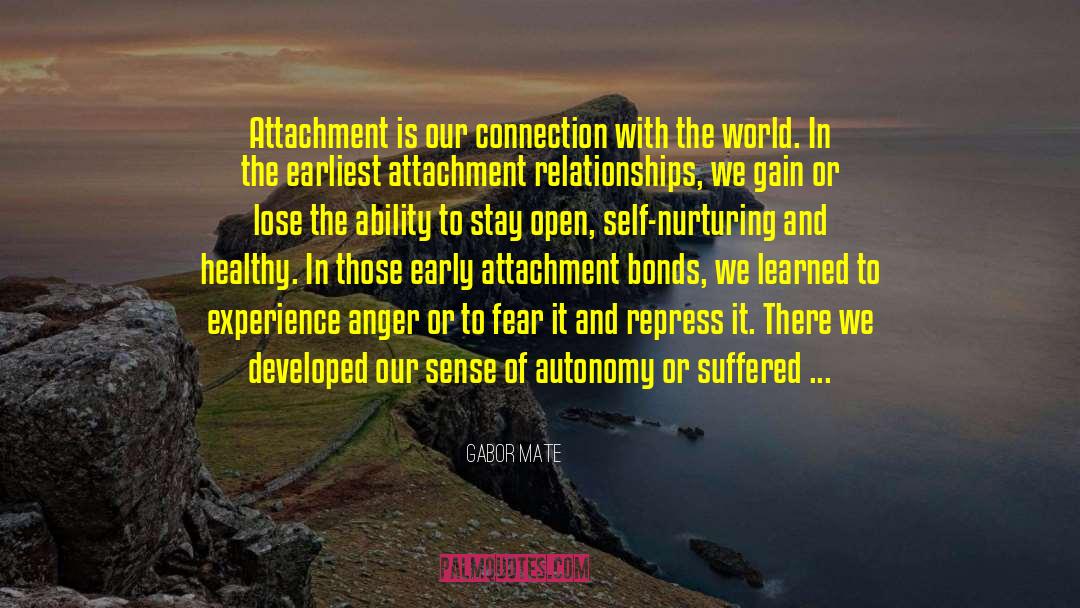
One cannot get much more vulnerable than to expose oneself psychologically. To share oneself with another and then be misunderstood or rejected is, for many, a risk not worth taking. As a result, this is the rarest of intimacies and the reason so many of us are reluctant to share even with loved ones our deepest concerns and insecurities about ourselves. Yet there is no closeness that can surpass the sense of feeling known and still being liked, accepted, welcomed, invited to exist.

The major impairments of ADD - the distractibility, the hyperactivity and the poor impulse control - reflect, each in its particular way, a lack of self-regulation. Self-regulation implies that someone can direct attention where she chooses, can control impulses and can be consciously mindful and in charge of what her body is doing. Like time literacy, self-regulation is also a distinct task of development in human life, achieved gradually from young childhood through adolescence and adulthood. We are born with no capacity whatsoever to self-regulate emotion or action.
For self-regulation to be possible, specific brain centers have to develop and grow connections with other important nerve centers, and chemical pathways need to be established. Attention deficit disorder is a prime illustration of how the adult continues to struggle with the unsolved problems of childhood. She is held back precisely where the child did not develop, hampered in those areas where the infant or toddler got stuck during the course of development.
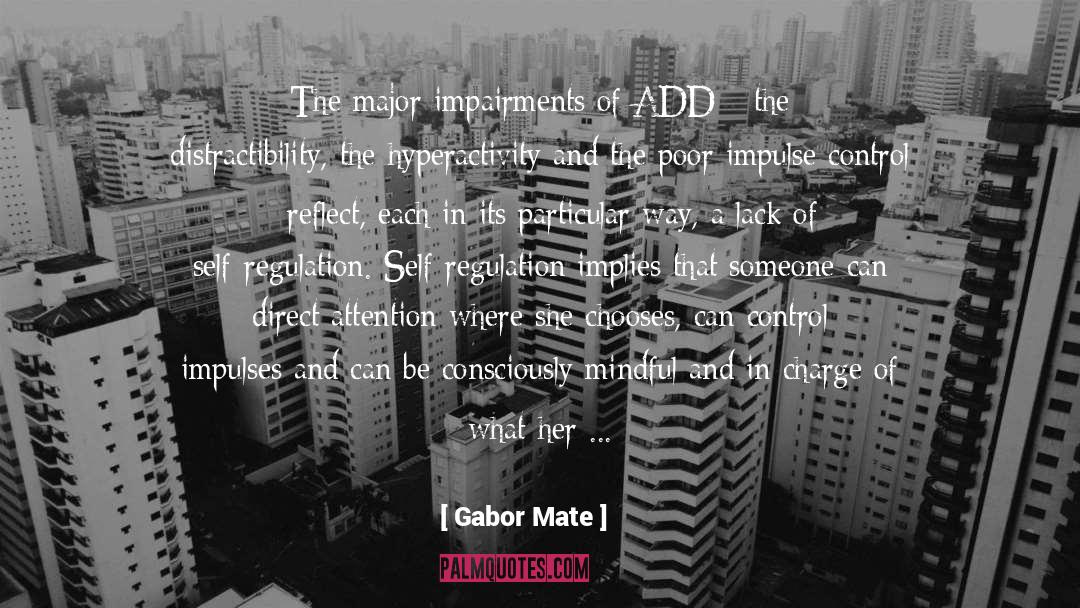
In the cloudy swirl of misleading ideas surrounding public discussion of addiction, there's one that stands out: the misconception that drug taking by itself will lead to addiction - in other words, that the cause of addiction resides in the power of the drug over the human brain. It is one of the bedrock fables sustaining the so-called War on Drugs.
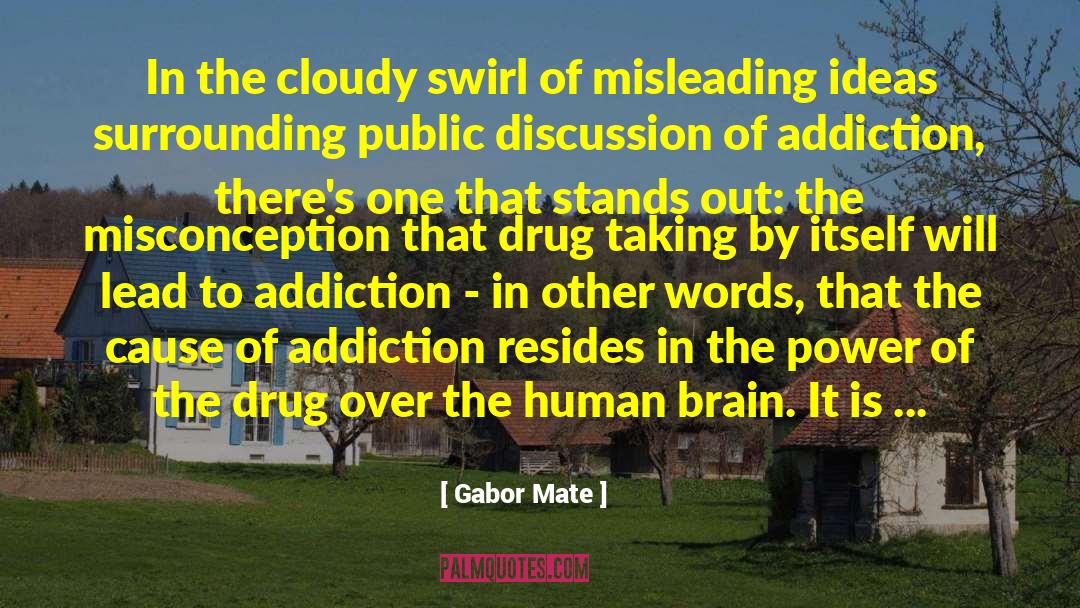
Adults envy the open-hearted and open-minded explorations of children; seeing their joy and curiosity, we pine for our own capacity for wide-eyed wonder.
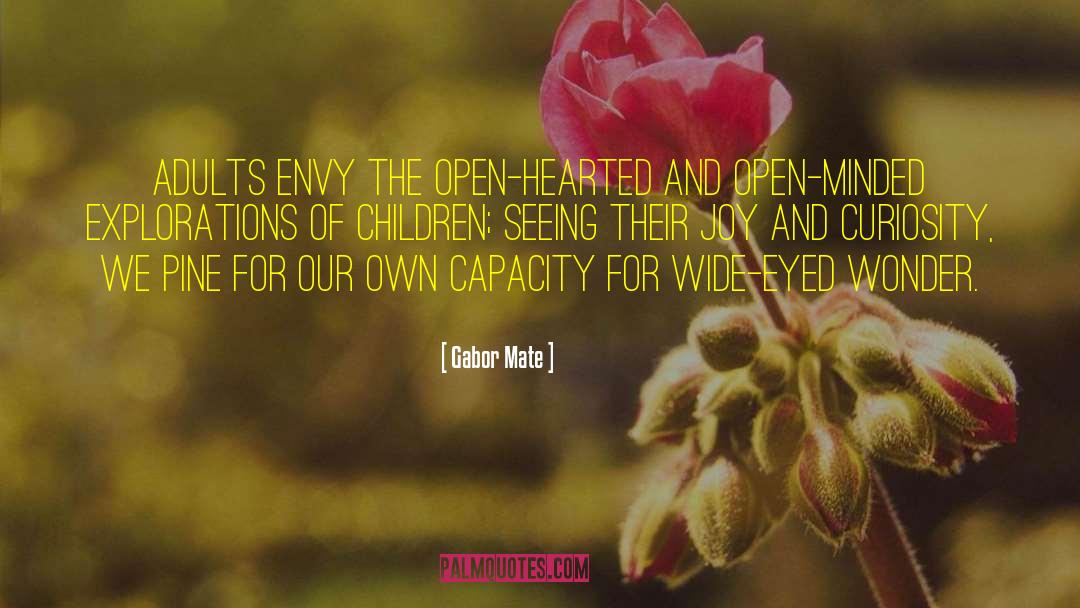
We may not be responsible for the world that created our minds, but we can take responsibility for the mind with which we create our world.
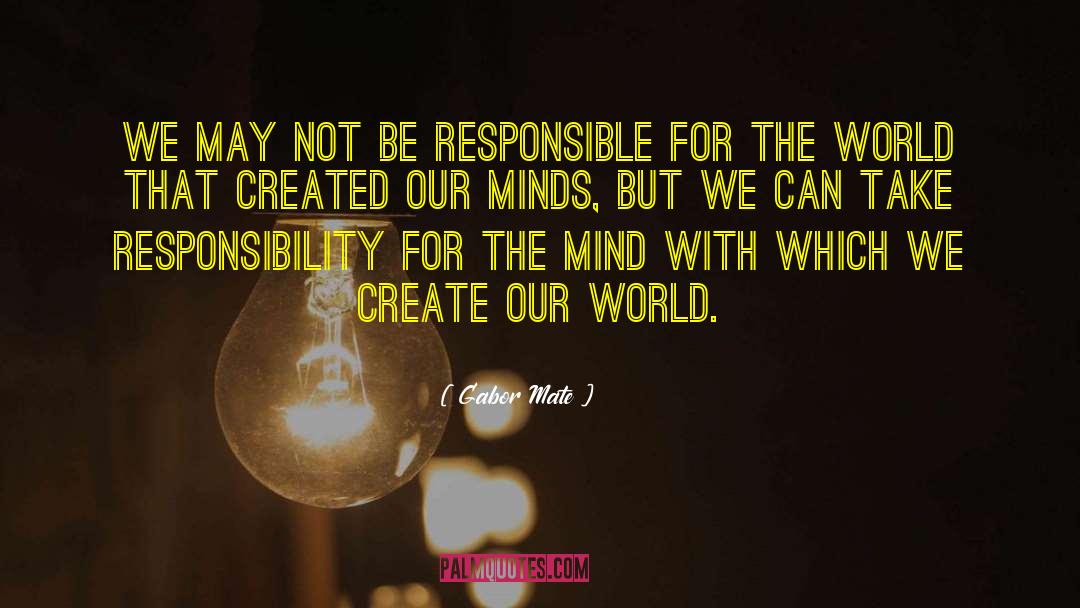
Emotional competence requires the capacity to feel our emotions, so that we are aware when we are experiencing stress; the ability to express our emotions effectively and thereby to assert our needs and to maintain the integrity of our emotional boundaries; the facility to distinguish between psychological reactions that are pertinent to the present situation and those that represent residue from the past.
What we want and demand from the world needs to conform to our present needs, not to unconscious, unsatisfied needs from childhood. If distinctions between past and present blur, we will perceive loss or the threat of loss where none exists; and the awareness of those genuine needs that do require satisfaction, rather than their repression for the sake of gaining the acceptance or approval of others. Stress occurs in the absence of these criteria, and it leads to the disruption of homeostasis. Chronic disruption results in ill health.
In each of the individual histories of illness in this book, one or more aspect of emotional competence was significantly compromised, usually in ways entirely unknown to the person involved. Emotional competence is what we need to develop if we are to protect ourselves from the hidden stresses that create a risk to health, and it is what we need to regain if we are to heal. We need to foster emotional competence in our children, as the best preventive medicine.
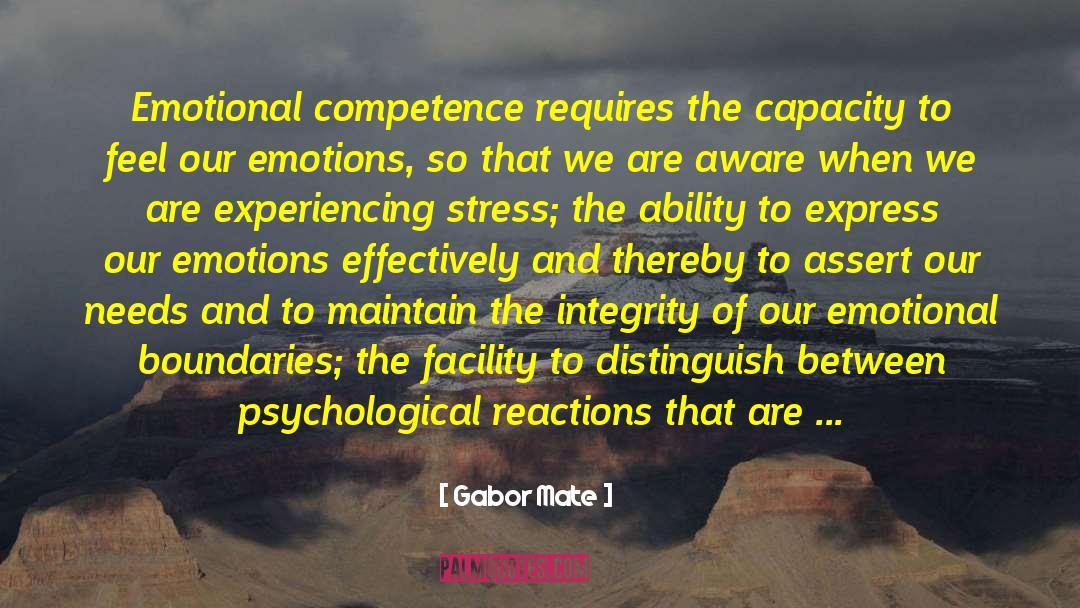
Freedom in society is gauged by our success in getting what we want and conditioned by status and power, by race, class and gender. In the internal world of the psyche, however, freedom means something very different. It is the ability to opt for our long-term physical and spiritual well-being as opposed to our immediate urges. Absent that ability, any talk of 'free will' or 'choice' becomes nearly meaningless.
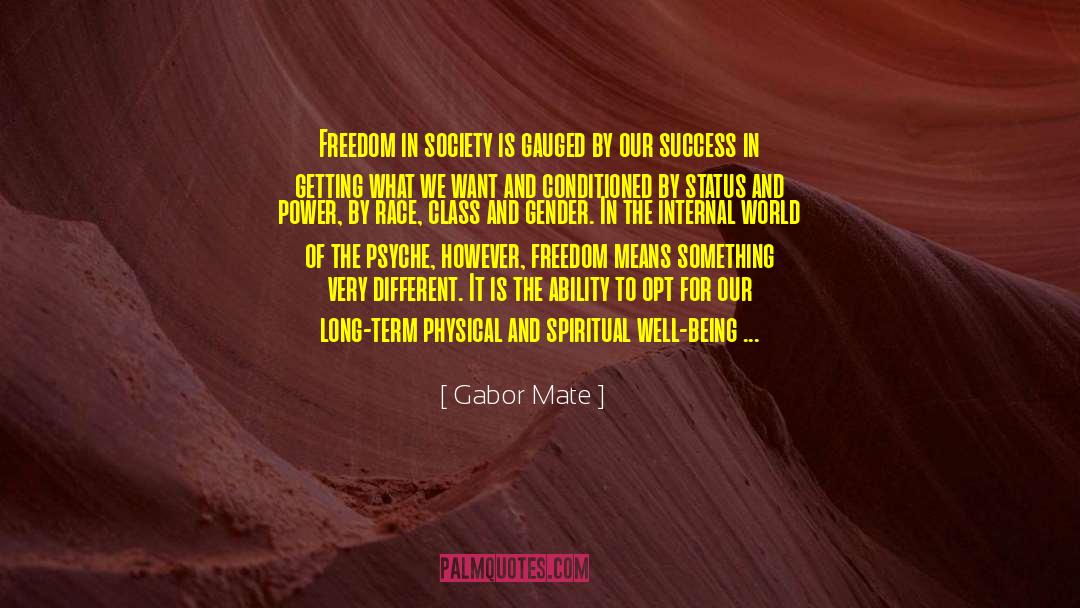
The power to parent will be transferred to whomever the child depends on, whether or not that person is truly dependable, appropriate, responsible, or compassionate - whether or not, in fact, that person is even an adult.
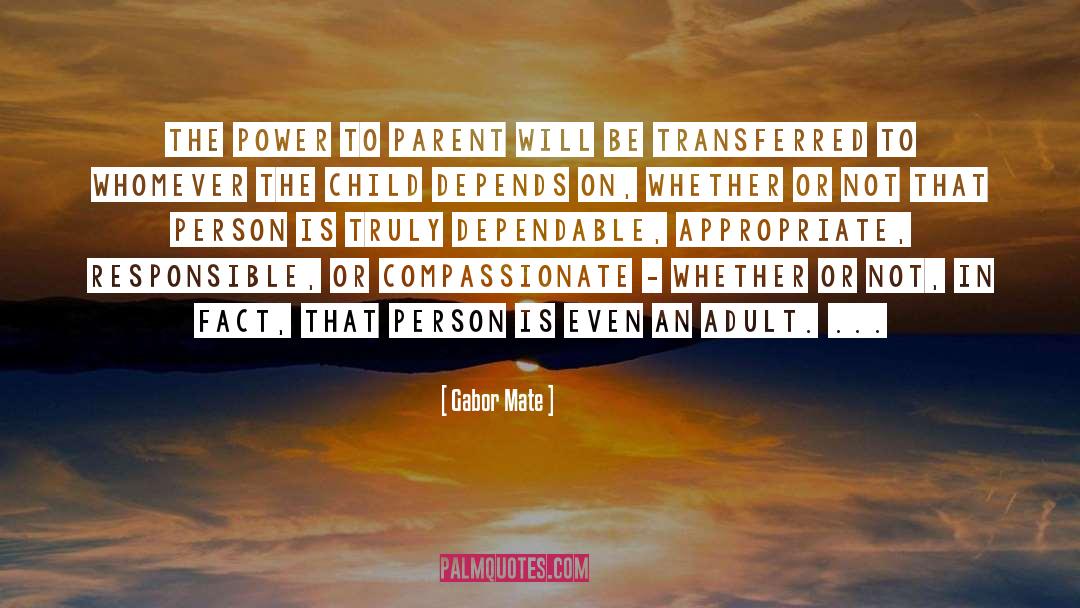
[A] key determining factor triggering the stress response is the way a person perceives a situation. We ourselves give events their meaning, depending on our personal histories, temperament, physical condition and state of mind at the moment we experience them. Thus the degree to which we're stressed may depend less on external circumstances than on how well we are able to take care of ourselves physically and emotionally.
![Gabor Mate Quotes: [A] key determining factor triggering Gabor Mate Quotes: [A] key determining factor triggering](https://palmquotes.com/author/gabor-mate-quotes-680552.jpg)
What we call the personality is often a jumble of genuine traits and adopted coping styles that do not reflect our true self at all but the loss of it.
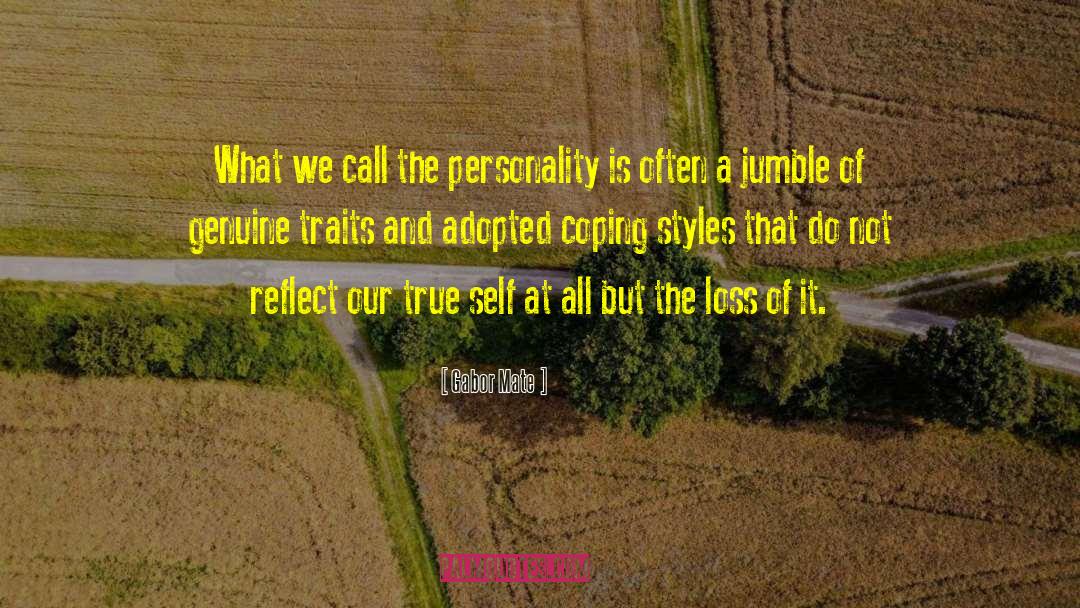
The research literature has identified three factors that universally lead to stress: uncertainty, the lack of information and the loss of control.
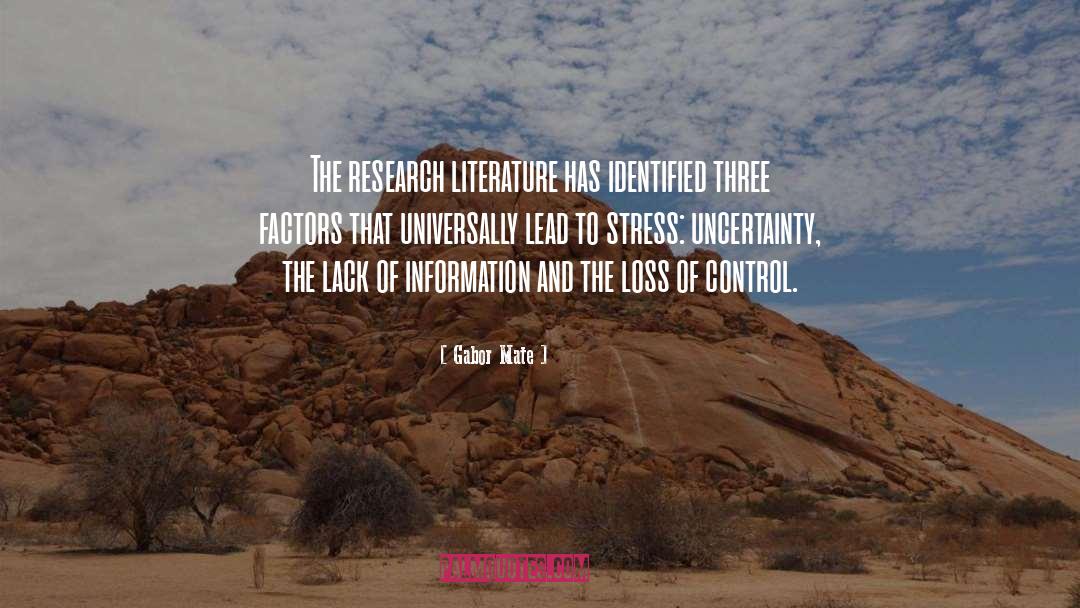
For purposes of child-rearing, the crowning achievement of a working attachment is to instill in a child the desire to be good. When we say of a particular child that he is "good," we think we are describing an innate characteristic of the child. What we don't see is that it's the child's attachment to the adult that fosters that goodness. In this way, we are blind to the power of attachment. The danger in believing that the child's innate personality causes his desire to be good is that we will blame and shame him - we will see him as "bad" - if we find that desire lacking. The impulse to be good arises less from a child's character than from the nature of a child's relationships. If a child is "bad," it's the relationship we need to correct, not the child.
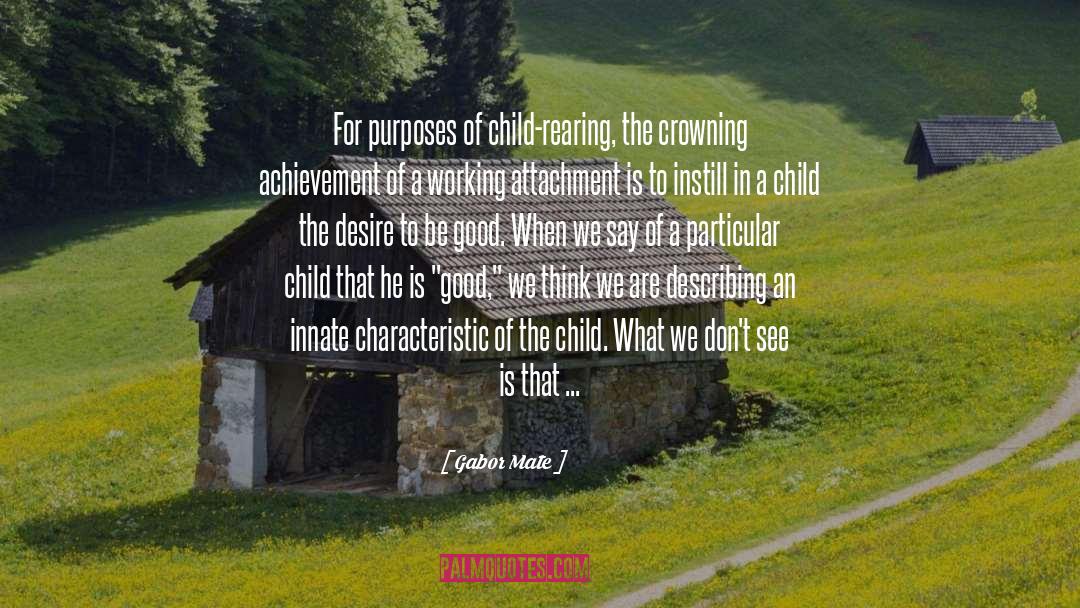
There is a foolproof way to distinguish peer-distorted counterwill from the genuine drive for autonomy: the maturing, individuating child resists coercion whatever the source may be, including pressure from peers. In healthy rebellion, true independence is the goal. One does not seek freedom from one person only to succumb to the influence and will of another. When counterwill is the result of skewed attachments, the liberty that the child strives for is not the liberty to be his true self but the opportunity to conform to his peers. To do so, he will suppress his own feelings and camouflage his own opinions, should they differ from those of his peers.
Are we saying that it may not be natural, for example, that a teenager may want to stay out late with his friends? No, the teen may want to hang out with his pals not because he is driven by peer orientation, but simply because on occasion that's just what he feels like doing. The question is, is he willing to discuss the matter with his parents? Is he respectful of their perspective? Is he able to say no to his friends when he has other responsibilities or family events or when he simply may prefer being on his own? The peer-oriented teenager will brook no obstacle and experiences intense frustration when his need for peer contact is thwarted. He is unable to assert himself in the face of peer expectations and will, proportionately, resent and oppose his parents' desires.
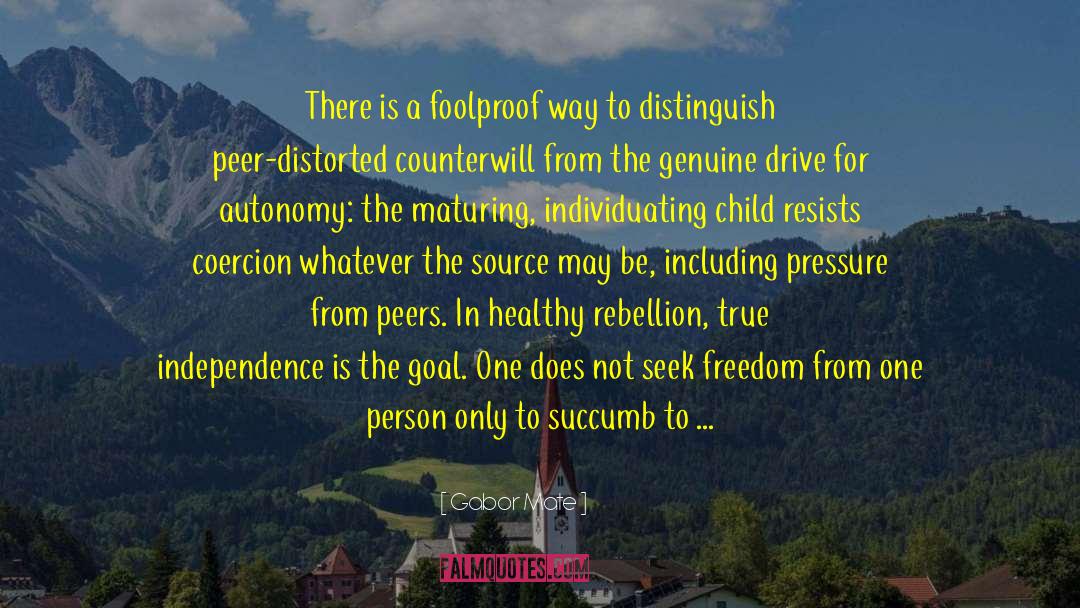
Not only do we avert our eyes from the hardcore drug addict to avoid seeing ourselves; we do so to avoid facing our share of responsibility. As we have seen, injection drug use more often than not arises in people who were abused and neglected as young children. The addict, in other words, is not born but made. His addiction is the result of a situation that he had no influence in creating.
His life expresses the history of the multigenerational family system of which he is a part, and his family exists as part of the broader culture and society. In society, as in Nature, each microcosmic unit reflects something of the whole. In the case of drug addiction, the sins of entire societies are visited unevenly on minority populations.
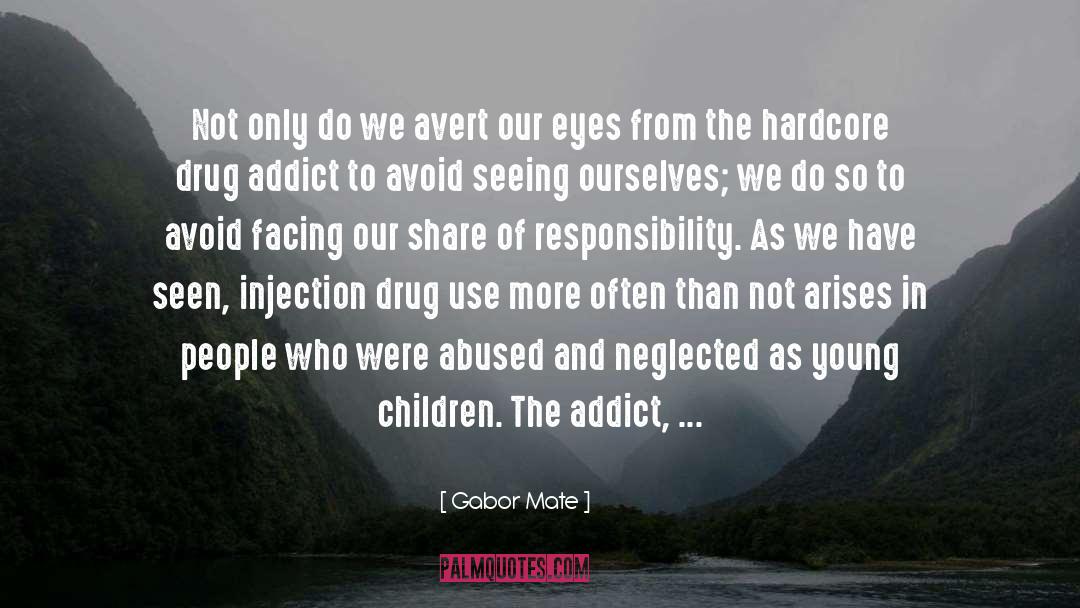
[A]ddiction to opiates like morphine and heroin arises in a brain system that governs the most powerful emotional dynamic in human existence: the attachment instinct. Love.
![Gabor Mate Quotes: [A]ddiction to opiates like morphine Gabor Mate Quotes: [A]ddiction to opiates like morphine](https://palmquotes.com/author/gabor-mate-quotes-453901.jpg)
The very essence of the opiate high was expressed by a twenty-seven-year-old sex-trade worker. She had HIV and has since died. "The first time I did heroin," she said to me, "it felt like a warm, soft hug." In that phrase she told her life story and summed up the psychological and chemical cravings of all substance-dependent addicts.
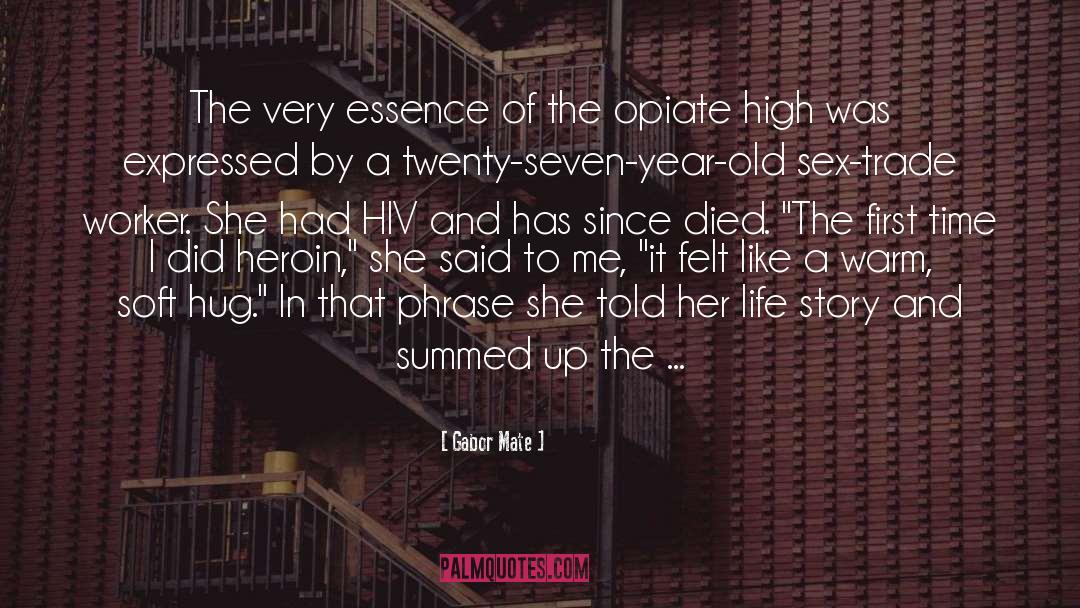
Another powerful dynamic perpetuates addiction despite the abundance of disastrous consequences: the addict sees no other possible existence for himself. His outlook on the future is restricted by his entrenched self-image as addict. No matter how much he may acknowledge the costs of his addiction, he fears a loss of self if it were absent from his life. In his own mind, he would cease to exist as he knows himself.
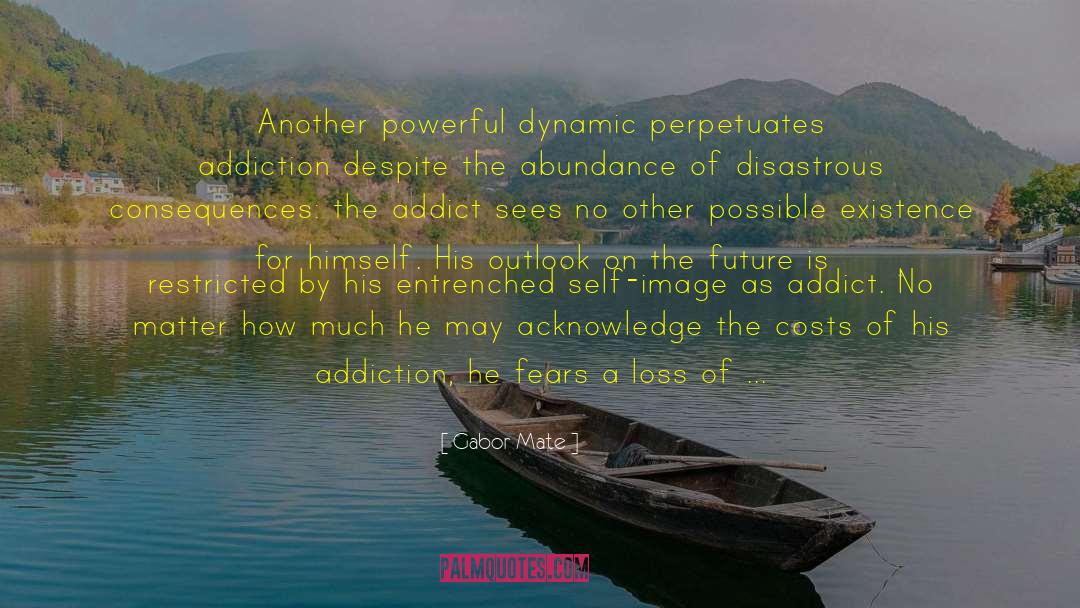
For all their complexities, emotions exist for a very basic purpose: to initiate and maintain activities necessary for survival. In a nutshell, they modulate two drives that are absolutely essential to animal life, including human life: attachment and aversion.
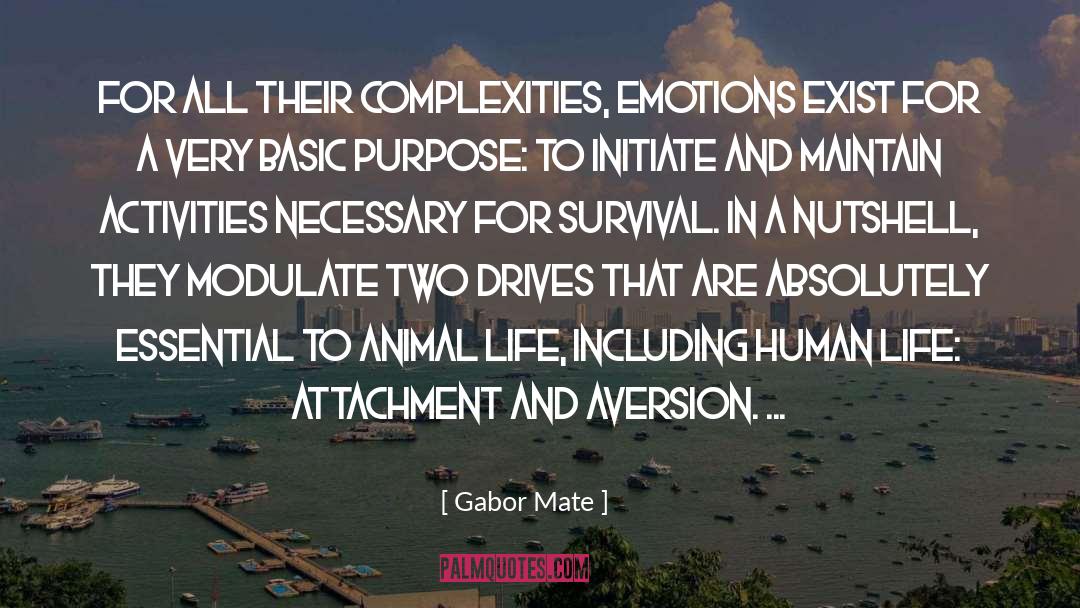
Since having a strong core self relies on acceptance of feelings, being out of touch with the emotional side puts a person out of touch with herself. What then remains to be esteemed? Only a false self, a concoction of what we would like to imagine ourselves to be and what we have divined others want us to be. Sooner or later, people come to realize that this false self - wanting what they think they should want, feeling what they think they should feel - does not work for them. When they look inside themselves, they discover a frightening emptiness, a vacuum, an absence of a true self or of intrinsic motivation.
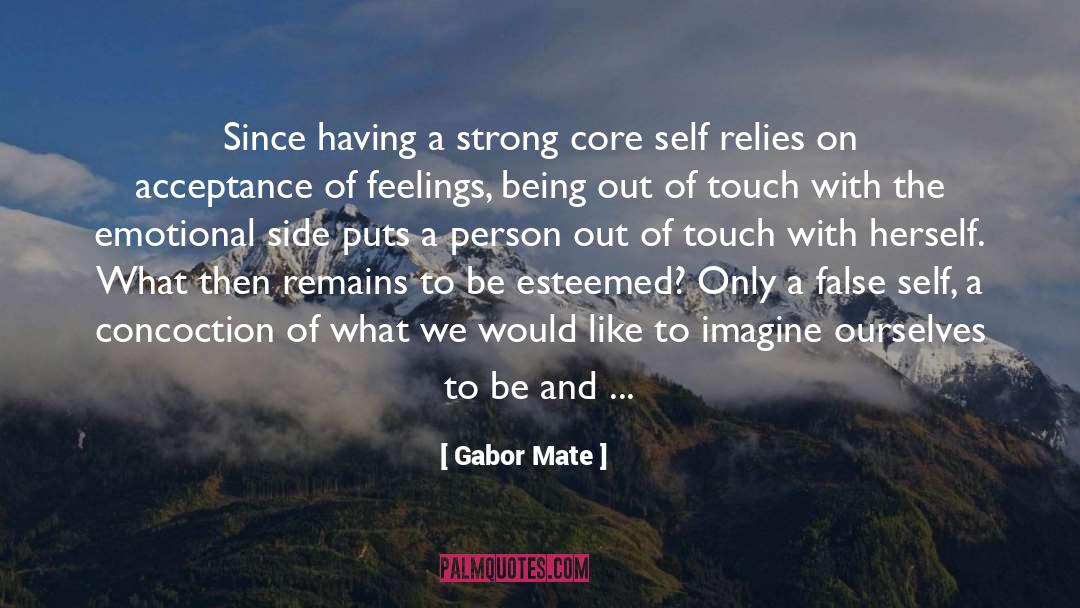
Dr. Jaak Panksepp told me. "If you don't recognize that the brain creates psychological responses, then neuroscience becomes a highly impoverished discipline. And that's where the battle is right now. Many neuroscientists believe that mental states are irrelevant for what the brain does. This is a Galileo-type battle, and it will not be won very easily because you have generations and generations of scholars, even in psychology, who have swallowed hook, line, and sinker the notion - the Skinnerian notion - that mentality is irrelevant in the control of behavior."3 Dr.
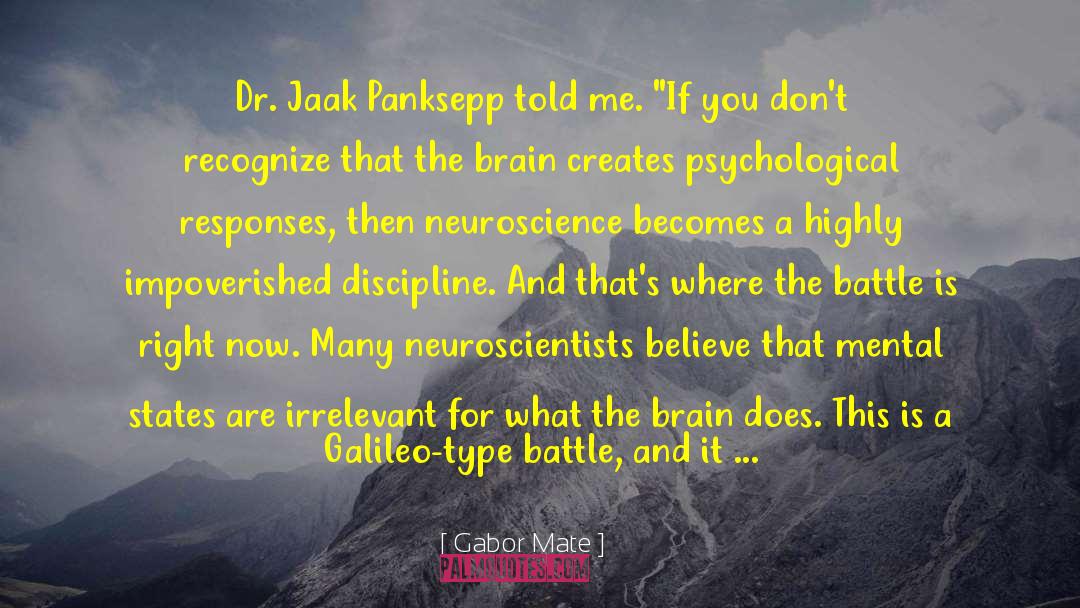
It is impossible to understand addiction without asking what relief the addict finds, or hopes to find, in the drug or the addictive behaviour.
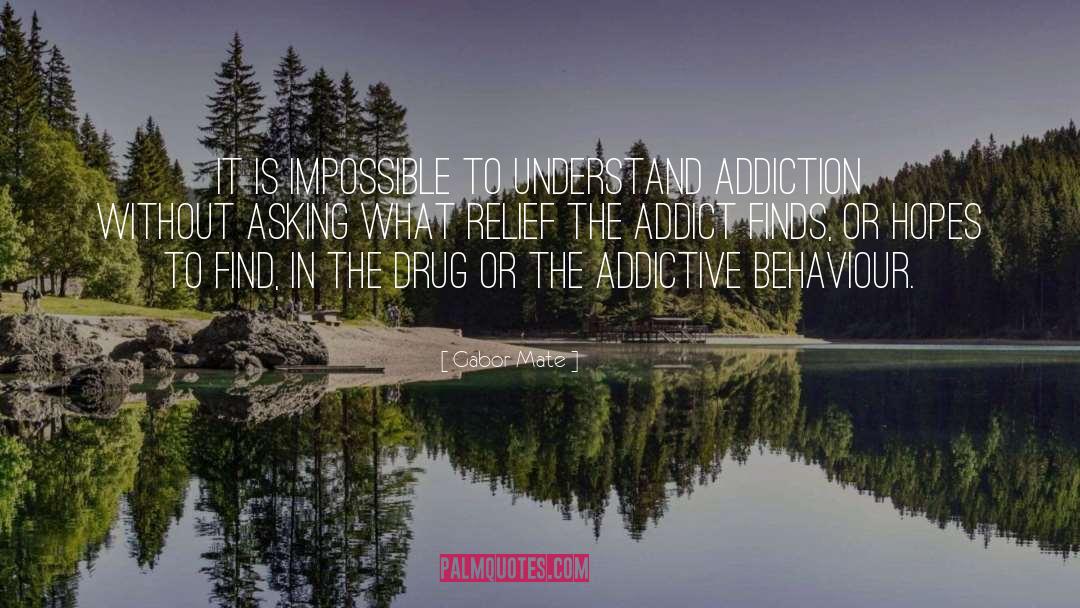
Counterwill is an instinctive, automatic resistance to any sense of being forced. It is triggered whenever a person feels controlled or pressured to do someone else's bidding.

Misplaced attachment to what cannot satiate the soul is not an error exclusive to addicts, but the common condition of mankind

In response to the intensifying cruelty of children to one another, schools all over this continent are rushing to design programs to inculcate social responsibility in youngsters. We are barking up the wrong tree when we try to make children responsible for other children. In my view it is completely unrealistic to believe we can in this way eradicate peer exclusion and rejection and insulting communication. We should, instead, be working to take the sting out of such natural manifestations of immaturity by reestablishing the power of adults to protect children from themselves and from one another.
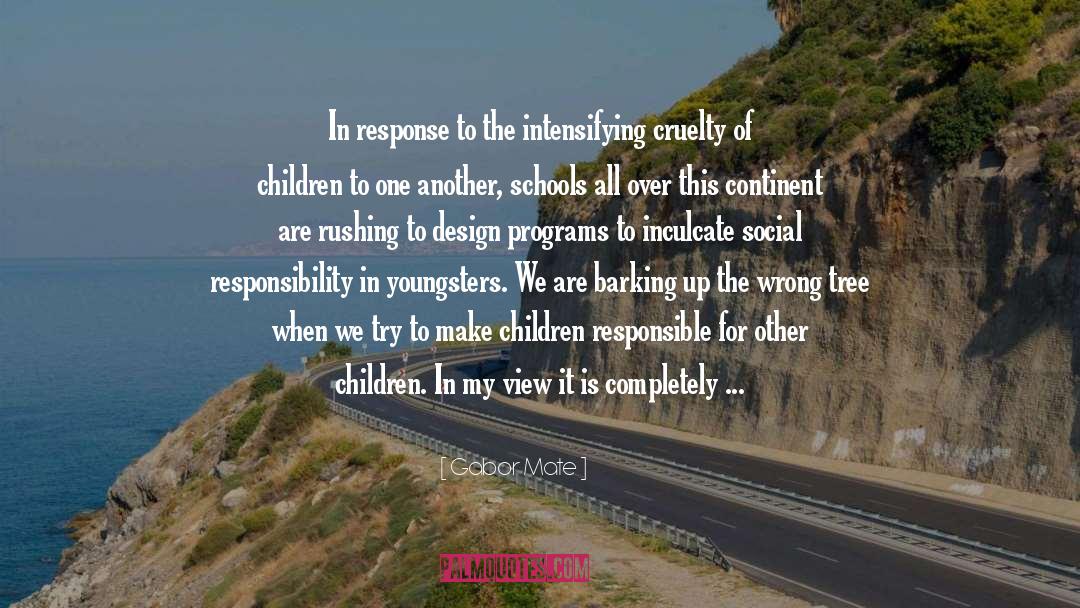
Environmental influences also affect dopamine. From animal studies, we know that social stimulation is necessary for the growth of the nerve endings that release dopamine and for the growth of receptors that dopamine needs to bind to in order to do its work. In four-month-old monkeys, major alterations of dopamine and other neurotransmitter systems were found after only six days of separation from their mothers.
"In these experiments," writes Steven Dubovsky, Professor of Psychiatry and Medicine at the University of Colorado, "loss of an important attachment appears to lead to less of an important neurotransmitter in the brain. Once these circuits stop functioning normally, it becomes more and more difficult to activate the mind."
A neuroscientific study published in 1998 showed that adult rats whose mothers had given them more licking, grooming and other physical-emotional contact during infancy had more efficient brain circuitry for reducing anxiety, as well as more receptors on nerve cells for the brain's own natural tranquilizing chemicals. In other words, early interactions with the mother shaped the adult rat's neurophysiological capacity to respond to stress.
In another study, newborn animals reared in isolation had reduced dopamine activity in their prefrontal cortex - but not in other areas of the brain. That is, emotional stress particularly affects the chemistry of the prefrontal cortex, the center for selective attention, motiv
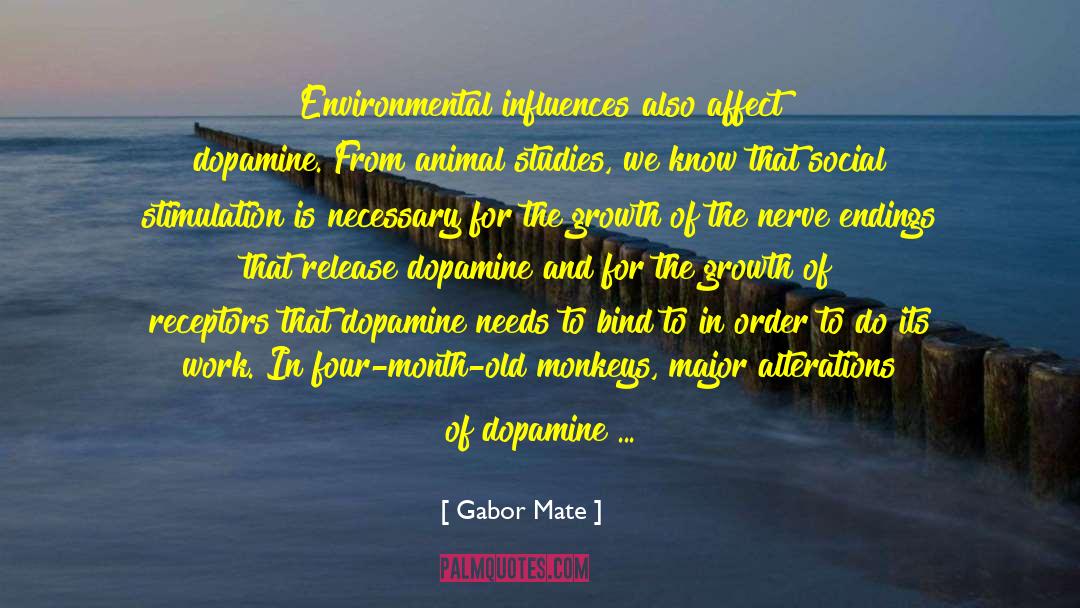
Many adults have not attained maturity - have not mastered being independent, self-motivated individuals capable of tending their own emotional needs and of respecting the needs of others. Among the several reasons why maturity is less and less prevalent today, peer orientation is probably the main culprit. Immaturity and peer orientation go hand in hand. The earlier the onset of peer orientation in a child's life and the more intense the preoccupation with peers, the greater the likelihood of being destined to perpetual childishness.
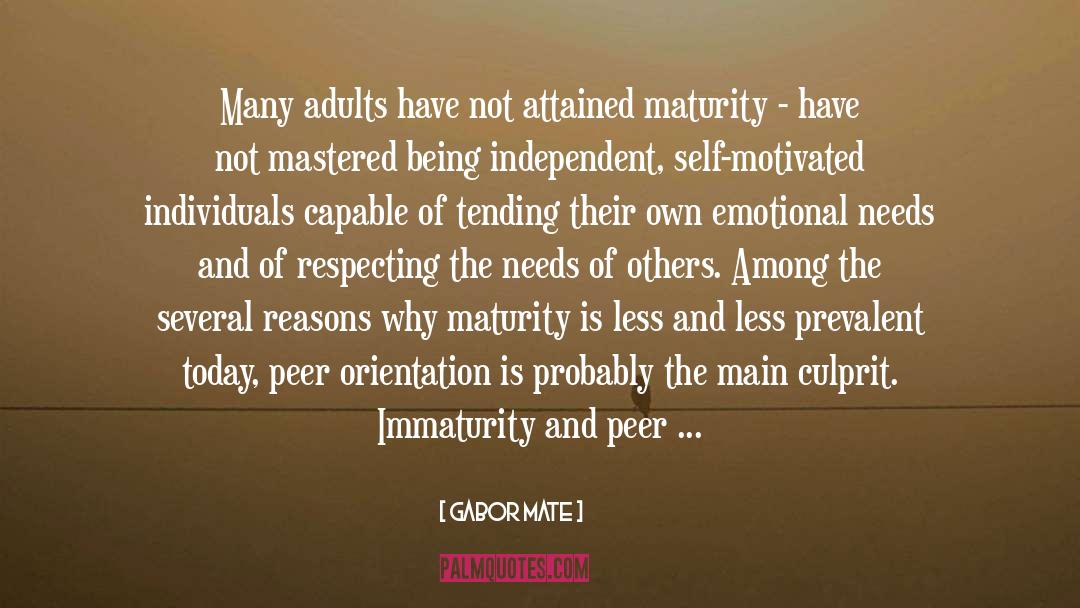
Brain-imaging studies and psychological testing indicate that the same areas are also impaired in drug addiction. And what is the result? If it wasn't enough that powerful incentive and reward mechanisms drive the craving for drugs, on top of that the circuits that could normally inhibit and control those mechanisms are not up to their task. In fact, they are complicit in the addiction process. A double whammy: the watchman is aiding the thieves.
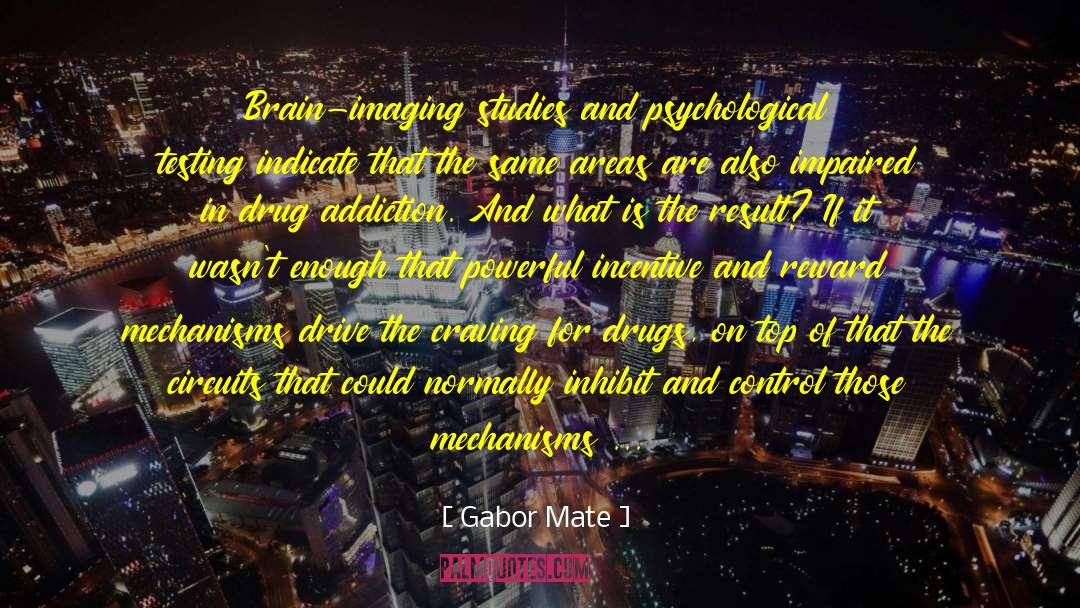
Although parents and teachers are forever telling children to "grow up," maturation cannot be commanded. One cannot teach a child to be an individual or train a child to be his own person. This is the work of maturation and maturation alone. We can nurture the process, provide the right conditions, remove the impediments, but we can no more make a child grow up than we can order the plants in our garden to grow.
Dealing with immature children, we may need to show them how to act, draw the boundaries of what is acceptable, and articulate what our expectations are. Children who do not understand fairness have to be taught to take turns. Children not yet mature enough to appreciate the impact of their actions must be provided with rules and prescriptions for acceptable conduct. But such scripted behavior mustn't be confused with the real thing.
One cannot be any more mature than one truly is, only act that way when appropriately cued. To take turns because it is right to do so is certainly civil, but to take turns out of a genuine sense of fairness can only come from maturity. To say sorry may be appropriate to the situation, but to assume responsibility for one's actions can come only from the process of individuation. There is no substitute for genuine maturation, no shortcut to getting there. Behavior can be prescribed or imposed, but maturity comes from the heart and mind. The real challenge for parents is to help kids grow up, not simply to look like
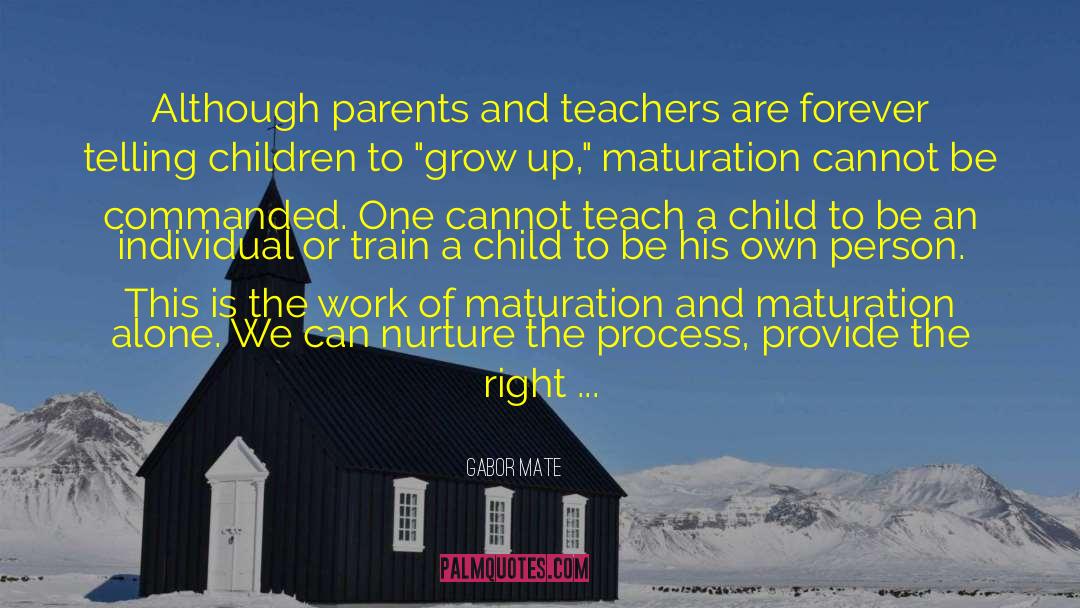
More than anything, we have lost the cultural customs and traditions that bring extended families together, linking adults and children in caring relationships, that give the adult friends of parents a place in their children's lives. It is the role of culture to cultivate connections between the dependent and the dependable and to prevent attachment voids from occurring. Among the many reasons that culture is failing us, two bear mentioning. The first is the jarringly rapid rate of change in twentieth-century industrial societies. It requires time to develop customs and traditions that serve attachment needs, hundreds of years to create a working culture that serves a particular social and geographical environment. Our society has been changing much too rapidly for culture to evolve accordingly.
There is now more change in a decade than previously in a century. When circumstances change more quickly than our culture can adapt to, customs and traditions disintegrate. It is not surprising that today's culture is failing its traditional function of supporting adult-child attachments. Part of the rapid change has been the electronic transmission of culture, allowing commercially blended and packaged culture to be broadcast into our homes and into the very minds of our children. Instant culture has replaced what used to be passed down through custom and tradition and from one generation to another.
"Almost every day I find myself fighting the bubble-gum cul
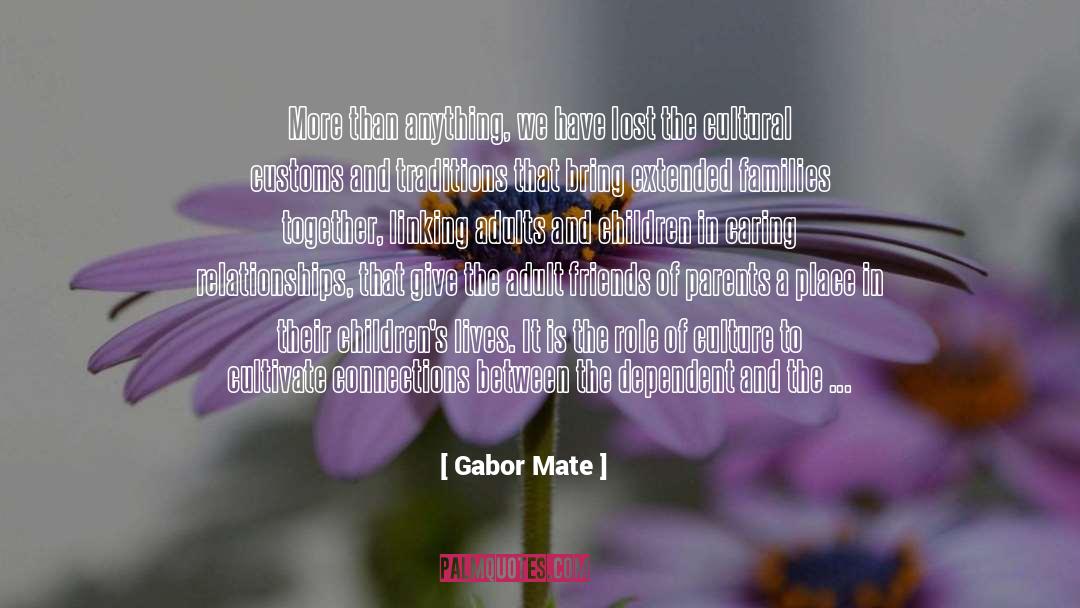
Some parents resist the idea of ADD for fear of seeing their children labeled and categorized. They do not like the idea of pinning a medical diagnosis on a child who, except in certain areas of functioning, seems quite well. Such fears are not baseless. Too often ADD seems no more than a judgment that characterizes a child as a problem student, incapable of normal activity. How people use language is quite revealing. People commonly say that this adult or that child "is ADD." That, indeed, is labeling, identifying the whole person with an area of weakness or impairment. No one is ADD, and no one should be defined or categorized in terms of it or any other particular problem.
Recognizing a child's ADD should be simply a way of understanding that helping him calls for some knowledgeable and creative approaches, not a judgment that there is anything fundamentally or irretrievably wrong with him. This recognition should enable us to support the child in fullfilling his potential, not to further limit him.
That even open-minded people may have difficulty coming to terms with this diagnosis is only to be expected. Our usual mode of thinking about illness (or anything else, for that matter) is not comfortable with ambiguity. A patient either has pneumonia or does not; she either has some illness affecting the mind or does not. There is a popular discomfort with any condition of the mind perceived as "abnormal."
But what if illness is not a separate
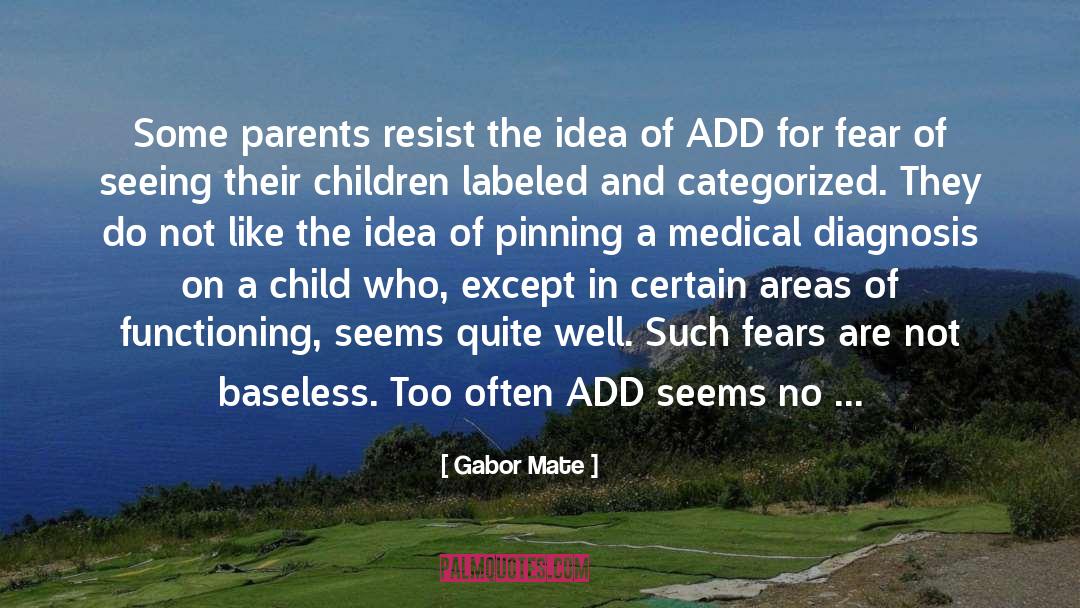
When I'm reasonably balanced in my personal and spiritual life, I don't have difficulty finding compassion for my addicted patients.
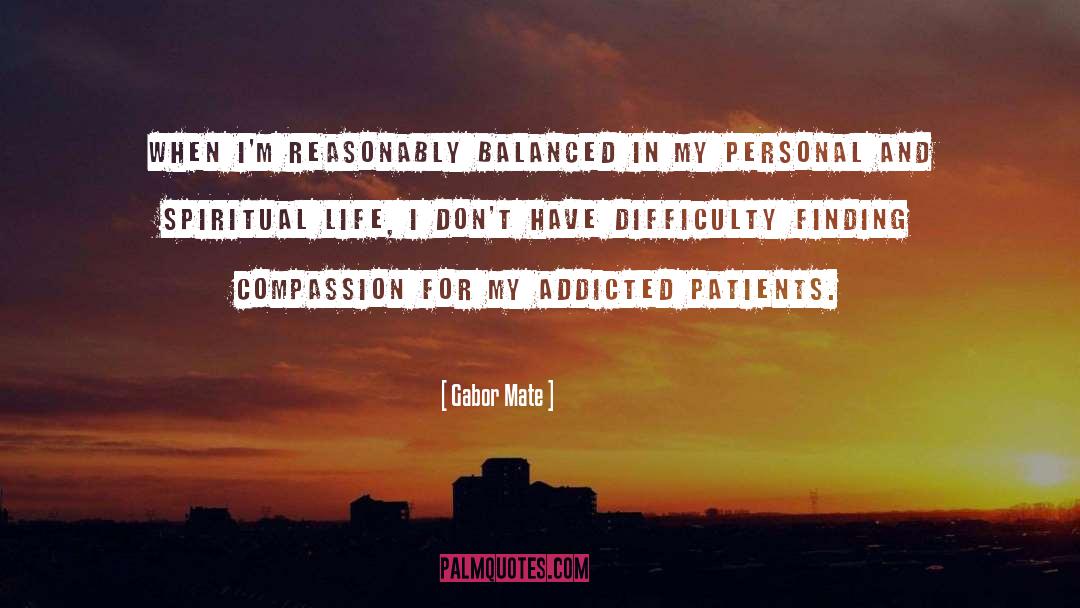
Do I live my life according to my own deepest truths, or in order to fulfill someone else's expectations? How much of what I have believed and done is actually my own and how much has been in service to a self-image I originally created in the belief it was necessary to please my parents?
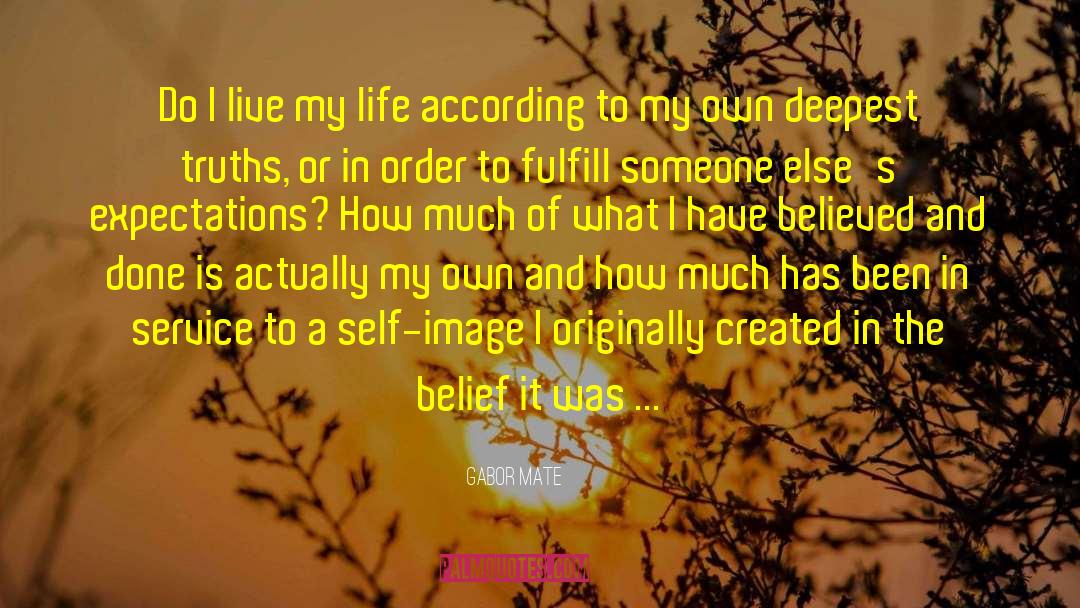
Basically, attention follows attachment. The stronger the attachment, the easier it is to secure the child's attention. When attachment is weak, the attention of the child will be correspondingly difficult to engage. One of the telltale signs of a child who isn't paying attention is a parent having continually to raise his voice or repeat things. Some of our most persistent demands as parents have to do with their attention: "Listen to me," "Look at me when I'm talking," "Now look here," "What did I just say?" or most simply, "Pay attention."
When children become peer-oriented, their attention instinctively turns toward peers. It goes against the natural instincts of a peer-oriented child to attend to parents or teachers. The sounds emanating from adults are regarded by the child's attention mechanisms as so much noise and interference, lacking in meaning and relevance to the attachment needs that dominate his emotional life. Peer orientation creates deficits in the child's attention to adults because adults are not top priority in the attention hierarchy of peer-oriented children.
It is no accident that attention deficit disorder was initially considered a school problem, a child's failing to pay attention to the teacher. It is also no accident that the explosion in the number of diagnosed cases of attention deficit disorder has paralleled the evolution of peer orientation in our society and is worse where peer orientation is most predominant - urba
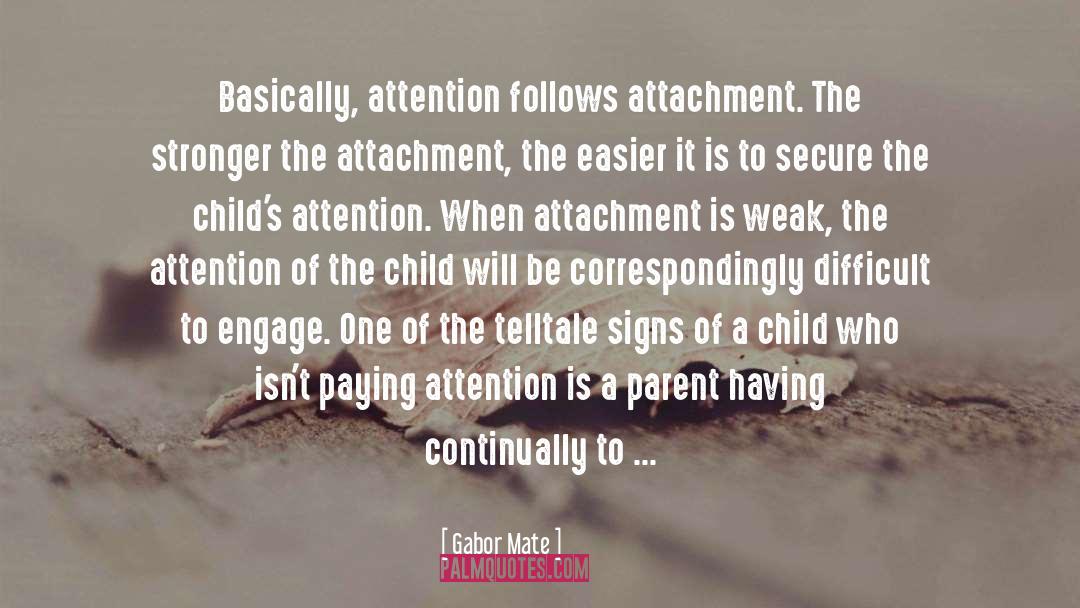
Environmental cues associated with drug use - paraphernalia, people, places, and situations - are all powerful triggers for repeated use and for relapse, because they themselves trigger dopamine release. People trying to quit smoking, for example, are advised to avoid poker if they are used to having a cigarette while playing cards. Unless they move to a different area of town or to a recovery home, my Downtown Eastside patients find it virtually impossible to stop drug use, even when they form a strong intention to do so. Not only are drugs readily available, but everything and everyone in the environment reminds them of their habit.
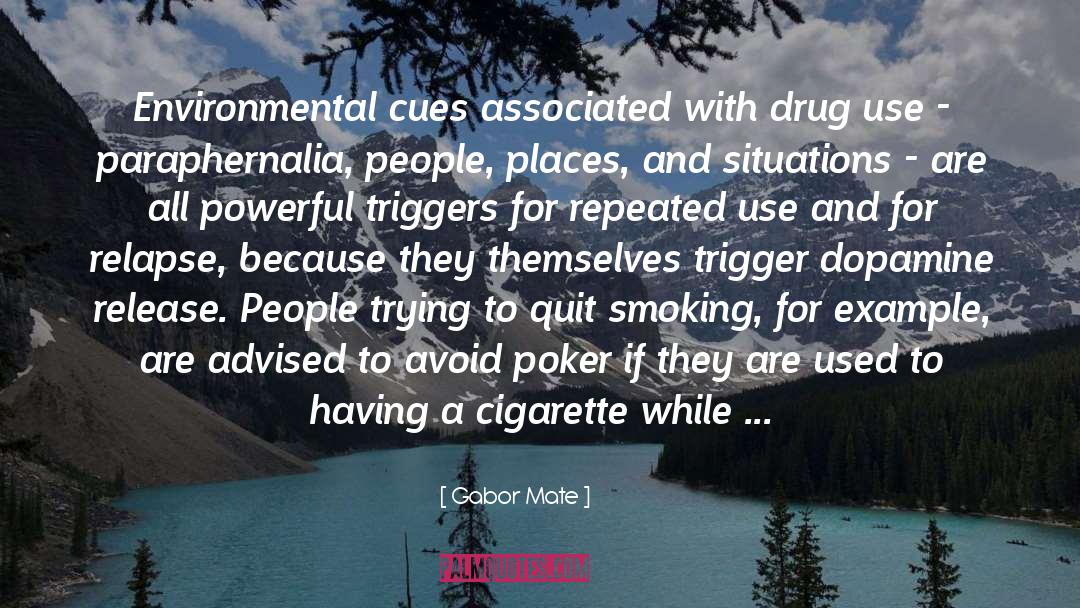
She had an awfully huge void to fill in your life all of a sudden, right from the beginning of her life.
The nature of stress is not always the usual stuff that people think of. It's not the external stress of war or money loss or somebody dying, it is actually the internal stress of having to adjust oneself to somebody else. Cancer and ALS and MS and rheumatoid arthritis and all these other conditions, it seems to me, happen to people who have a poor sense of themselves as independent persons. On the emotional level, that is- they can be highly accomplished in the arts or intellectually- but on an emotional level they have a poorly differentiated sense of self. They live in reaction to others without ever really sensing who they themselves are.
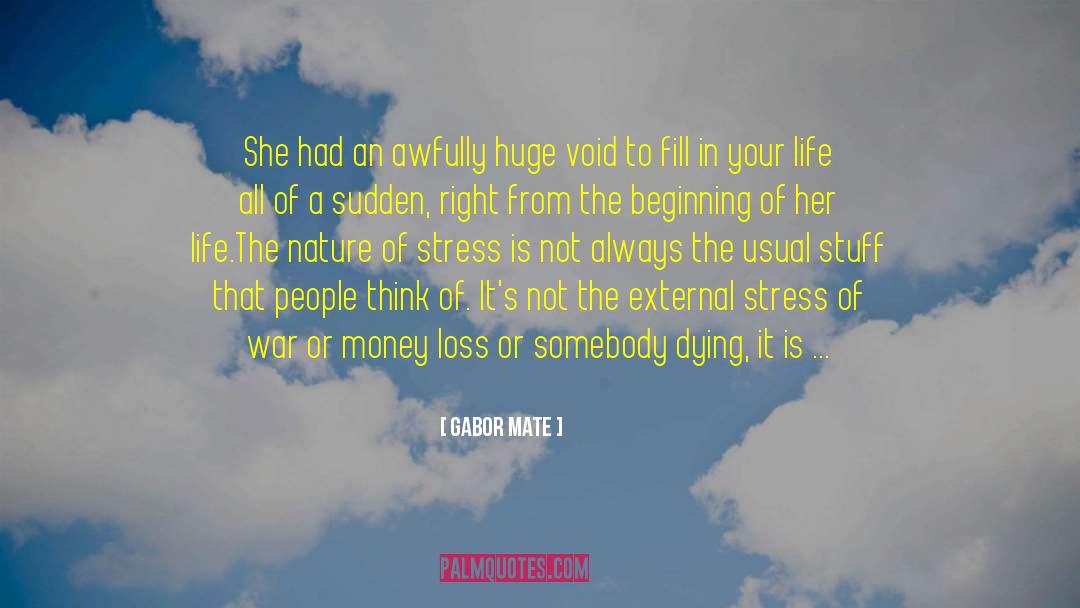
It's a subtle thing, freedom. It takes effort; it takes attention and focus to not act something like an automaton. Although we do have freedom, we exercise it only when we strive for awareness, when we are conscious not just of the content of the mind but also of the mind itself as a process.'
We may say, then, that in the world of the psyche, freedom is a relative concept: the power to choose exists only when our automatic mechanisms are subject to those brain systems that are able to maintain conscious awareness. A person experiences greater or less freedom from one situation to the next, from one interaction to the next, from one moment to the next. Anyone whose automatic brain mechanisms habitually run in overdrive has diminished capacity for free decision making, especially if the parts of the brain that facilitate conscious choice are impaired or underdeveloped.
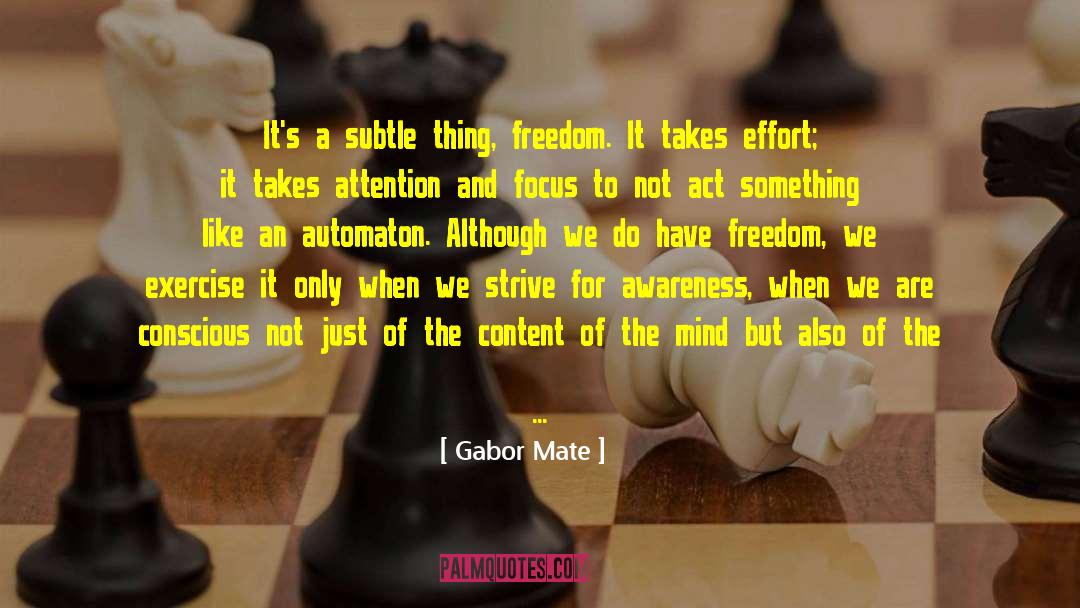
There is nothing more intrinsically criminal in the average drug user than in the average cigarette smoker or alcohol addict. The drugs they inject or inhale do not themselves induce criminal activity by their pharmacological effect, except perhaps in the way that alcohol can also fuel a person's pent-up aggression and remove the mental inhibitions that thwart violence. Stimulant drugs may have that effect on some users, but narcotics like heroin do not; on the contrary, they tend to calm people down. It is withdrawal from opiates that makes people physically ill, irritable and more likely to act violently - mostly out of desperation to replenish their supply.
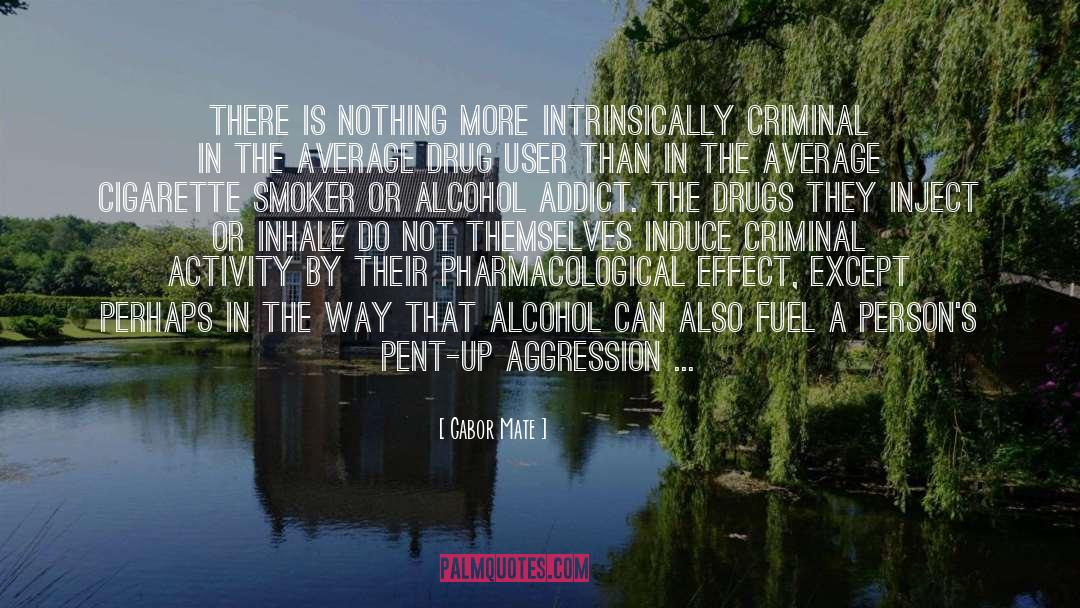
No organism in nature is separate from the system in which it lives, functions and dies, and no natural process can be understood in isolation from its physical and biological context. From an ecological perspective, the addiction process doesn't happen accidentally, nor is it pre-programmed by heredity. It is a product of development in a certain context, and it continues to be maintained by factors in the environment. The ecological view sees addiction as a changeable and evolving dynamic that expresses a lifelong interaction with a person's social and emotional surroundings and with his own internal psychological space.
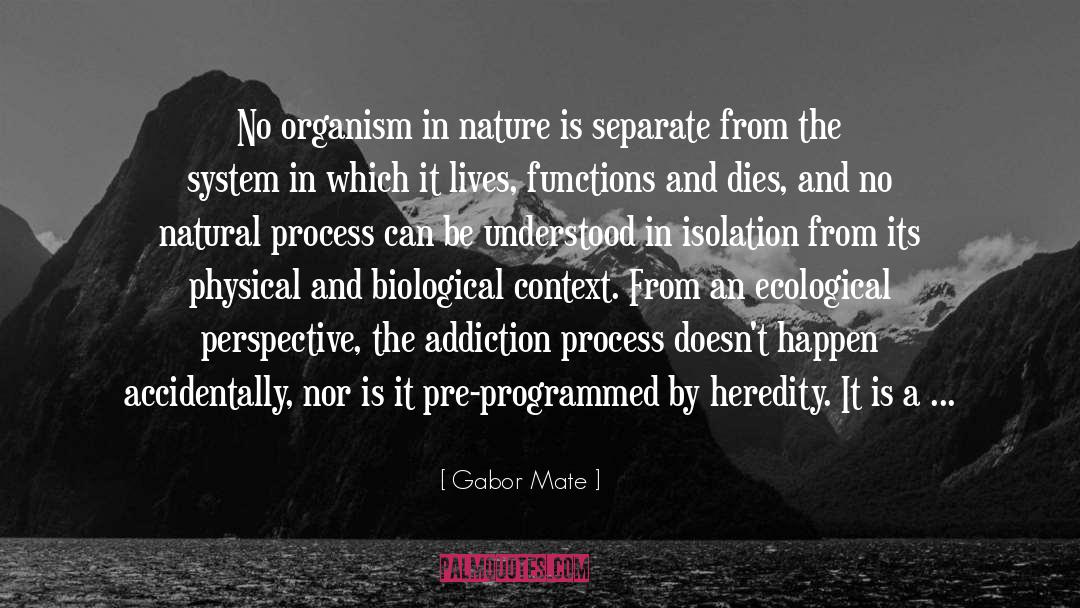
Young children cannot possibly understand the motives of adults. It means little to a young child that the parent feels love for him if that parent keeps disappearing at almost any time. The child experiences a sense of abandonment, a subliminal knowledge that there are things in the world much more important to the parent than he, the child, that he is not worthy of the parent's attention. He begins to feel, at first unconsciously, that there must be something wrong with him. He also begins to work too hard to get his needs met: demanding contact, acting out or trying to please the parent to gain approval and attention.
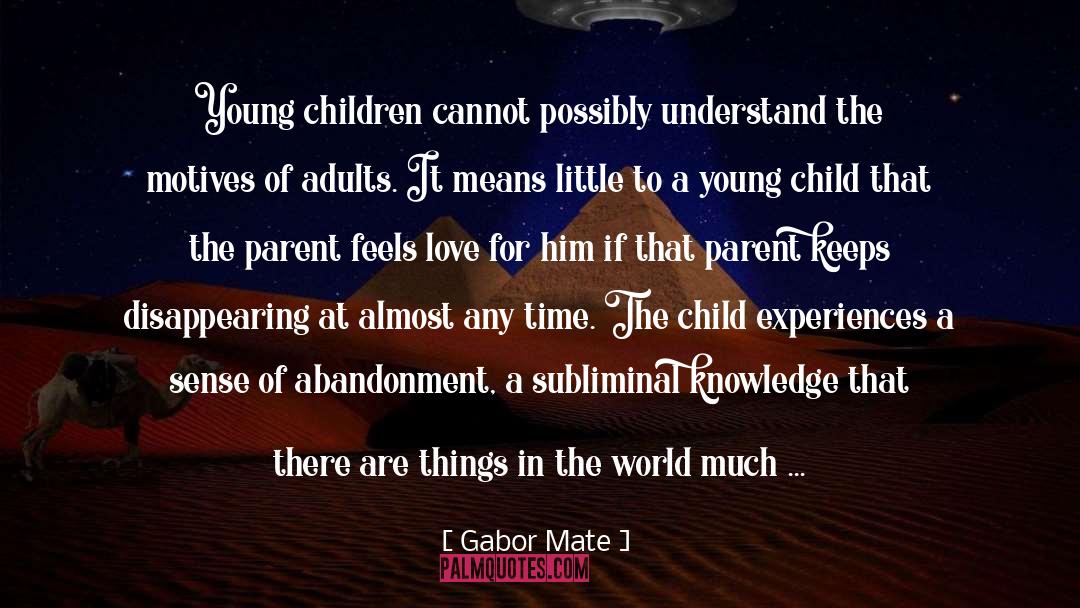
There's a psychologist called Mary & Diamond who at Brooklyn in California, in the 80s studied rats. And they took rats at different ages. Newborns, some of whom they deliberately brain damaged, adult, middle-aged, elderly rats. And they exposed these rats to different levels of environmental stimulation, better food, more playmates, toys to play with and so on.
They found out a couple of months later that the rats, at any age, including the brain-damaged rats, who had the better stimulation, they were smarter. But in the autopsy then they also found that in the front part of their brain they had larger nerve-cells with more connections with other nerve-cells and richer blood supply. In other words that environmental stimulation actually caused a change in the state of the brain, even in the older rats.
And that's called neuroplasticity. The capacity of the brain to develop new circuits. So whether it comes to ADHD, addiction, depression or other childhood disorders or any other issue with adults as well, if we recognize them not as ingrained, genetically-determined diseases, but as problems of development, then the question becomes very different. Then the question becomes not just "how do we treat the symptoms?" (and addiction itself is a symptom, depression is a symptom), but "how do we help people develop out of these conditions?"
In other words, it is not a medical question, purely, but a developmental question. And development always
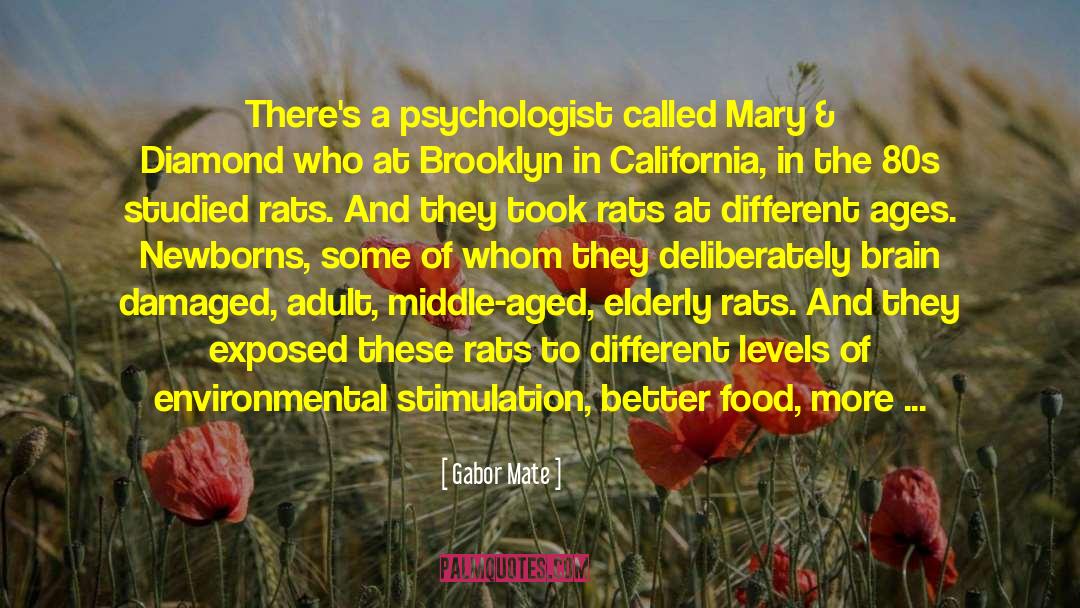
The three conditions without which healthy growth does not take place can be taken for granted in the matrix of the womb: nutrition, a physically secure environment and the unbroken relationship with a safe, ever-present maternal organism. The word matrix is derived from the Latin for "womb," itself derived from the word for "mother." The womb is mother, and in many respects the mother remains the womb, even following birth. In the womb environment, no action or reaction on the developing infant's part is required for the provision of any of his needs.
Life in the womb is surely the prototype of life in the Garden of Eden where nothing can possibly be lacking, nothing has to be worked for. If there is no consciousness - we have not yet eaten of the Tree of Knowledge - there is also no deprivation or anxiety. Except in conditions of extreme poverty unusual in the industrialized world, although not unknown, the nutritional needs and shelter requirements of infants are more or less satisfied. The third prime requirement, a secure, safe and not overly stressed emotional atmosphere, is the one most likely to be disrupted in Western societies.
The human infant lacks the capacity to follow or cling to the parent soon after being born, and is neurologically and biochemically underdeveloped in many other ways. The first nine months or so of extrauterine life seem to have been intended by nature as the second part of gestation. The anthropologist Ashley Mont
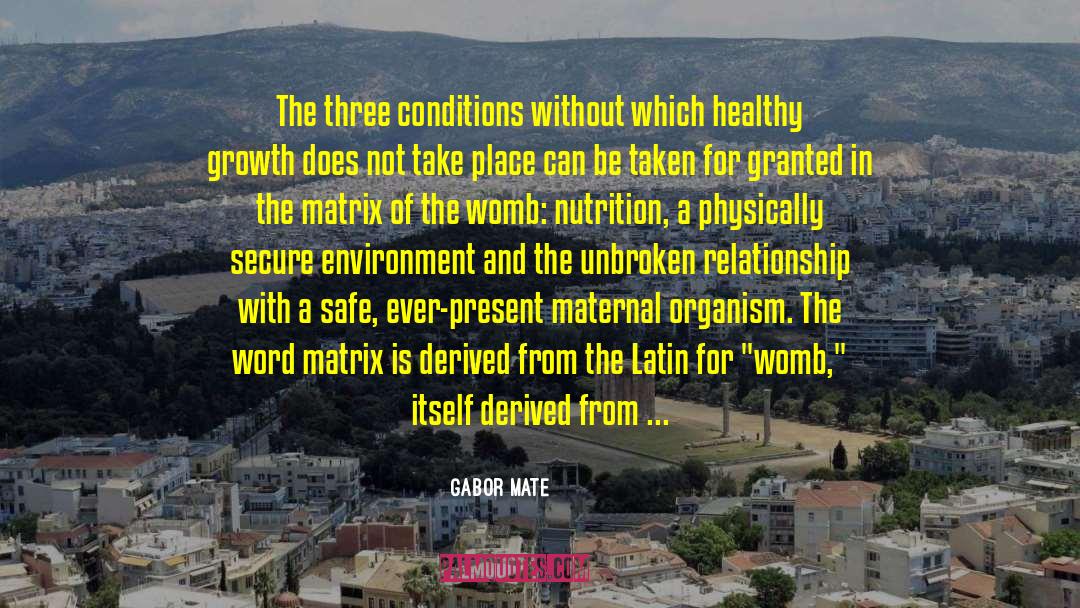
Not every story has a happy ending, ... but the discoveries of science, the teachings of the heart, and the revelations of the soul all assure us that no human being is ever beyond redemption. The possibility of renewal exists so long as life exists. How to support that possibility in others and in ourselves is the ultimate question.
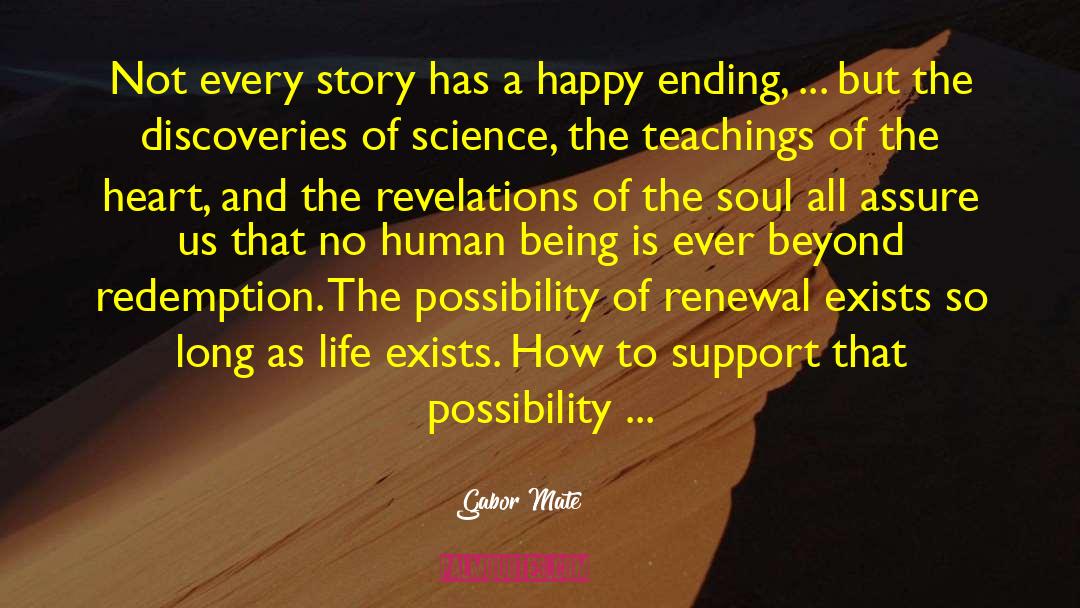
Parental efforts to gain leverage generally take two forms: bribery or coercion. If a simple direction such as "I'd like you to set the table" doesn't do, we may add an incentive, for example, "If you set the table for me, I'll let you have your favorite dessert." Or if it isn't enough to remind the child that it is time to do homework, we may threaten to withdraw some privilege. Or we may add a coercive tone to our voice or assume a more authoritarian demeanor. The search for leverage is never-ending: sanctions, rewards, abrogation of privileges; the forbidding of computer time, toys, or allowance; separation from the parent or separation from friends; the limitation or abolition of television time, car privileges, and so on and so on.
It is not uncommon to hear someone complain about having run out of ideas for what still might remain to be taken away from the child. As our power to parent decreases, our preoccupation with leverage increases. Euphemisms abound: bribes are called variously rewards, incentives, and positive reinforcement; threats and punishments are rechristened warnings, natural consequences, and negative reinforcements; applying psychological force is often referred to as modifying behavior or teaching a lesson. These euphemisms camouflage attempts to motivate the child by external pressure because his intrinsic motivation is deemed inadequate.
Attachment is natural and arises from within; leverage is contrived and imposed from witho

Our difficulty or inability to perceive the experience of others…is all the more pronounced the more distant these experiences are from ours in time, space, or quality," wrote the Auschwitz survivor Primo Levi. We can be moved by the tragedy of mass starvation on a far continent; after all, we have all known physical hunger, if only temporarily. But it takes a greater effort of emotional imagination to empathize with the addict. We readily feel for a suffering child, but cannot see the child in the adult who, his soul fragmented and isolated, hustles for survival a few blocks away from where we shop or work.
Levi quotes Jean Améry, a Jewish-Austrian philosopher and resistance fighter who fell into the grasp of the Gestapo. "Anyone who was tortured remains tortured… Anyone who has suffered torture never again will be able to be at ease in the world…Faith in humanity, already cracked by the first slap in the face, then demolished by torture, is never acquired again." Améry was a full-grown adult when he was traumatized, an accomplished intellectual captured by the foe in the course of a war of liberation. We may then imagine the shock, loss of faith and unfathomable despair of the child who is traumatized not by hated enemies but by loved ones.
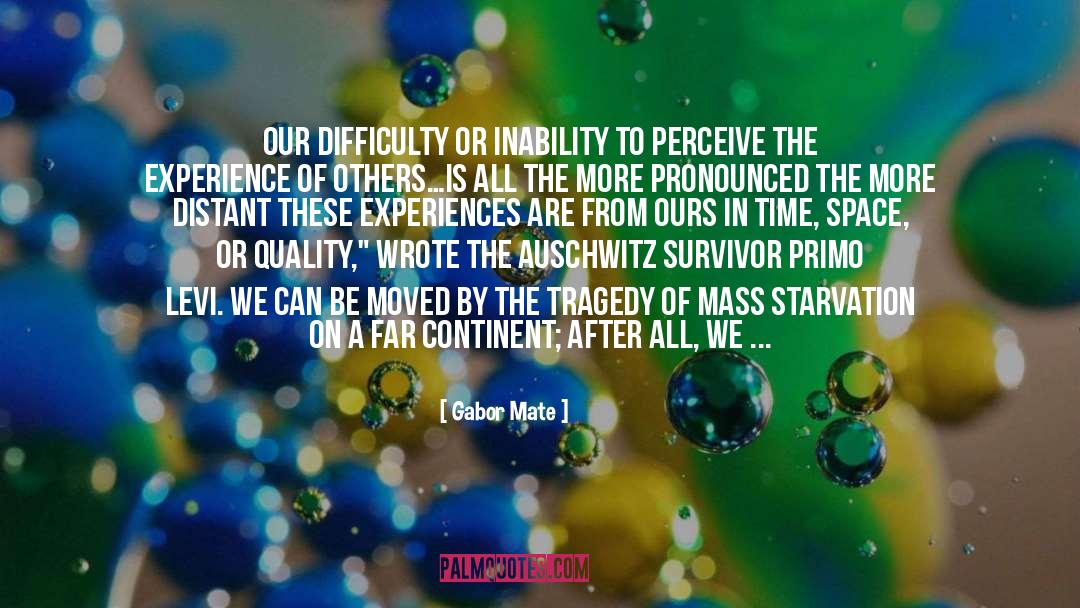
The repeated finding that people with happier, less troubled thought patterns can suffer more illness seems to defy common sense. The general belief is that positive emotions must be conducive to good health. While it is true that genuine joy and satisfaction enhance physical well-being, "positive" states of mind generated to tune out psychic discomfort lower resistance to illness. The brain governs and integrates the activities of all organs and systems of the body, simultaneously coordinating our interactions with the environment.
This regulating function depends on the clear recognition of negative influences, danger signals and signs of internal distress. In children whose environment chronically conveys mixed messages, an impairment occurs in the developing apparatus of the brain. The brain's capacity to evaluate the environment is diminished, including its ability to distinguish what is nourishing from what is toxic.
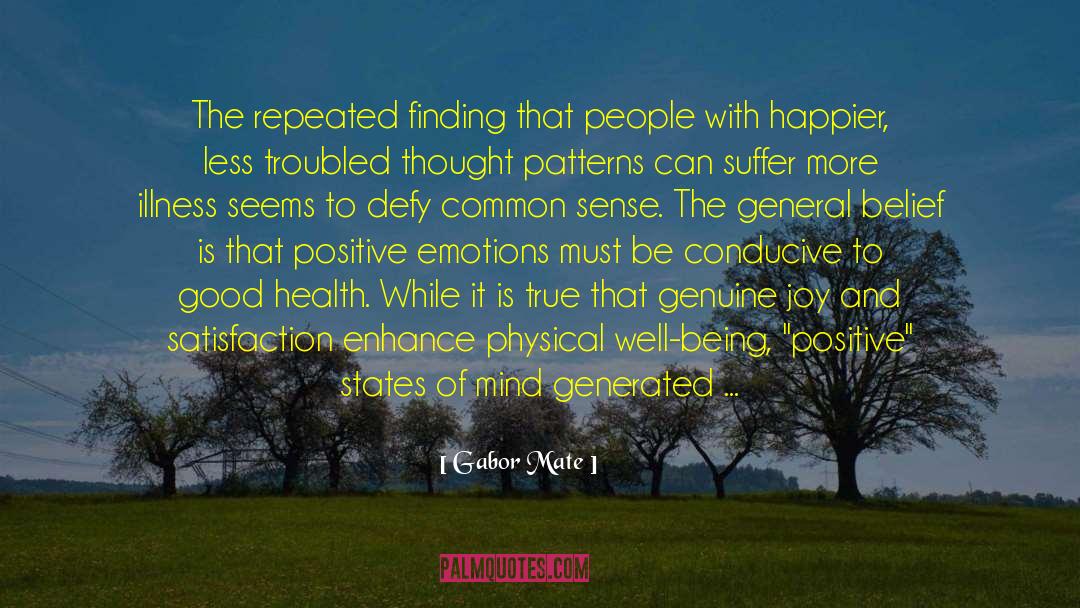
The origin of the word 'trauma' is the Greek for 'wound'. Trauma is a wound. How I think about it is that if I wounded you, if I cut your flesh, the healing would involve scar tissue forming. If the wound was great enough, you'd get a big scar, and it would be without nerve endings so you wouldn't feel, and it would be much less flexible than your normal tissue. Trauma is when there is a loss of feeling and there is a reduced flexibility in responding to the world. This is a response to a wound. Trauma is a psychic wound that hardens you psychologically that then interferes with your ability to grow and develop. It pains you and now you're acting out of pain. It induces fear and now you're acting out of fear. So without knowing it, your whole life is regulated by fear and pain that you're trying to escape from in various ways. Trauma is not what happens to you, it's what happens inside you as a result of what happened to you. Trauma is that scarring that makes you less flexible, more rigid, less feeling and more defended.
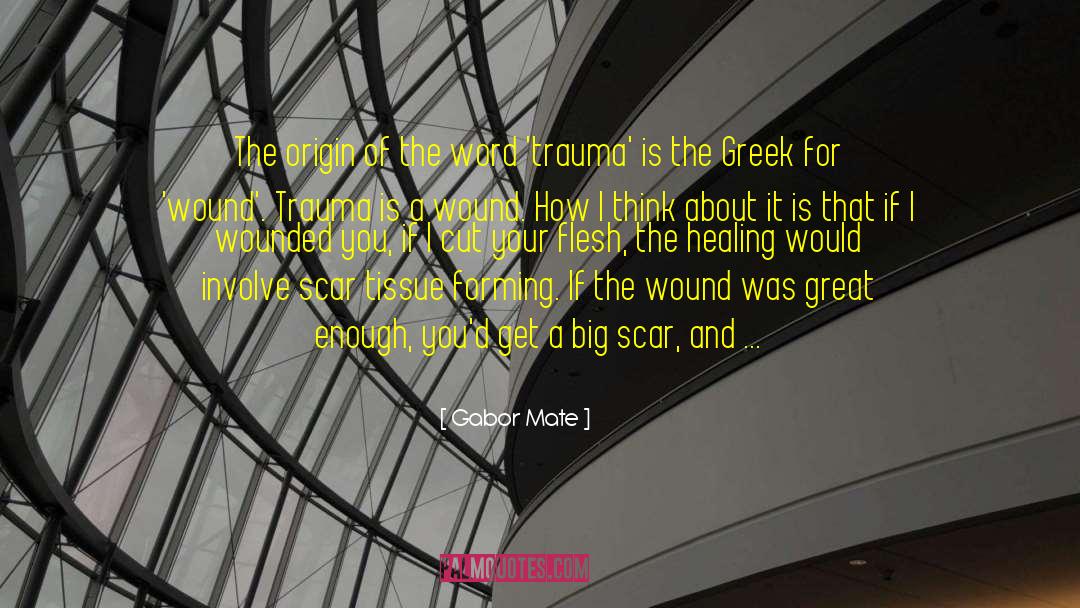
Creatures of attachment are creatures of instinct and impulse. It doesn't feel good or right or proper to seek favor in the eyes of those one is seeking distance from. When looking for the approval of your peers, it is almost unbearable to find favor with adults.
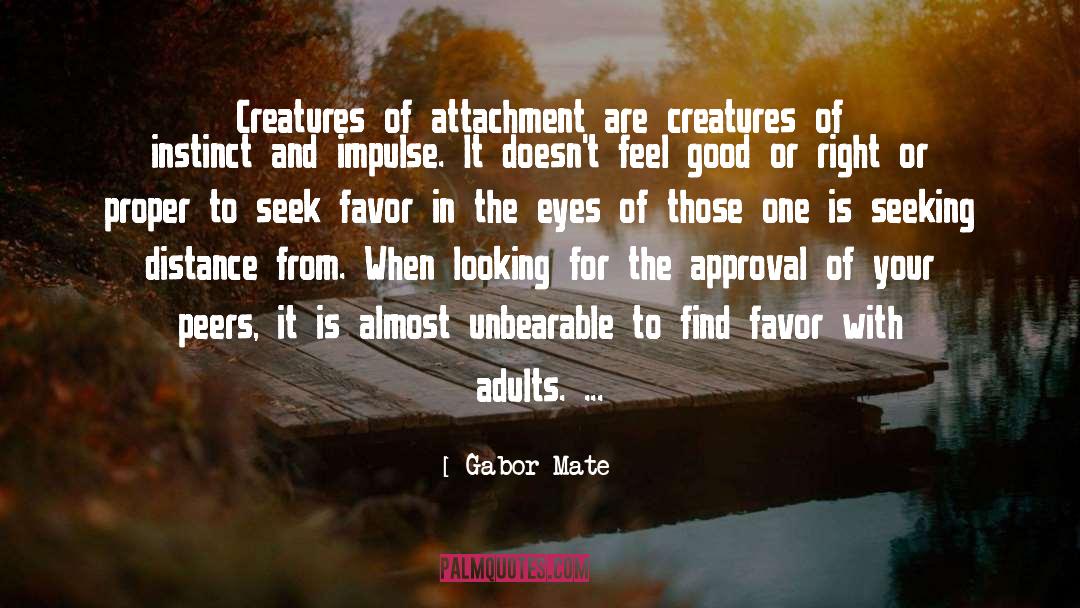
Compassionate curiosity about the self does not mean liking everything we find out about ourselves, only that we look at ourselves with the same nonjudgmental acceptance we would wish to accord anyone else who suffered and who needed help.
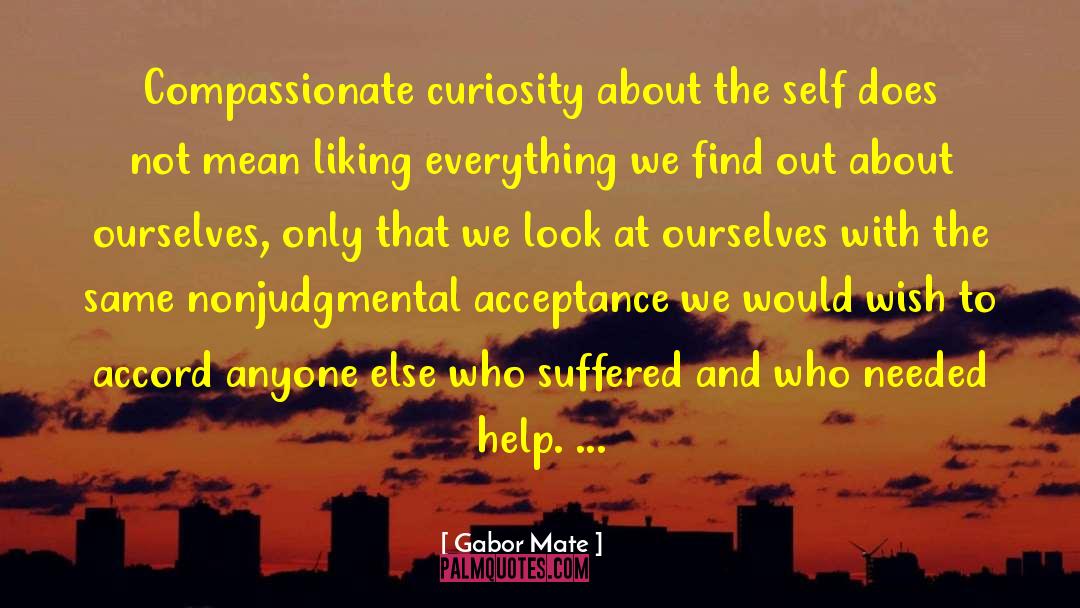
In attunement, it is the infant who leads and the mother who follows. "Where their roles differ is in the timing of their responses," writes John Bowlby, one of the century's great psychiatric researchers. The infant initiates the interaction or withdraws from it according to his own rhythms, Bowlby found, while the "mother regulates her behaviour so that it meshes with his... Thus she lets him call the tune and by a skillful interweaving of her own responses with his creates a dialogue."
The tense or depressed mothering adult will not be able to accompany the infant into relaxed, happy spaces. He may also not fully pick up signs of the infant's emotional distress, or may not be able to respond to them as effectively as he would wish. The ADD child's difficulty reading social cues likely originates from her relationship cues not being read by the nurturing adult, who was distracted by stress. In the attunement interaction, not only does the mother follow the child, but she also permits the child to temporarily interrupt contact.
When the interaction reaches a certain stage of intensity for the infant, he will look away to avoid an uncomfortably high level of arousal. Another interaction will then begin. A mother who is anxious may react with alarm when the infant breaks off contact, may try to stimulate him, to draw him back into the interaction. Then the infant's nervous system is not allowed to "cool down," and the attunement relationship is hampered
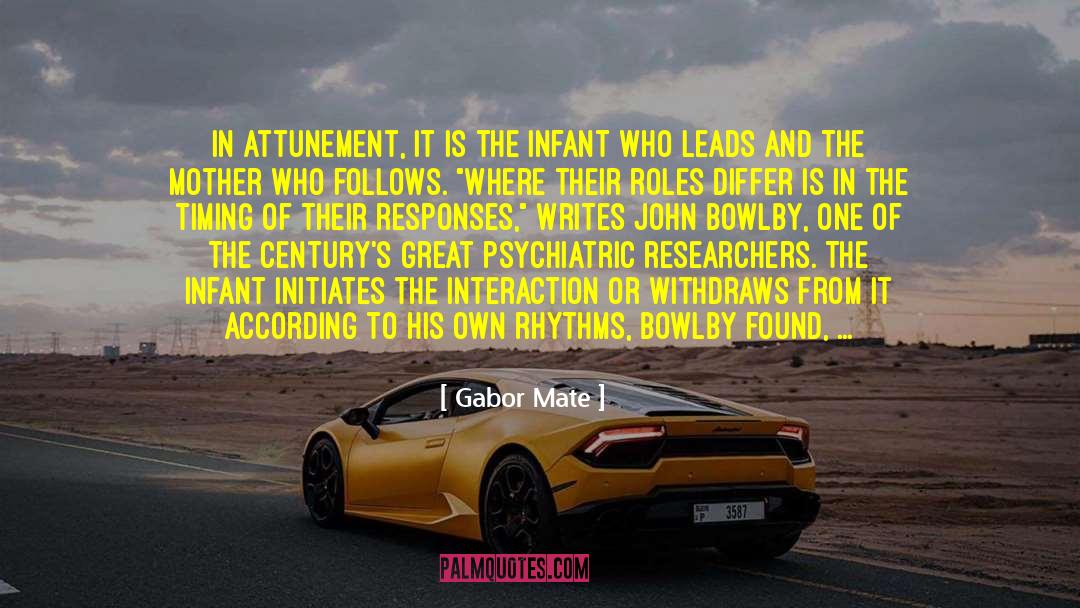
Above everything Ralph aches for unity with the external feminine caritas - blessed, soul-saving, divine love. Divine here refers to not a supernatural deity above us but to the immortal essence of existence that lives in us, through us, beyond us ... a search for the external extends far beyond formal religious concepts. One consequence of spiritual deprivation is addiction, and not only to drugs.

A genetic fundamentalism permeates public awareness these days. It may be summed up as the belief that almost every illness and every human trait is dictated by heredity. Simplified media accounts, culled from semidigested research findings, have declared that inflexible laws of DNA rule the biological world. It was reported in 1996 that according to some psychologists, genes determine about 50 percent of a person's inclination to experience happiness. Social ability and obesity are two more among the many human qualities now claimed to be genetic.
True or not, narrow genetic explanations for ADD and every other condition of the mind do have their attractions. They are easy to grasp, socially conservative and psychologically soothing. They raise no uncomfortable questions about how a society and culture might erode the health of its members, or about how life in a family may have affected a person's physiology or emotional makeup. As I have personally experienced, feelings of guilt are almost inevitable for the parents of a troubled child. They are all too frequently reinforced by the uninformed judgments of friends, neighbors, teachers or even total strangers on the bus or in the supermarket. Parental guilt, even if misplaced, is a wound for which the genetic hypothesis offers a balm
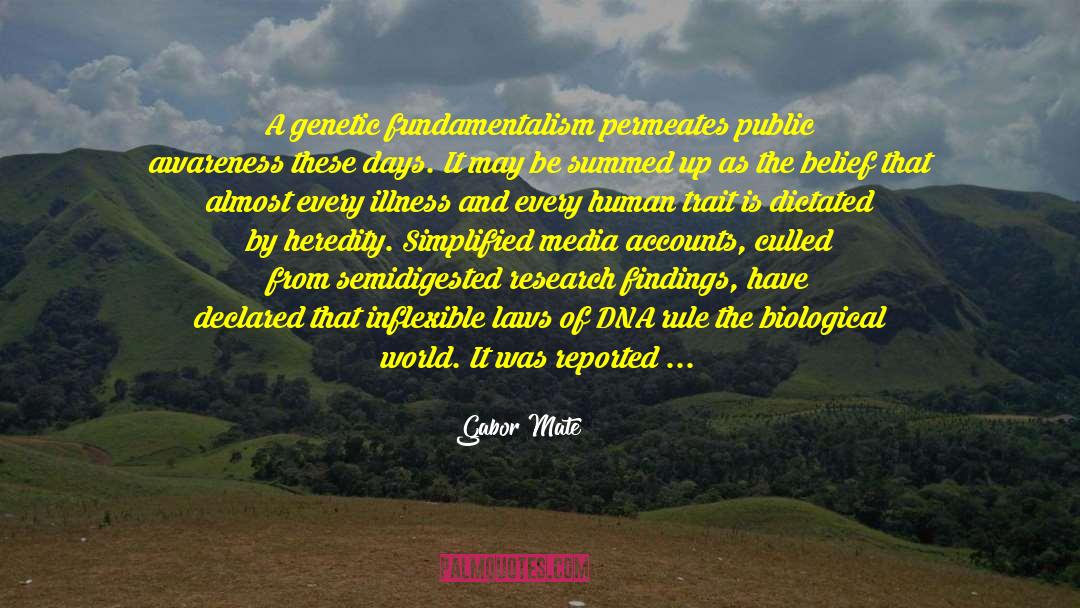
Harm reduction is often perceived as being inimical to the ultimate purpose of "curing" addiction - that is, of helping addicts transcend their habits and to heal. People regard it as "coddling" addicts, as enabling them to continue their destructive ways. It's also considered to be the opposite of abstinence, which many regard as the only legitimate goal of addiction treatment. Such a distinction is artificial. The issue in medical practice is always how best to help a patient. If a cure is possible and probable without doing greater harm, then cure is the objective. When it isn't - and in most chronic medical conditions cure is not the expected outcome - the physician's role is to help the patient with the symptoms and to reduce the harm done by the disease process.
In rheumatoid arthritis, for example, one aims to prevent joint inflammation and bone destruction and, in all events, to reduce pain. In incurable cancers we aim to prolong life, if that can be achieved without a loss of life quality, and also to control symptoms. In other words, harm reduction means making the lives of afflicted human beings more bearable, more worth living. That is also the goal of harm reduction in the context of addiction. Although hardcore drug addiction is much more than a disease, the harm reduction model is essential to its treatment. Given our lack of a systematic, evidencebased approach to addiction, in many cases it's futile to dream of a cure.
So long as s
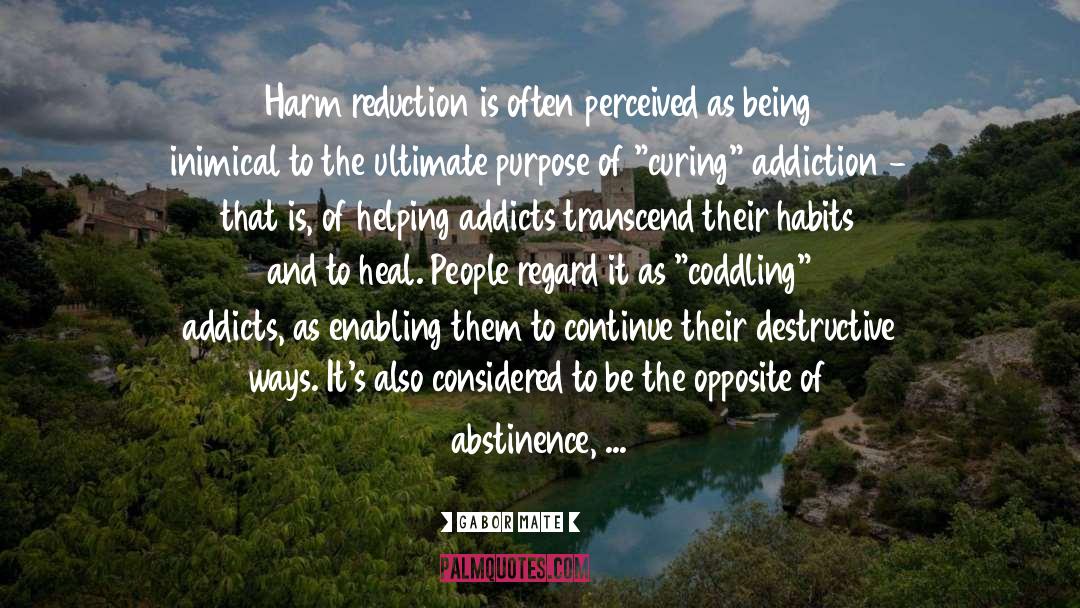
Nature's ultimate goal is to foster the growth of the individual from absolute dependence to independence - or, more exactly, to the interdependence of mature adults living in community. Development is a process of moving from complete external regulation to self-regulation, as far as our genetic programming allows. Well-self-regulated people are the most capable of interacting fruitfully with others in a community and of nurturing children who will also grow into self-regulated adults. Anything that interferes with that natural agenda threatens the organism's chances for long-term survival.
Almost from the beginning of life we see a tension between the complementary needs for security and for autonomy. Development requires a gradual and ageappropriate shift from security needs toward the drive for autonomy, from attachment to individuation. Neither is ever completely lost, and neither is meant to predominate at the expense of the other. With an increased capacity for self-regulation in adulthood comes also a heightened need for autonomy - for the freedom to make genuine choices. Whatever undermines autonomy will be experienced as a source of stress. Stress is magnified whenever the power to respond effectively to the social or physical environment is lacking or when the tested animal or human being feels helpless, without meaningful choices - in other words, when autonomy is undermined.
Autonomy, however, needs to be exercised in a way that does
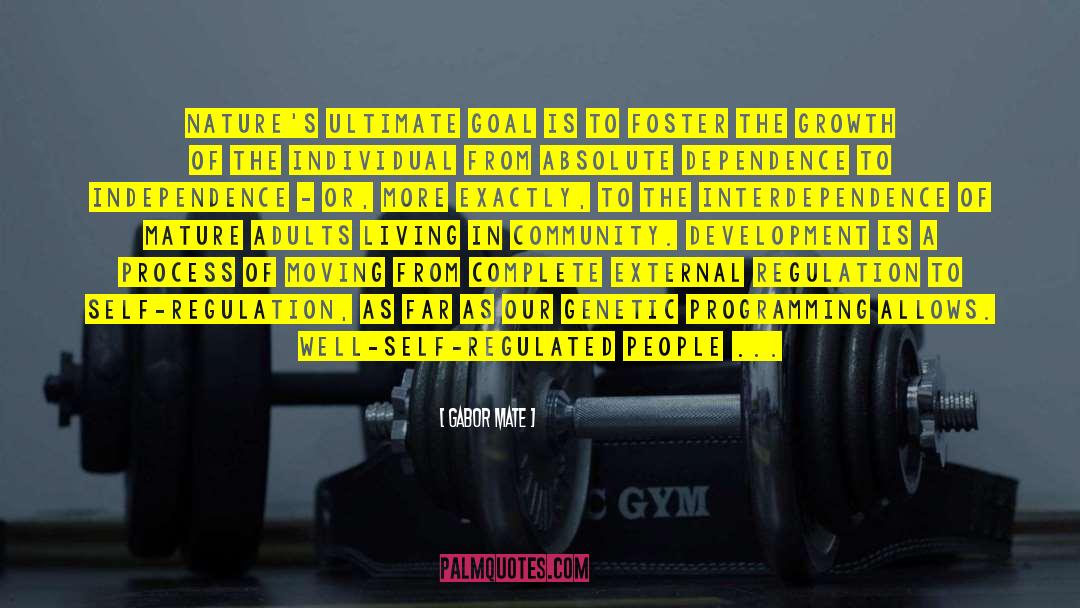
People jeopardize their lives for the sake of making the moment livable. Nothing sways them from the habit - not illness, not the sacrifice of love and relationship, not the loss of all earthly goods, not the crushing of their dignity, not the fear of dying. The drive is that relentless.
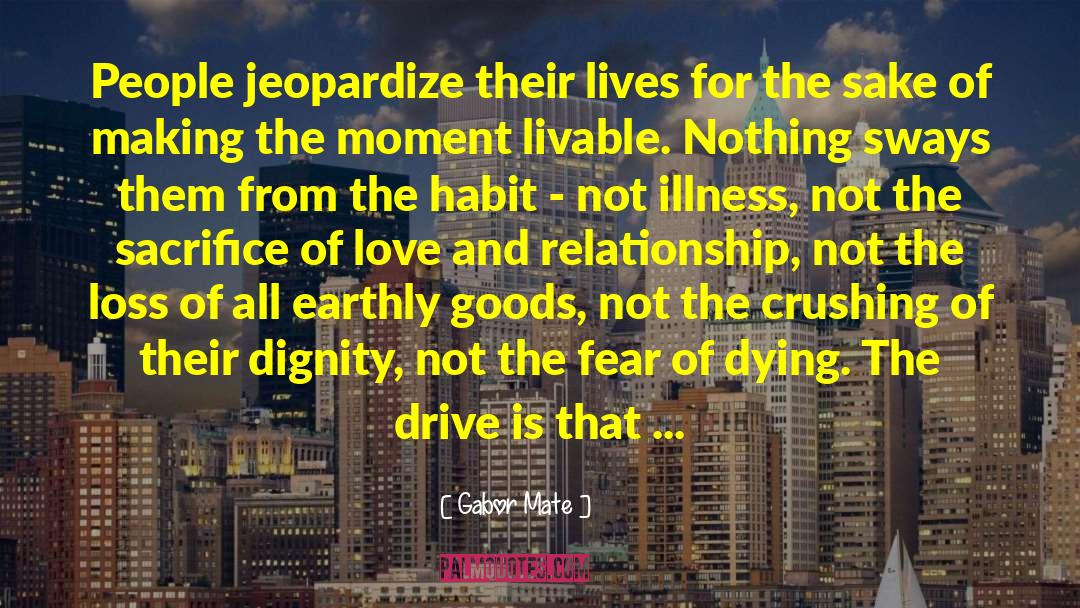
It may be argued that, at least so far as work is concerned, what I call my addictions have benefited other people. Even if that were true, it still wouldn't explain or justify addiction. The contributions I have made in a number of areas that I am passionate about could have been achieved without the addictive zeal that often drove me. There is no such thing as a good addiction. Everything a person can do is better done if there is no addictive attachment that pollutes it. For every addiction - no matter how benign or even laudable it seems from the outside - someone pays a price.

The experience of stress has three components. The first is the event, physical or emotional, that the organism interprets as threatening. This is the stress stimulus, also called the stressor. The second element is the processing system that experiences and interprets the meaning of the stressor. In the case of human beings, this processing system is the nervous system, in particular the brain. The final constituent is the stress response, which consists of the various physiological and behavioural adjustments made as a reaction to a perceived threat.
We see immediately that the definition of a stressor depends on the processing system that assigns meaning to it. The shock of an earthquake is a direct threat to many organisms, though not to a bacterium. The loss of a job is more acutely stressful to a salaried employee whose family lives month to month than to an executive who receives a golden handshake. Equally important is the personality and current psychological state of the individual on whom the stressor is acting. The executive whose financial security is assured when he is terminated may still experience severe stress if his self-esteem and sense of purpose were completely bound up with his position in the company, compared with a colleague who finds greater value in family, social interests or spiritual pursuits. The loss of employment will be perceived as a major threat by the one, while the other may see it as an opportunity.
There is no u
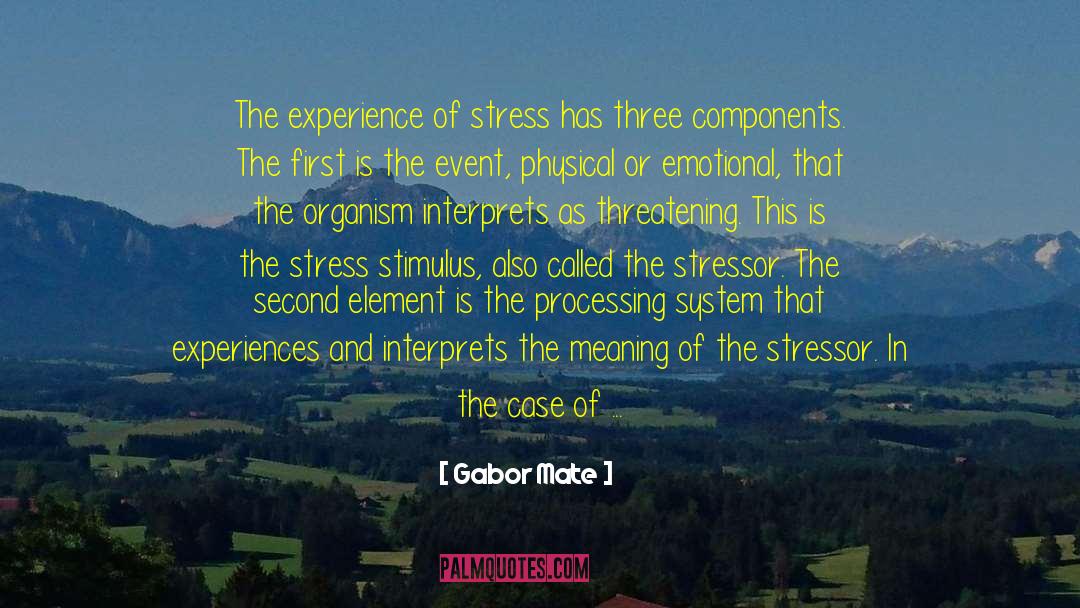
The primary culprit is assumed to be peer rejection: shunning, exclusion, shaming, taunting, mocking, bullying. The conclusion reached by some experts is that peer acceptance is absolutely necessary for a child's emotional health and well-being, and that there is nothing worse than not being liked by peers. It is assumed that peer rejection is an automatic sentence to lifelong self-doubt. Many parents today live in fear of their children's not having friends, not being esteemed by their peers.
This way of thinking fails to consider two fundamental questions: What renders a child so vulnerable in the first place? And why is this vulnerability increasing? It is absolutely true that children snub, ignore, shun, shame, taunt, and mock. Children have always done these things when not sufficiently supervised by the adults in charge. But it is attachment, not the insensitive behavior or language of peers, that creates vulnerability. The current focus on the impact of peer rejection and peer acceptance has completely overlooked the role of attachment.
If the child is attached primarily to the parents, it is parental acceptance that is vital to emotional health and well-being, and not being liked by parents is the devastating blow to self-esteem. The capacity of children to be inhumane has probably not changed, but, as research shows, the wounding of our children by one another is increasing. If many kids are damaged these days by the insensitivity of their pee
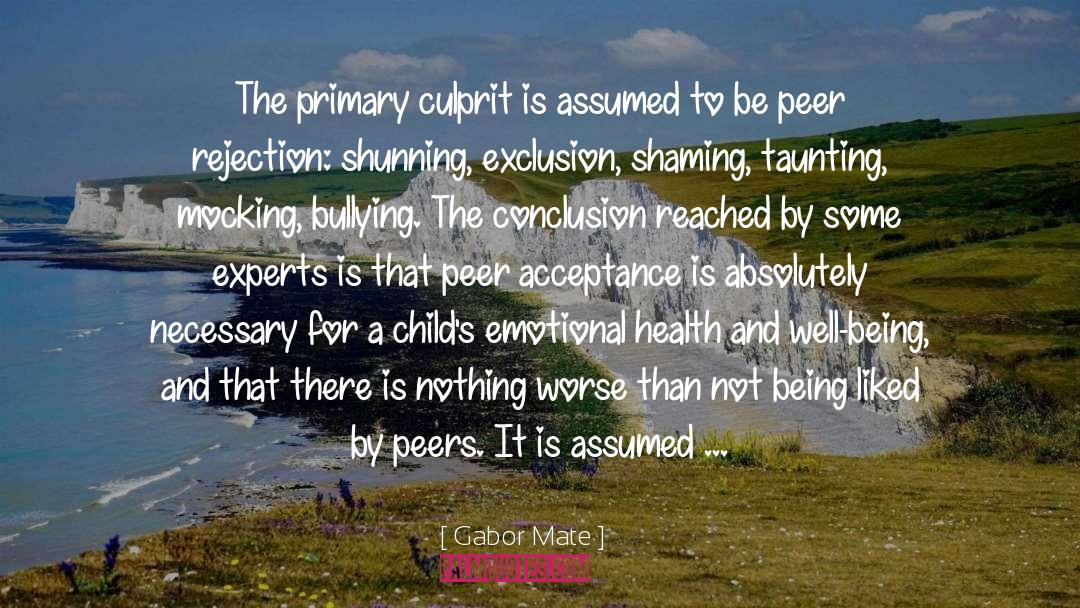
It may seem paradoxical to claim that stress, a physiological mechanism vital to life, is a cause of illness. To resolve this apparent contradiction, we must differentiate between acute stress and chronic stress. Acute stress is the immediate, short-term body response to threat. Chronic stress is activation of the stress mechanisms over long periods of time when a person is exposed to stressors that cannot be escaped either because she does not recognize them or because she has no control over them. Discharges of nervous system, hormonal output and immune changes constitute the flight-or-fight reactions that help us survive immediate danger. These biological responses are adaptive in the emergencies for which nature designed them. But the same stress responses, triggered chronically and without resolution, produce harm and even permanent damage. Chronically high cortisol levels destroy tissue. Chronically elevated adrenalin levels raise the blood pressure and damage the heart. There is extensive documentation of the inhibiting effect of chronic stress on the immune system.
In one study, the activity of immune cells called natural killer (NK) cells were compared in two groups: spousal caregivers of people with Alzheimer's disease, and age- and health-matched controls. NK cells are front-line troops in the fight against infections and against cancer, having the capacity to attack invading micro-organisms and to destroy cells with malignant mutations. The NK cell fun
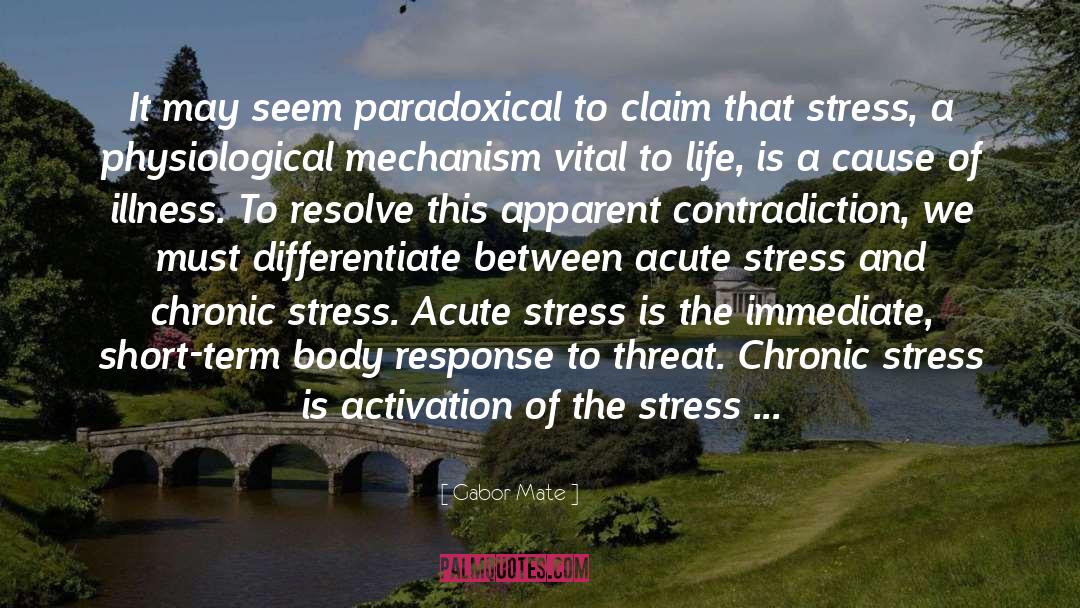
The addict's reliance on the drug to reawaken her dulled feelings is no adolescent caprice. The dullness is itself a consequence of an emotional malfunction not of her making; the internal shutdown of vulnerability. Vulnerability is our susceptibility to be wounded. This fragility is part of our nature and cannot be escaped. The best the brain can do is to shut down conscious awareness of it when pain becomes so vast or unbearable that it threatens our ability to function. The automatic repression of painful emotion is a helpful child's prime defence mechanism and can enable the child to endure trauma otherwise be catastrophic. The unfortunate consequence is a wholesale dulling of emotional awareness.
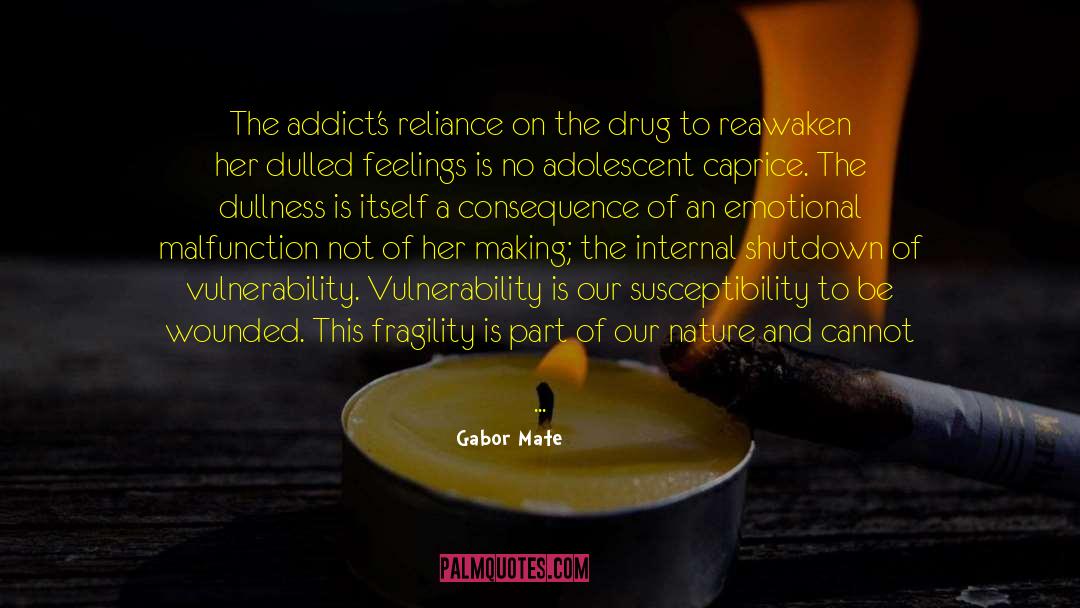
Not all addictions are rooted in abuse or trauma, but I do believe they can all be traced to painful experience. A hurt is at the centre of all addictive behaviours. It is present in the gambler, the Internet addict, the compulsive shopper and the workaholic. The wound may not be as deep and the ache not as excruciating, and it may even be entirely hidden - but it's there. As we'll see, the effects of early stress or adverse experiences directly shape both the psychology and the neurobiology of addiction in the brain.
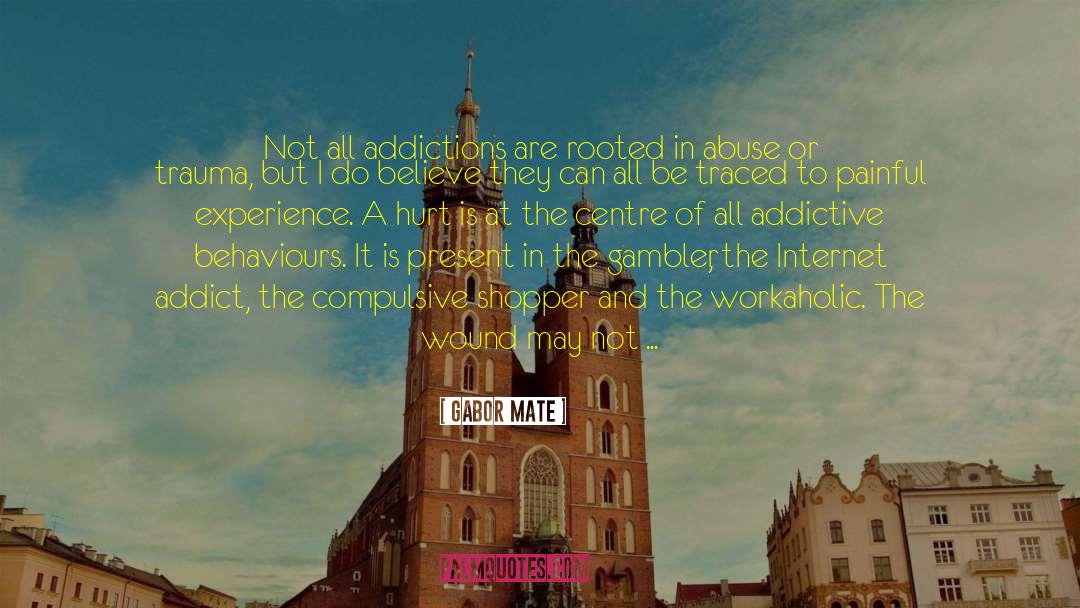
Strong convictions do not necessarily signal a powerful sense of self: very often quite the opposite. Intensely held beliefs may be no more than a person's unconscious effort to build a sense of self to fill what, underneath, is experienced as a vacuum.
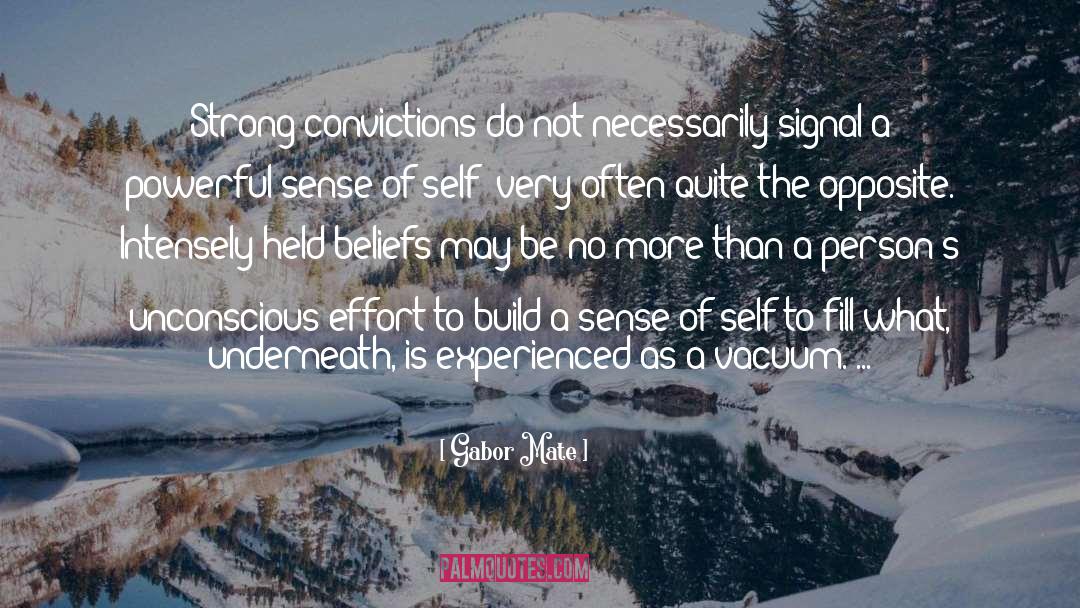
Humans never outgrow their need to connect with others, nor should they, but mature, truly individual people are not controlled by these needs. Becoming such a separate being takes the whole of a childhood, which in our times stretches to at least the end of the teenage years and perhaps beyond. We need to release a child from preoccupation with attachment so he can pursue the natural agenda of independent maturation. The secret to doing so is to make sure that the child does not need to work to get his needs met for contact and closeness, to find his bearings, to orient.
Children need to have their attachment needs satiated; only then can a shift of energy occur toward individuation, the process of becoming a truly individual person. Only then is the child freed to venture forward, to grow emotionally. Attachment hunger is very much like physical hunger. The need for food never goes away, just as the child's need for attachment never ends. As parents we free the child from the pursuit of physical nurturance. We assume responsibility for feeding the child as well as providing a sense of security about the provision. No matter how much food a child has at the moment, if there is no sense of confidence in the supply, getting food will continue to be the top priority.
A child is not free to proceed with his learning and his life until the food issues are taken care of, and we parents do that as a matter of course. Our duty ought to be equally transparent
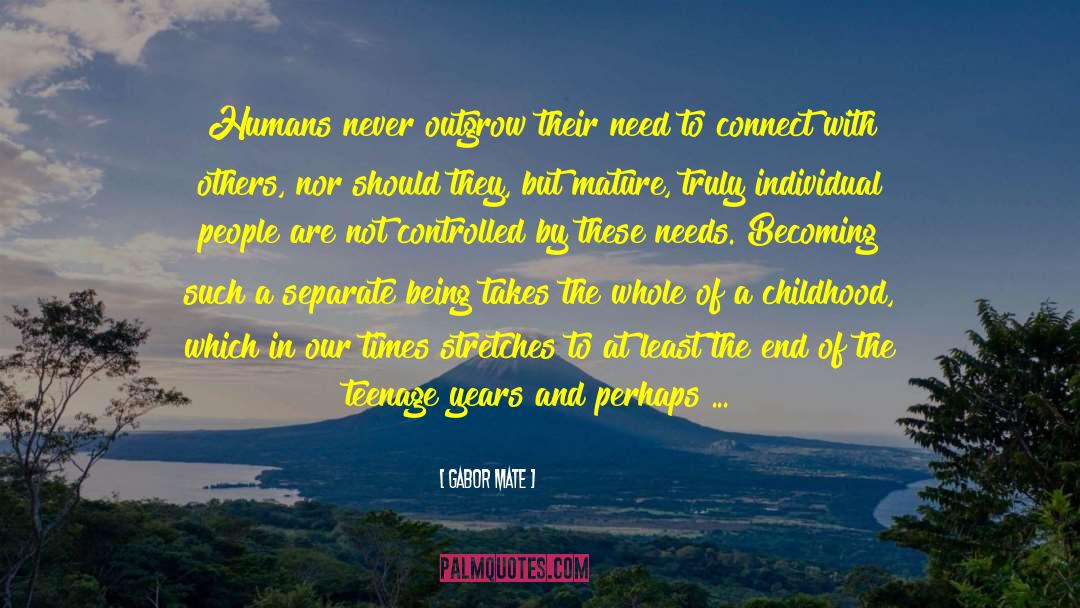
Much of what we do arises from automatic programming that bypasses conscious awareness and may even run contrary to our intentions, as Dr. Schwartz points out:
The passive side of mental life, which is generated solely and completely by brain mechanisms, dominates the tone and tenor of our day-to-day, even our second-to-second experience. During the quotidian business of daily life, the brain does indeed operate very much as a machine does.
Decisions that we may believe to be freely made can arise from unconscious emotional drives or subliminal beliefs. They can be dictated by events of which we have no recollection. The stronger a person's automatic brain mechanisms and the weaker the parts of the brain that can impose conscious control, the less true freedom that person will be able to exercise in her life. In OCD, and in many other conditions, no matter how intelligent and well-meaning the individual, the malfunctioning brain circuitry may override rational judgment and intention. Almost any human being when overwhelmed by stress or powerful emotions, will act or react not from intention but from mechanisms that are set off deep in the brain, rather than being generated in the conscious and volitional segments of the cortex. When acting from a driven or triggered state, we are not free.
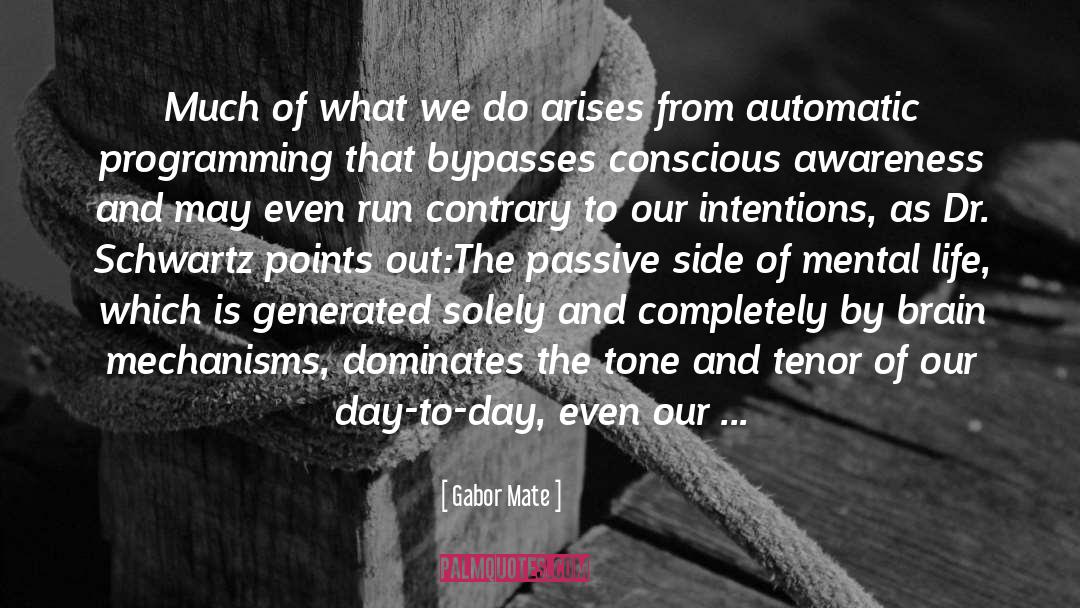
The core belief in having to be strong enough, characteristic of many people who develop chronic illness, is a defence. The child who perceives that her parents cannot support her emotionally had better develop an attitude of "I can handle everything myself." Otherwise, she may feel rejected. One way not to feel rejected is never to ask for help, never to admit "weakness" - to believe that I am strong enough to withstand all my vicissitudes alone.
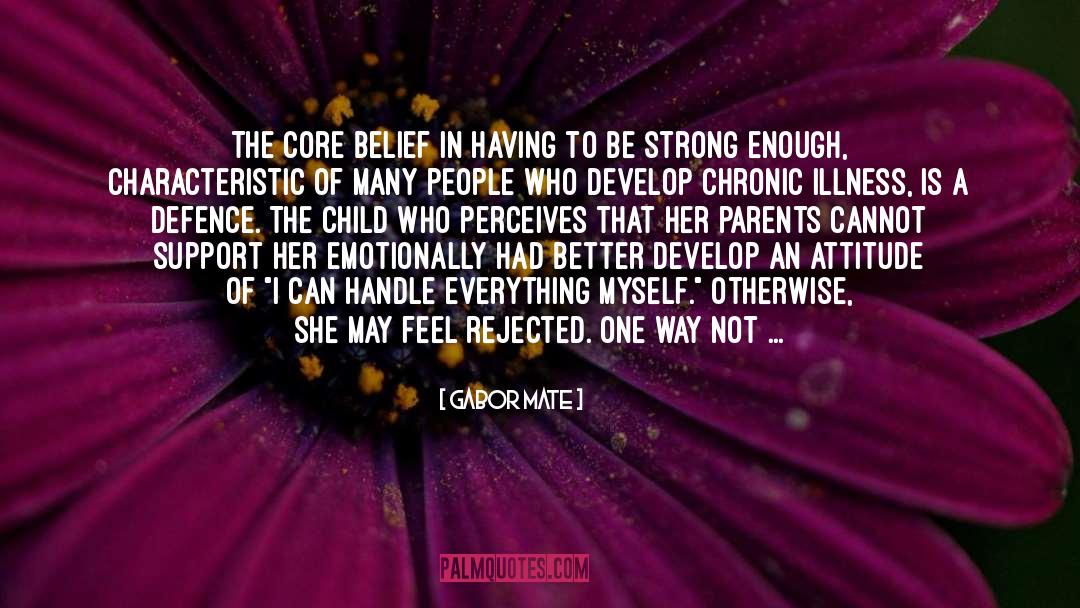
The salient stressors in the lives of most human beings today - at least in the industrialized world - are emotional. Just like laboratory animals unable to escape, people find themselves trapped in lifestyles and emotional patterns inimical to their health. The higher the level of economic development, it seems, the more anaesthetized we have become to our emotional realities. We no longer sense what is happening in our bodies and cannot therefore act in self-preserving ways. The physiology of stress eats away at our bodies not because it has outlived its usefulness but because we may no longer have the competence to recognize its signals.
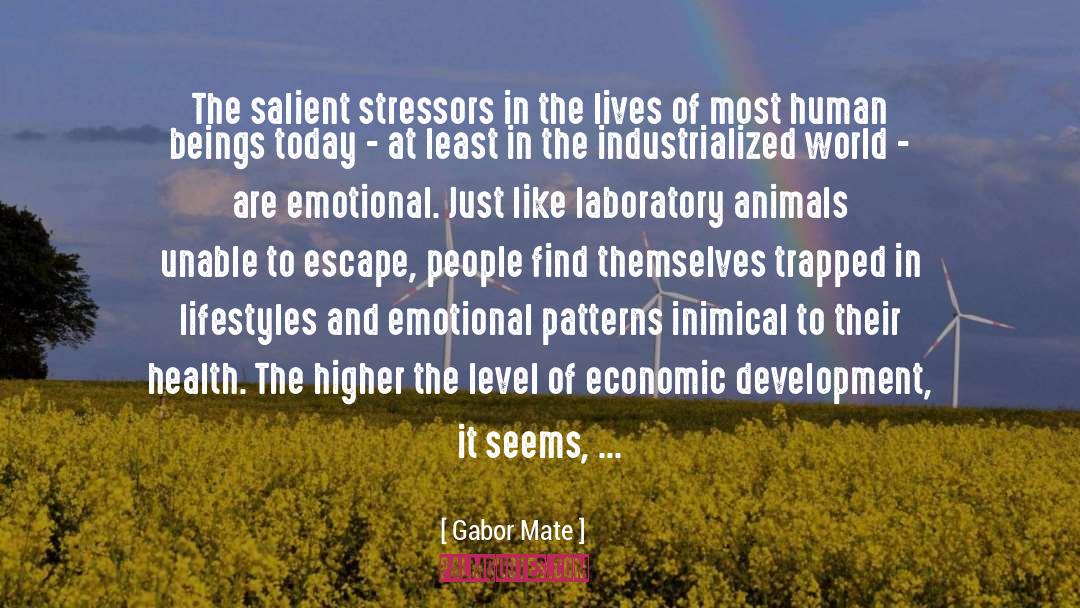
Shame is the deepest of the "negative emotions," a feeling we will do almost anything to avoid. Unfortunately, our abiding fear of shame impairs our ability to see reality.

In Separation, the second volume of his great trilogy on attachment, John Bowlby described what had been observed when ten small children in residential nurseries were reunited with their mothers after separations lasting from twelve days to twenty-one weeks. The separations were in every case due to family emergencies and the absence of other caregivers, and in no case due to any intent on the parents' part to abandon the child. In the first few days following the mother's departure the children were anxious, looking everywhere for the missing parent.
That phase was followed by apparent resignation, even depression on the part of the child, to be replaced by what seemed like the return of normalcy. The children would begin to play, react to caregivers, accept food and other nurturing. The true emotional cost of the trauma of loss became evident only when the mothers returned. On meeting the mother for the first time after the days or weeks away, every one of the ten children showed significant alienation. Two seemed not to recognize their mothers. The other eight turned away or even walked away from her. Most of them either cried or came close to tears; a number alternated between a tearful and an expressionless face.
The withdrawal dynamic has been called "detachment" by John Bowlby. Such detachment has a defensive purpose. It has one meaning: so hurtful was it for me to experience your absence that to avoid such pain again, I will encase myself in a

While nervous tension may be a component of stress, one can be stressed without feeling tension.
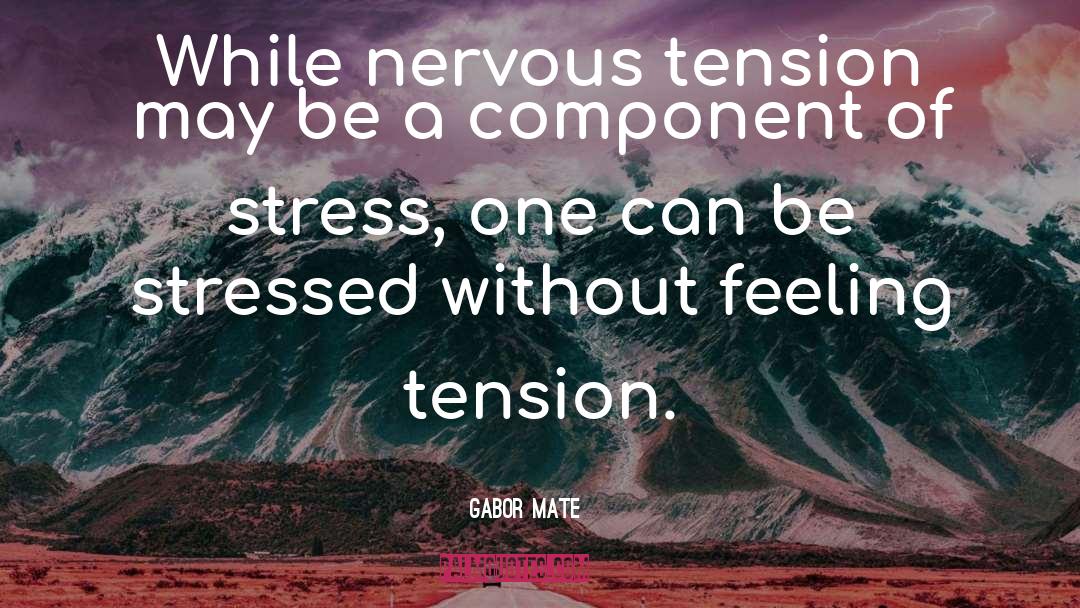
It is easy to misinterpret the child's counterwill as a drive for power. We may never be fully in control of our circumstances, but to raise children and to face their counterwill on a daily basis is to have our powerlessness driven home to us consistently. In present-day society it is neither surprising nor unusual for parents to feel tyrannized and powerless. With the sense of impotence we experience when child-adult attachments are not strong enough, we begin to see our children as manipulative, controlling, and even powerful. We need to get past the symptoms.
If all we perceive is the resistance or the insolence, we will respond with anger, frustration, and force. We must see that the child is only reacting instinctively whenever he feels he is being pushed and pulled. Beyond the counterwill we need to recognize the weakened attachment. The defiance is not the essence of the problem; the root cause is the peer orientation that makes counterwill backfire on adults and robs it of its natural purpose. The best response to a child's counterwill is a stronger parental relationship and less reliance on force.
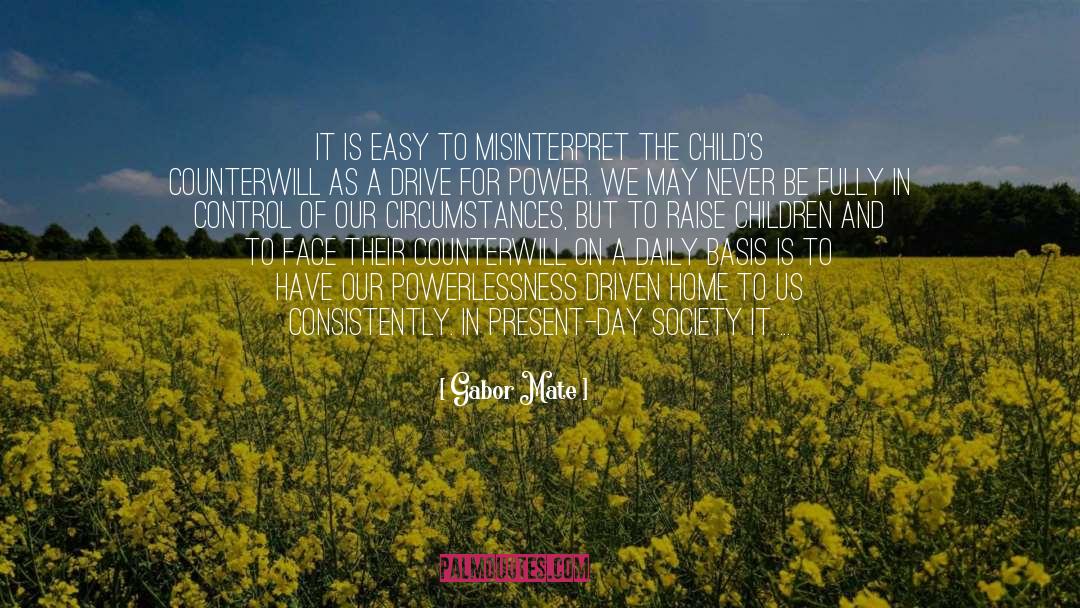
What happens when insatiability dominates a person's emotional functioning? The process of maturation is preempted by an obsession or an addiction, in this case for peer connection. Peer contact whets the appetite without nourishing. It titillates without satisfying. The end result of peer contact is usually an urgent desire for more. The more the child gets, the more he craves.
The mother of an eight-year-old girl mused, "I don't get it - the more time my daughter spends with her friends, the more demanding she becomes to get together with them. How much time does she really need for social interaction, anyway?" Likewise, the parents of a young adolescent complained that "as soon as our son comes home from camp, he gets on the phone right away to call the kids he's just been with. Yet it's the family he hasn't seen for two weeks."
The obsession with peer contact is always worse after exposure to peers, whether it is at school or in playtimes, sleepovers, class retreats, outings, or camps. If peer contact satiated, times of peer interaction would lead automatically to increased self-generated play, creative solitude, or individual reflection. Many parents confuse this insatiable behavior with a valid need for peer interaction.
Over and over I hear some variation of "but my child is absolutely obsessed with getting together with friends. It would be cruel to deprive him." Actually, it would be more cruel and irresponsible to indulge what s
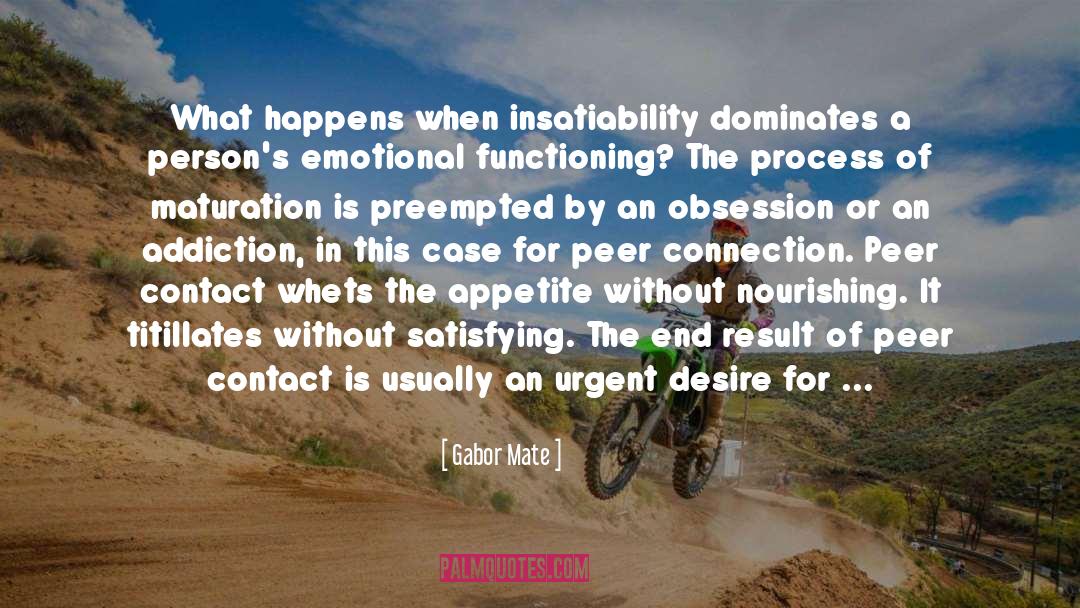
The traditional hospital practice of excluding parents ignored the importance of attachment relationships as regulators of the child's emotions, behaviour and physiology. The child's biological status would be vastly different under the circumstances of parental presence or absence. Her neurochemical output, the electrical activity in her brain's emotional centres, her heart rate, blood pressure and the serum levels of the various hormones related to stress would all vary significantly. Life is possible only within certain well-defined limits, internal or external.
We can no more survive, say, high sugar levels in our bloodstream than we can withstand high levels of radiation emanating from a nuclear explosion. The role of self-regulation, whether emotional or physical, may be likened to that of a thermostat ensuring that the temperature in a home remains constant despite the extremes of weather conditions outside. When the environment becomes too cold, the heating system is switched on. If the air becomes overheated, the air conditioner begins to work.
In the animal kingdom, self-regulation is illustrated by the capacity of the warm-blooded creature to exist in a broad range of environments. It can survive more extreme variations of hot and cold without either chilling or overheating than can a coldblooded species. The latter is restricted to a much narrower range of habitats because it does not have the capacity to self-regulate the internal environm
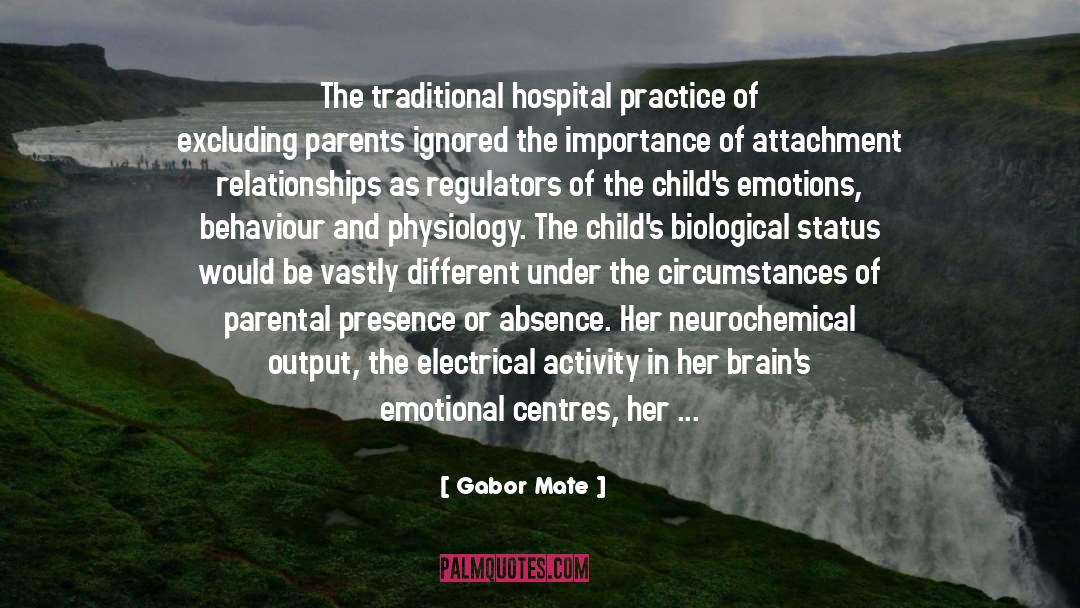
So what you've actually got is traumatized children. When children are traumatized that affects how they feel about themselves, which is deeply ashamed because a child always believe that it is about himself. So if I am being hurt like this, I got to be a terrible person. Or.. if I was sexually abused, why didn't I fight back, I must be a very weak person. So there's a deep sense of shame.
Then there's tremendous emotional pain that accrues from abuse and neglect. Tremendous emotional pain that is hardly possible for people to bear. Now they have to soothe their pain with substances or other compulsive behaviors.
Then the trauma itself, given that the human brain develops in interaction with the environment, shapes the brain circuitry in such a way that the person will be more likely to find relief from the drugs. So the very phisiology of the brain is affected by early trauma.
So then you take these traumatized people and you make their habit illegal... It is not illegal to drink yourself to death. It is not illegal to make yourself sick with emphyzema or lung cancer by means of cigarettes. But it is illegal to use other substances. So now you take these abused, traumatized people you place them outside the law, you put them in jails and you hound them all their lives, treating them like criminals and bad people and failures and rejects and less-than-human. And then we wonder how come they don't get better.
So.. it is a self-perpet
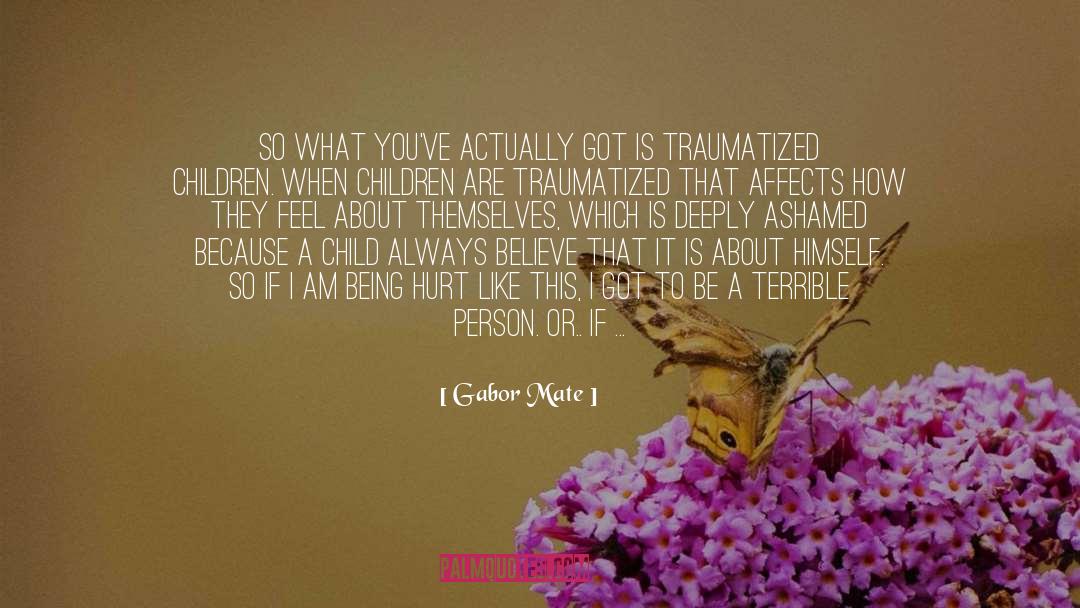
Vulnerability is usually attacked, not with fists but with shaming. Many children learn quickly to cover up any signs of weakness, sensitivity, and fragility, as well as alarm, fear, eagerness, neediness, or even curiosity. Above all, they must never disclose that the teasing has hit its mark. Carl Jung explained that we tend to attack in others what we are most uncomfortable with in ourselves. When vulnerability is the enemy, it is attacked wherever it is perceived, even in a best friend.
Signs of alarm may provoke verbal taunts such as "fraidy cat" or "chicken." Tears evoke ridicule. Expressions of curiosity can precipitate the rolling of eyes and accusations of being weird or nerdy. Manifestations of tenderness can result in incessant teasing. Revealing that something caused hurt or really caring about something is risky around someone uncomfortable with his vulnerability. In the company of the desensitized, any show of emotional openness is likely to be targeted.
The vulnerability engendered by peer orientation can be overwhelming even when children are not hurting one another. This vulnerability is built into the highly insecure nature of peer-oriented relationships. Vulnerability does not have to do only with what is happening but with what could happen - with the inherent insecurity of attachment. What we have, we can lose, and the greater the value of what we have, the greater the potential loss. We may be able to achieve closeness in a relati
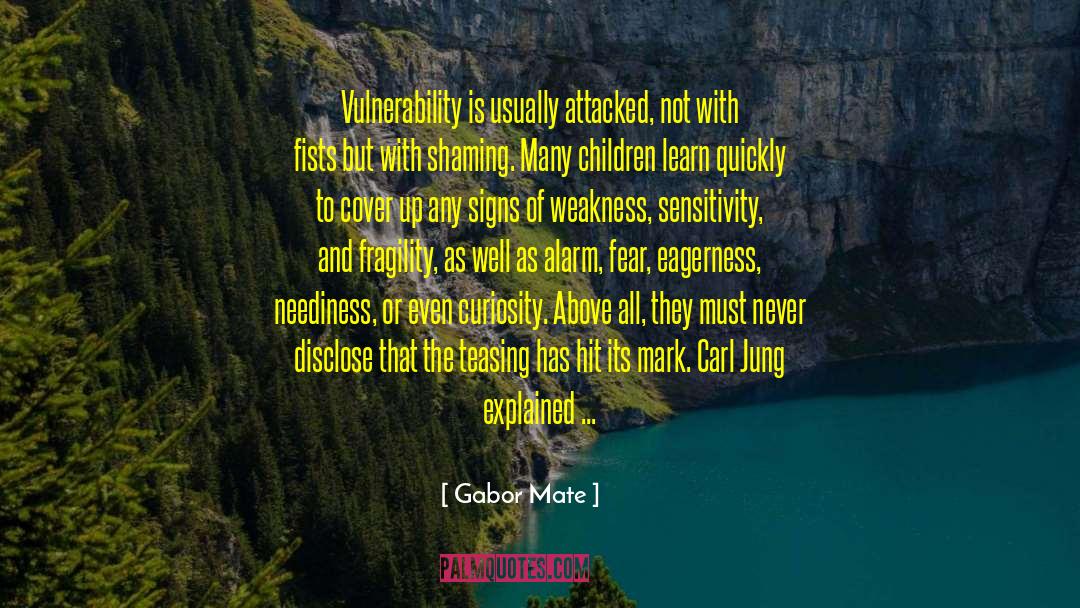
Opiates don't only relieve physical pain, they also relieve emotional pain. It turns out that the same part of the brain that experiences the suffering of physical pain also experiences the suffering of social rejection, for example. The sources and pathways of the pain are different, but the suffering is experienced in the same part of the brain, where opiate receptors are abudantly present.
And if you look at alcohol, it's a pain-reliever. In fact, you know, the old saying, when someone drank too much they used to say "he's feeling no pain". Cocaine.. is a local anesthetic it numbs nerve endings. Cannabis has pain-relieving qualities. All the behaviors of addiction, whether they are substance-related or not, either directly soothe pain, emotional pain, or they distract from it. So my mantra and the first question in addiction is not "why the addiction?", but "why the pain?"
And if want to understand why people have pain, you got to look at their lives, not at their genes, not at their choices, but what actually happened to them.
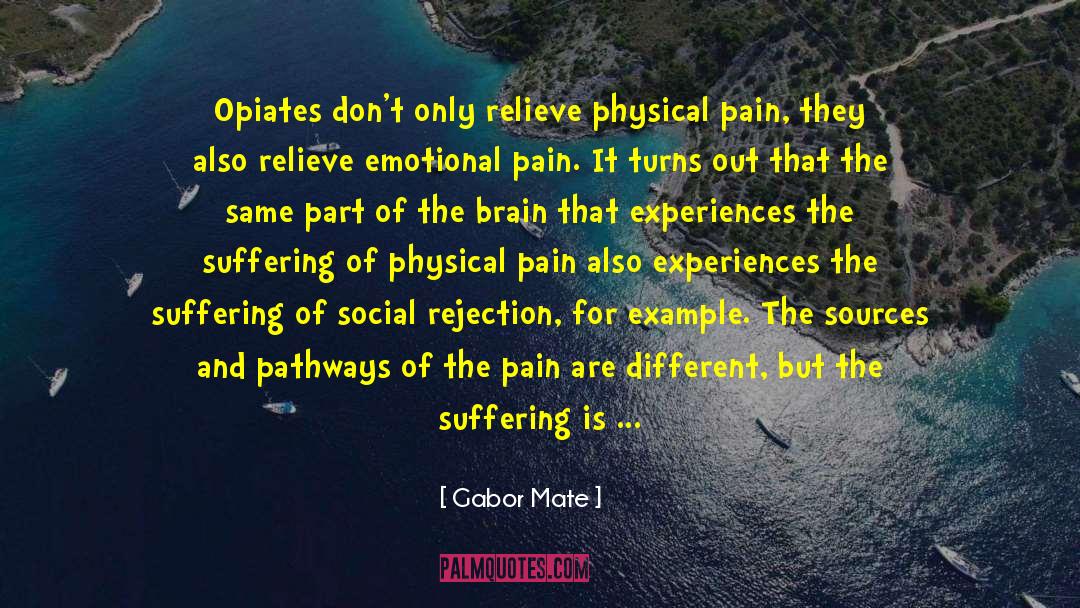
It is worth recalling here that the injudicious use of rewards and praise can be pressure tactics no less than verbal or physical coercion. As we have seen, there are three dangers with motivating by means of reward and praise. First, they feed the anxiety that not the person but the desired achievement is what is valued by the parent. They directly reinforce the insecurity of the ADD child. Second, since children can sense the parents' will pushing them, even if under benign disguises such as gifts or warm words, counterwill will be strengthened. Third, praise and reward will themselves become the goal, at the expense of the child's interest in the actual process of what he is doing. Children thus motivated will sooner or later learn to get by with the least amount of effort necessary to earn the praise or the reward. Short cuts and cheating often follow. Accepting
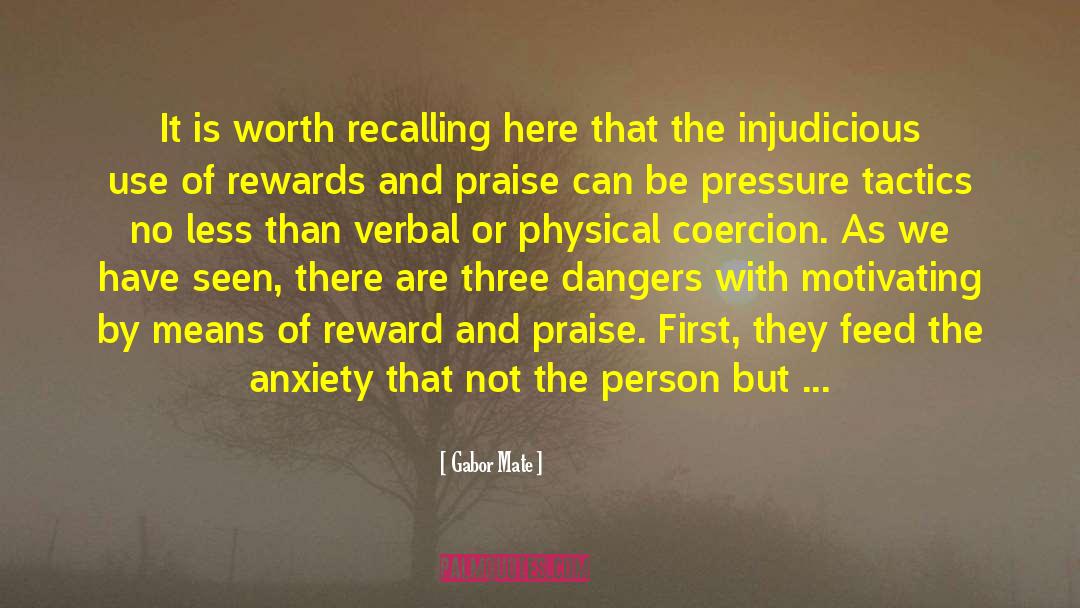
Even without world wars, revolutions and emigration, siblings growing up in the same home almost never share the same environment. More accurately, brothers and sisters share some environments - usually the less important ones - but they rarely share the one single environment that has the most powerful impact on personality formation. They may live in the same house, eat the same kinds of food, partake in many of the same activities. These are environments of secondary importance. Of all environments, the one that most profoundly shapes the human personality is the invisible one: the emotional atmosphere in which the child lives during the critical early years of brain development.
The invisible environment has little to do with parenting philosophies or parenting style. It is a matter of intangibles, foremost among them being the parents' relationship with each other and their emotional balance as individuals. These, too, can vary significantly from the birth of one child to the arrival of another. Psychological tension in the parents' lives during the child's infancy is, I am convinced, a major and universal influence on the subsequent emergence of ADD.
A hidden factor of great importance is a parent's unconscious attitude toward a child: what, or whom, on the deepest level, the child represents for the parents; the degree to which the parents see themselves in the child; the needs parents may have that they subliminally hope the child will meet.
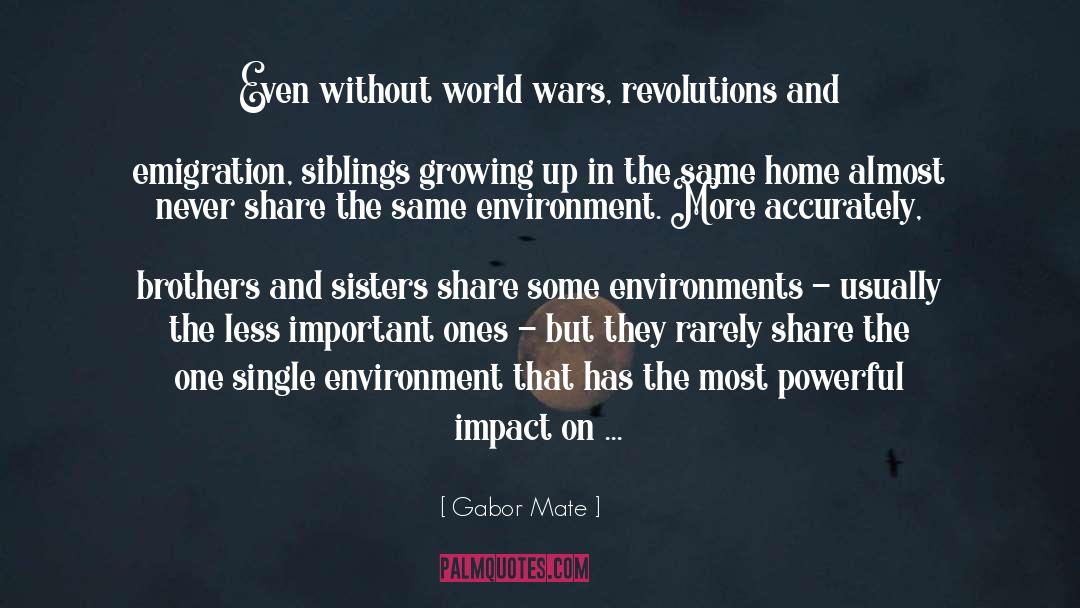
Settling for the view that illnesses, mental or physical, are primarily genetic allows us to avoid disturbing questions about the nature of the society in which we live. If "science" enables us to ignore poverty or man-made toxins or a frenetic and stressful social culture as contributors to disease, we can look only to simple answers: pharmacological and biological.
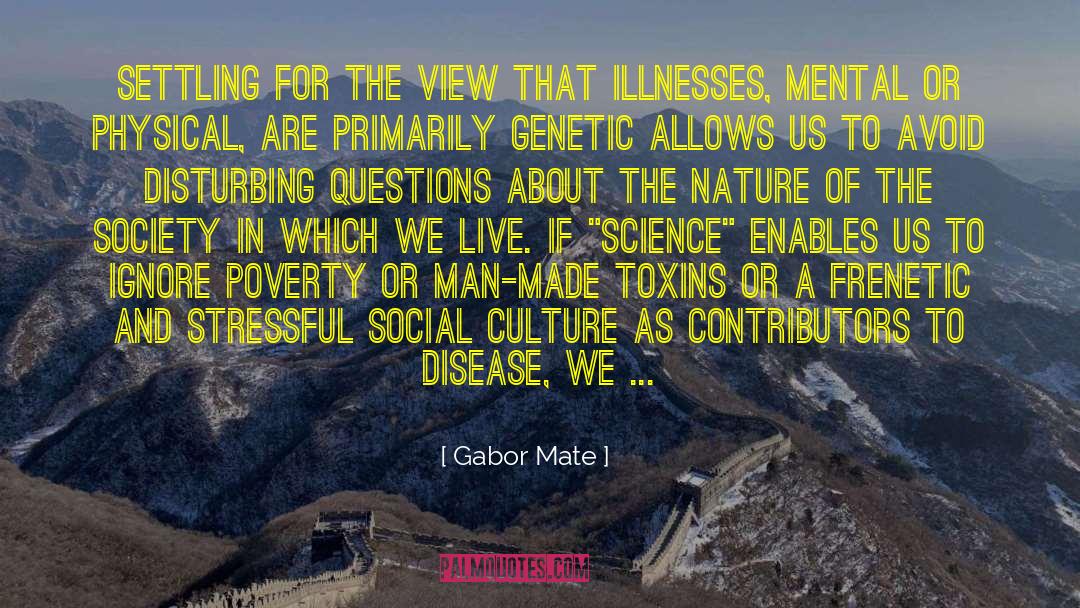
[A]ccept that the addiction exists not because of yourself, but in spite of yourself. You did not come into life asking to be programmed this way. It's not personal to you - millions of others with similar experiences have developed the same mechanisms. What is personal to you is how you respond to it in the present.
![Gabor Mate Quotes: [A]ccept that the addiction exists Gabor Mate Quotes: [A]ccept that the addiction exists](https://palmquotes.com/author/gabor-mate-quotes-534374.jpg)
If a mother has eight children, there are eight mothers. This is not simply because of the fact that the mother was different in her attributes to each of the eight. If she could have been the same with each... each child would have had his or her own mother seen through individual eyes.
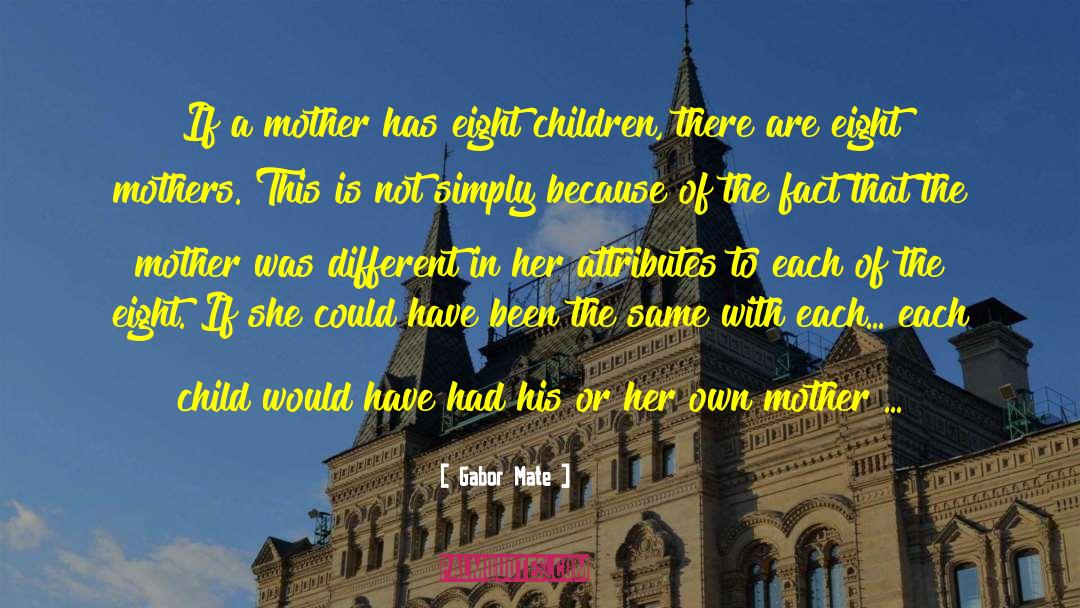
Physiological stress, then, is the link between personality traits and disease. Certain traits - otherwise known as coping styles - magnify the risk for illness by increasing the likelihood of chronic stress. Common to them all is a diminished capacity for emotional communication. Emotional experiences are translated into potentially damaging biological events when human beings are prevented from learning how to express their feelings effectively. That learning occurs - or fails to occur - during childhood. The way people grow up shapes their relationship with their own bodies and psyches. The emotional contexts of childhood interact with inborn temperament to give rise to personality traits. Much of what we call personality is not a fixed set of traits, only coping mechanisms a person acquired in childhood.
There is an important distinction between an inherent characteristic, rooted in an individual without regard to his environment, and a response to the environment, a pattern of behaviours developed to ensure survival. What we see as indelible traits may be no more than habitual defensive techniques, unconsciously adopted. People often identify with these habituated patterns, believing them to be an indispensable part of the self. They may even harbour self-loathing for certain traits - for example, when a person describes herself as "a control freak." In reality, there is no innate human inclination to be controlling. What there is in a "controlling"

The distressing internal state is not examined: the
focus is entirely on the outside: What can Ireceive from the world that
will make me feel okay, if only for a moment? Bare attention can show
her that these moods and feelings have only the meaning and power
that she gives them. Eventually she will realize that there is nothing to
run away from. Situations might need to be changed, but there is no
internal hell that one must escape by dulling or stimulating the mind.
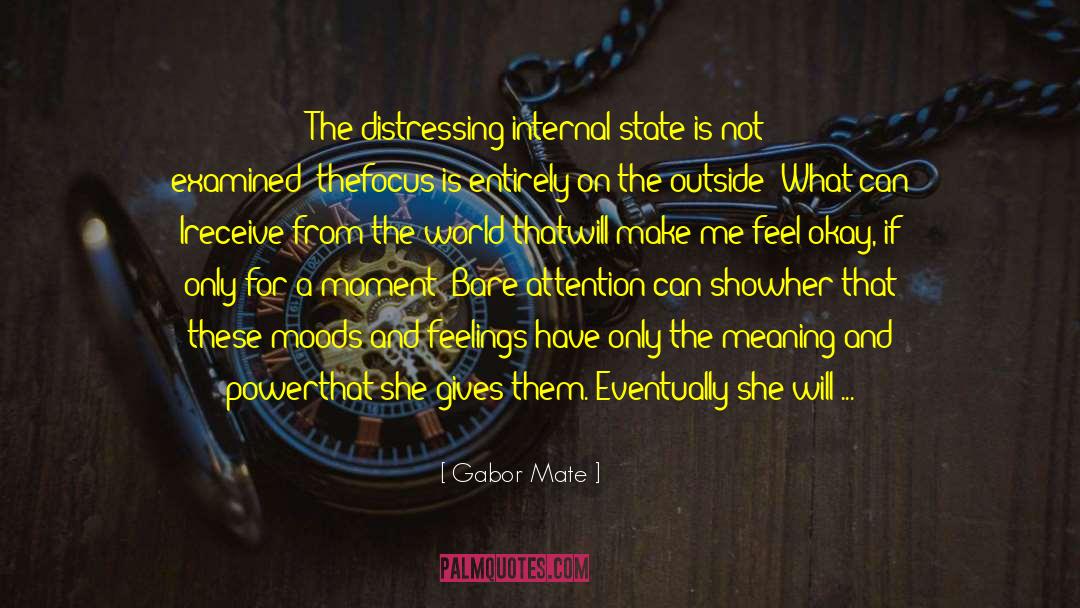
In the Nazi Arbeit [work] camps back in '44 when a man was caught smoking one cigarette, the whole barracks would die," a patient, Ralph, once told me. "For one cigarette! Yet even so, the men did not give up their inspiration, their will to live and to enjoy what they got out of life from certain substances, like liquor or tobacco or whatever the case may be." I don't know how accurate his account was as history, but as a chronicler of his own drug urges and those of his fellow Hastings Street addicts, Ralph spoke the bare truth: people jeopardize their lives for the sake of making the moment livable.
![Gabor Mate Quotes: In the Nazi Arbeit [work] Gabor Mate Quotes: In the Nazi Arbeit [work]](https://palmquotes.com/author/gabor-mate-quotes-432603.jpg)
As parents who make every effort we can to raise our children in loving security, we do not need to feel more guilt than we already do. We need less guilt and more awareness of how the quality of the parent-child relationship can be used to promote our children's emotional and cognitive development.
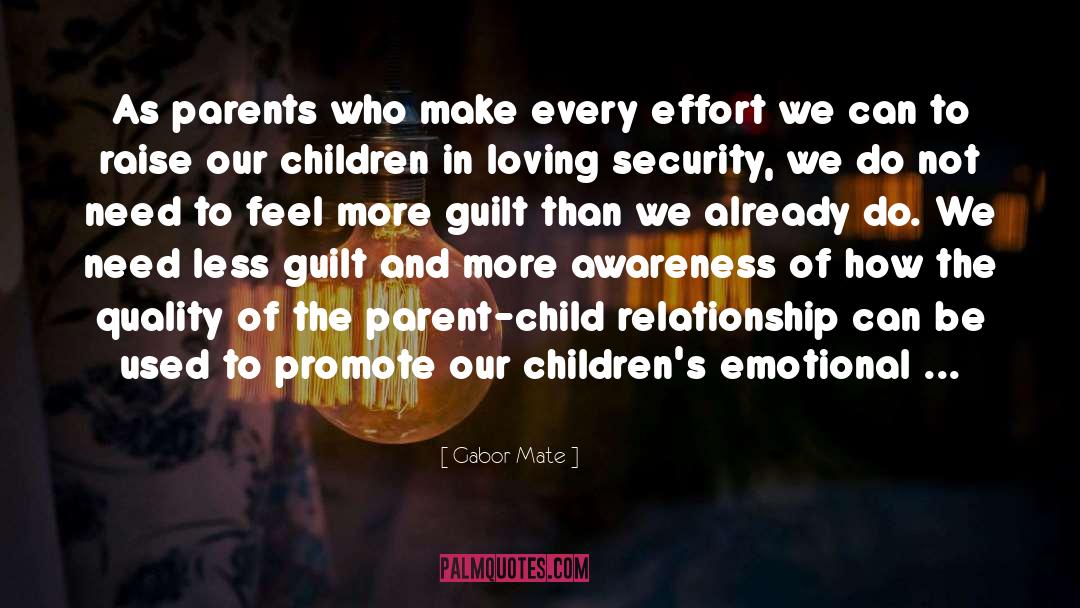
Narrow behaviourist thinking
permeates political and social policy and medical practice, the
childrearing advice dispensed by "parenting experts" and academic
discourse. We keep trying to change people's behaviours without a full
understanding of how and why those behaviours arise. "Inner causes
are not the proper domain of psychology," writes Roy Wise, an expert
on the psychology of addiction, and a prominent investigator in the
National Institute on Drug Abuse in the U.S.A.3 This statement seems
astonishing, coming from a psychologist. In reality, there can be no
understanding of human beings, let alone of addicted human beings,
without looking at "inner causes," tricky as those causes can be to pin
down at times. Behaviours, especially compulsive behaviours, are
often the active representations of emotional states and of special
kinds of brain functioning.
As we have seen, the dominant emotional states and the brain
patterns of human beings are shaped by their early environment.
Throughout their lifetimes, they are in dynamic interaction with various
social and emotional milieus. If we are to help addicts, we must strive
to change not them but their environments. These are the only things
we can change. Transformation of the addict must come from within
and the best we can do is to encourage it. Fortunately, there is much
that we can do.
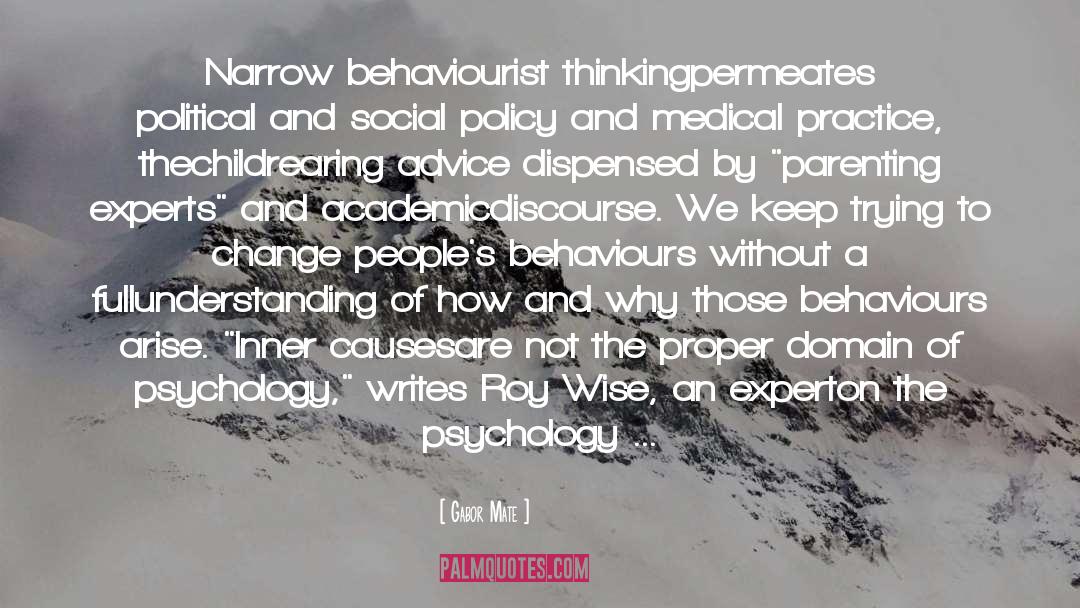
As children become increasingly less connected to adults, they rely more and more on each other; the whole natural order of things change. In the natural order of all mammalian cultures, animals or humans, the young stay under the wings of adults until they themselves reach adulthood. Immature creatures were never meant to bring one another to maturity. They were never meant to look to one another for primary nurturing, modelling, cue giving or mentoring. They are not equipped to give one another a sense of direction or values. As a result of today`s shift to this peer orientation, we are seeing the increasing immaturity, alienation, violence and precocious sexualization of North American Youth. The disruption of family life, rapid economic and social changes to human culture and relationships, and the erosion of stable communities are at the core of this shift.
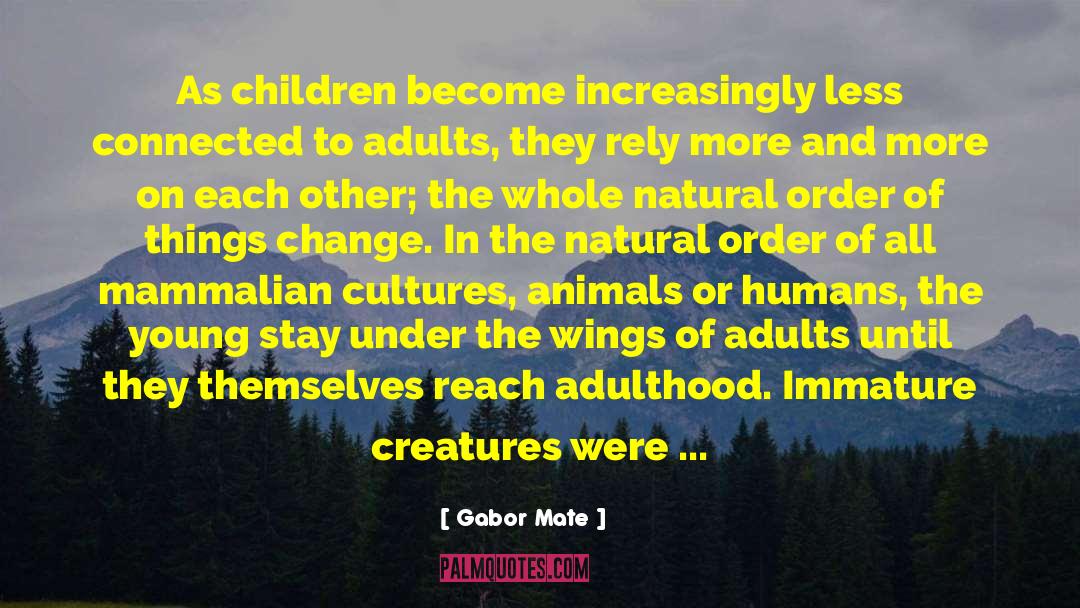
Medical thinking usually sees stress as highly disturbing but isolated events such as, for example, sudden unemployment, a marriage breakup, or the death of a loved one. These major events are potent sources of stress for many, but there are chronic daily stresses in people's lives that are more insidious and more harmful in their long-term biological consequences. Internally generated stresses take their toll without in any way seeming out of the ordinary.
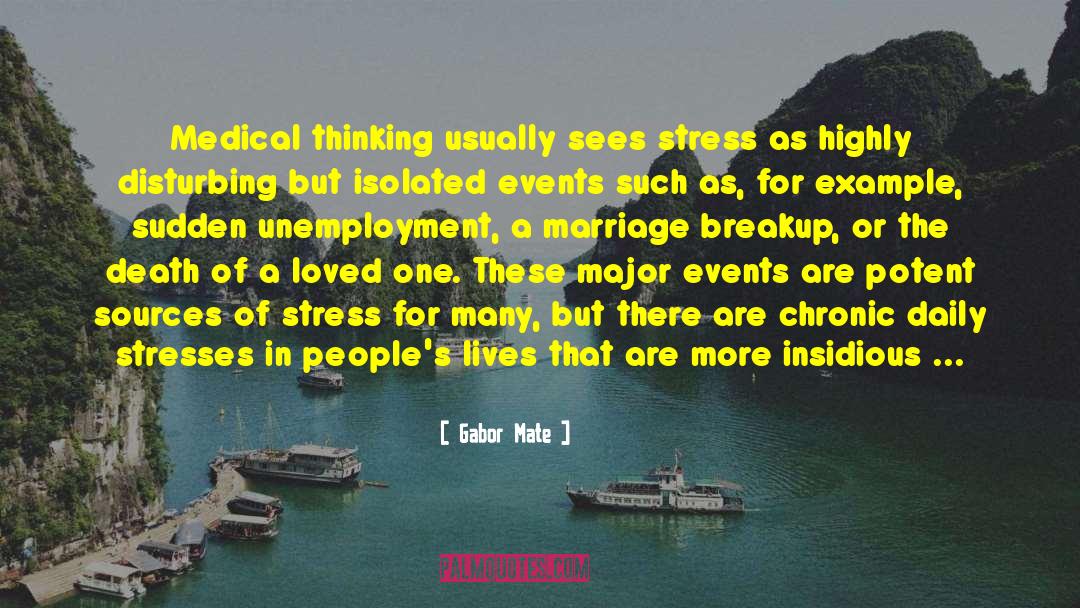
In the rare moments I permitted any stillness, I noted a small fluttering at the pit of my belly, a barely perceptible disturbance. The faint whisper of a word would sound in my head: writing. At first I could not say whether it was heartburn or inspiration. The more I listened, the louder the message became: I needed to write, to express myself through written language not only so that others might hear me but so that I could hear myself. The gods, we are taught, created humankind in their own image. Everyone has an urge to create. Its expression may flow through many channels: through writing, art, or music or through the inventiveness of work or in any number of ways unique to all of us, whether it be cooking, gardening, or the art of social discourse. The point is to honor the urge. To do so is healing for ourselves and for others; not to do so deadens our bodies and our spirits. When I did not write, I suffocated in silence.
